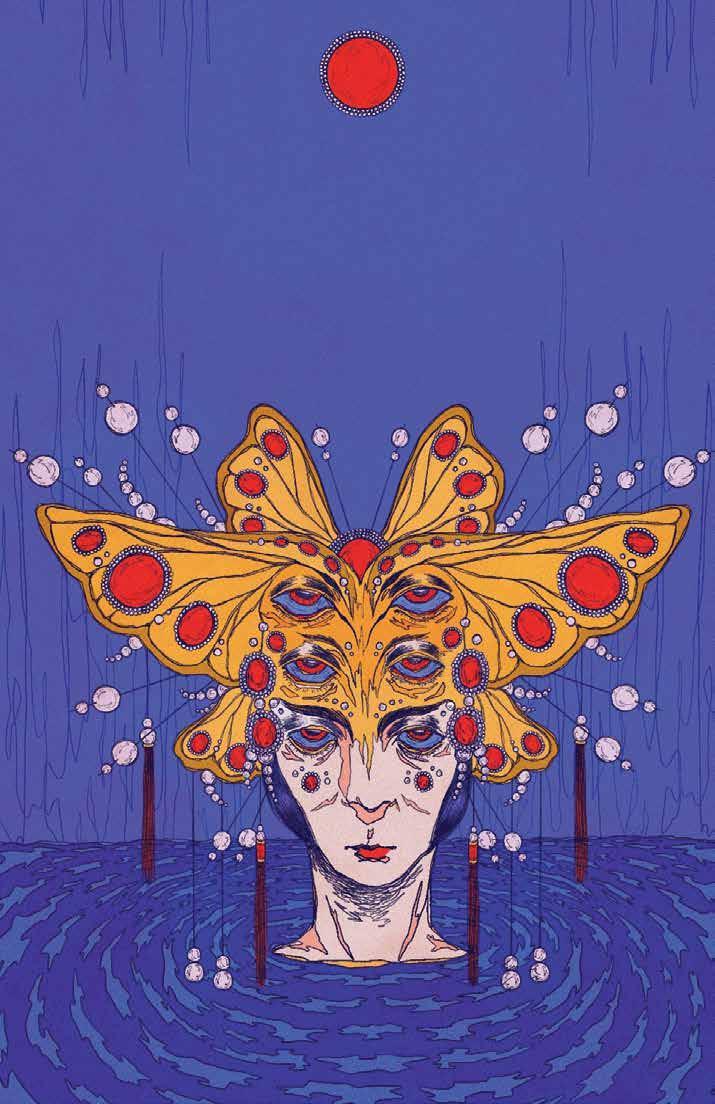RETROSPECT
AN ARTS AND LITERARY JOURNAL OF THE OSBORNE WRITING CENTER





















As this year’s graduating class, we have reached the point in our lives when it feels necessary to look up in search of a guiding star, and look forward to what's to come. When experiencing change, it is common to search for a direction, but oftentimes this guidance lives within us.
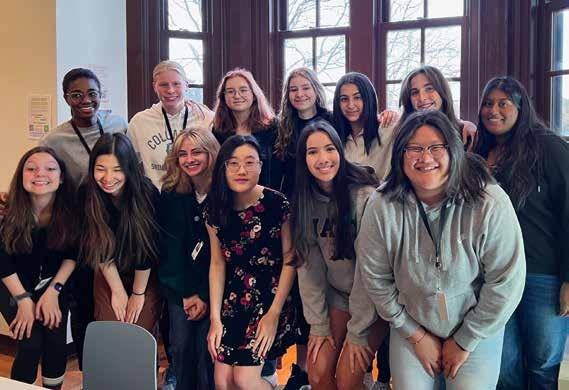
We have taken delight in welcoming the Prime into Upper School spaces and finding ourselves reflected in these young students. For them, every day is an adventure, and they have something to teach us. As they set sail to find their voices, we offer this collection of art and writing – pieces of our own journeys – as a “guiding” map to any and all destinations that our readers might seek out.
While we celebrate and commemorate our own adventures to come, it is important to remember our experiences in the past and look at our lives in retrospect. As life at HB has changed over the past 10 years, the Retrospect magazine has changed with it, embarking on its own journey of sorts. The word retrospect, meaning “a survey or review of a past course of events or period of time,” is the perfect way to describe reminiscing on the past while looking towards the future, which is exactly what this magazine hopes to do.
Serving as both an archive of prior student work and publication of newer pieces, Retrospect is a way to document HB student history, encompassing our thoughts and individual feelings throughout the journey that is high school. When we began the compilation process for Retrospect this year, the idea of journey came to mind, as we seniors began to think about our own experiences at HB through the years. From a freshman year cut short to a junior year fully back on campus, there have certainly been many unexpected rollercoasters throughout our time in the Upper School, but the same can be said for everyone too. You begin your journey as a freshman unsure of what the future holds, maybe you’ve been at HB for a while or maybe you are a new student. Then, suddenly, you blink and you’re in the second semester of your senior year, reminiscing on Legacy Days past and nerve-wracking midterms seasons. This edition of Retrospect aims to highlight the journeys we all experience throughout life, and the process of discovering a Guiding Star that can lead you to a point where you can tell your Recounted Story
We hope you take a moment to explore this year’s edition, your journey awaits!
Top row (left to right): MUNA AGWA, MEREDITH STEWART, SOFIA DEWEY, NOEL ULLOM, SAHAR MALEKI, EMILY JONES, EESHA TALASILA Bottom row (left to right): ZOË NELSON, CHRISTINA BENCIN, VIVIENNE FORSTNER, EMILY WILSON, LUCY CASTELLANOS, CAROLYN JIANG21 Clouded Consciousness by Carmella Muresan ’23
21 Nada Más by Noel Ullom ’23
21 Never Meant to End In Pieces by Christina Bencin ’23
22 Gatsby’s Lifeless Rainbow by Summer Mu ’24
23 Blink by Ava Piliang ’23
Saija Shah ‘23
09
From by Vivian Qi ’26 10
Snowflake by Elham Abdel Jalil ’25 10 Stars Above by Ally Hudson ’25 10 The Moon by Ally Hudson ’25
11 The Supernovae and the Nebula Death and Rebirth by Jalecia Reid ’26
11 Phases of the Moon by Carmella Muresan ’23
12 Devotion by Ava Beredo ’23
12 Sterile Love by Cole Urban ’24

12 Planet Passenger by Sophy Gao ’23
13
Re: Vindication of July, August by Sofia Dewey ’23
13 4th of July on the Lake by Rori Kostos ’23
13
Bleeding Suns by Carmella Muresan ’23
14 The Inner Mind of Blanche Glover by Hannah Rowland-Seymour ’23
15
Reflection by Meredith Hays ’24
15 Fatigue and Flowers by Kate Hilbert ’25
16 Don’t Tell Me What To Do by Alexa Christopherson ’23
16 Barn Night by Sophia Tully ’25
17
17
17
Morning Trees by Olivia Nordstrom ’23
Starry Night by Chloe Echols ’23
Ode to My Parking Spot by Colleen Nakhooda ’24
17 Butterfleye by Natalie Crowley ’23
18 At a Crossroads by Ella Rosenberg ’24
18
Imagine If This Was All Real by Areesha Nouman ’26
19 Love Letter from the East Side by Muna Agwa ’23
19 They Hold Hands Within the Storm by Vivian Qi ’26
19 Candlelight by Meredith Hays ’24
20 Musings of a Fallen Angel by Percy Milligan ’26
20 How Do We Begin The End by Kate Hilbert ’25
20 Cherry Picking by Catherine Saltz ’23
24. Poem for a City Dweller by Olivia Mian ’23

24. Elena Orange by Carolyn Jiang ’23
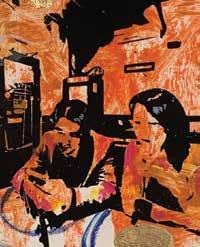
25 Moon by Meredith Hays ’24
25 The City Shined With Their Hope by Salma Fareed ’26
25 HB Sunrise by Fatema Dinary ’24
26 Creative Project on A.S. Byatt’s Possession by Olivia Mian ’23
28 Ghost of Freedom by Faith Benton ’25
29 Happy Accidents by Alexa Christopherson ’23
29 Seeing Green by Olivia MacPhail ’23
29 Cycles by Jasmin Sanders-Triplett ’26
30 Data by Jasmine Neumann ’25
30 vi by Gabriella Quintana ’23
30 Lady Justice by Michelle Anabila ’26
30 Fire and Light by Morgan Butler ’23
31 Sleeping Bear Dunes by Rori Kostos ’23
32 Daydreaming by Natalie Crowley ’23
32 A Look into Self by Alexis Everett ’24
32 Lady Cleopatra by Jasmine Neumann ’25
33 Self Portrait by Cole Urban ’24
33 In Case You Haven’t Witnessed This by Noel Ullom ’23
33 She smiles, and is an actress by Sofia Tully ’25
34 The Thought of You by Elham Abdel Jalil ’25
34 Sestra Sestra by Ida Rausche ’23
35 Extraterrestrial Offerings by Muna Agwa ’23
35 Spherical Twins by Ella Rosenberg ’24
36 The Two Mes by Lizzie Kasubick ’23
36 Haven of Restful Nights by Ava Beredo ’23
37 Bleeding Orange by Lizzie Kasubick ’23
37 Pink Gel Pens by Sofia Dewey ’23
38 Delight in Nature by Fatema Dinary ’24
38 May We Never Lose Our Magic by Muna Agwa ’23
39 Sugar by Alexa Christopherson ’23
39 Sour Desire by Alexis Everett ’24
40 A Closer Perspective by Alexis Everett ’24
40 Glimmer by Alexis Everett ’24
41 Admiration by Carmella Muresan ’23
41 Perdu en Haine by Archer Gandhi ’24
42 The Sound of Silent Confession: Examining the Role of Music in Giving Voice to Emotion in Pride and Prejudice by Noel Ullom ’23

43 Connection to Flow by Alexis Everett ’23
44 Diving In by Ava Piliang ’23
44 Taking Her Breath Away by Ava Piliang ’23
44 Lone Fisherman by Liza Weinberger ’24
45 Deep End by Grace Dai ’24
45 Confessions of a Lover by Olivia Mian ’23
46 Pas de Deux by Olivia Mian ’23
46 Happiness Comes in Waves. Be Wavy. by Nina Peyrat ’26
46 Seeing Triple by Morgan Butler ’23
47 Just a Short List of All the Things I Love About Her by Vivian Qi ’26
48 L’oiseau et la Montagne by Charlotte Lu ’25
50 Letter of Recommendation by Alexis Everett ’24
50 Show Me How Good It Gets by Sophia Tully ’25
51 Self-Reflection by Alexis Everett ’24
51 Overlooked by Olivia MacPhail ’23

52 The Difference in The Way Society Perceives Age for Men and Women by Zoë Kane ’26

53 Stay Awake by Ava Beredo ’23
54 International Humanitarian Law by Shrividya Regadamilli ’26
55 505 by Mishael Williams ’25
55 His and Hers by Jalecia Reid ’26
55 5:00 A.M. by Liza Weinberger ’24
56 A King Gets Murdered Over a Sandwich, and What Happens After by Charlotte Lu ‘25
58 A Letter to My Dead Friend by Sofia Dewey ’23
58 In Shambles, In Pieces, I Persist by Fiona Liu ’24
59 Teardrop by Elham Abdel Jalil ’25
59 A Reservation From the Wrong Universe by Sophy Gao ’23
59 Drowning in Pressure by Olivia MacPhail ’23
60 A Man of Sin by Khadija Coats ’25
60 Candida I by Sofia Dewey ’23
60 Candida II by Sofia Dewey ’23
61 Broken Hive by Zoe Bennett ’23
62 Empty Mind by Paige Ryan ’24
63 Dissociation by Carmella Muresan ’23
63 Blood Orange by Cole Urban ’24
63 Strung Together by Sam Tekieli ’23
64 Lord Ganeesha: Remover of Obstacles by Arya Babu ’25
64 Solaris by Archer Gandhi ’24
65 Burnout by Ananya Yadati ’26
65 Reflection by Sydney Steffee ’24
65 Grieving by Olivia MacPhail ’23
65 It Was a Chance to Explore. by Ally Hudson ’25
66 Happy Birthday to Me by Alexa Christopherson ’23
66 The winter comforted her with memories. by Khadija Coats ’25
67 Lost Sadness by Alexis Everett ’24
67 Silly Me by Michelle Anabila ’26
67 Spontaneity by Gabriella Quintana ’23
68 Miranda’s Journey: From Captivity to Freedom by Arya Babu ’25
68 Shack by Lauren Hudson ’25
69 Shadows of Serenity by Ella Rosenberg ’24
69 Perception is Key by Abby Muresan ’25
69 The Person in the Mirror by Nora Nathan ’26
70 Outside Noise by Alexis Everett ’24
71 New York Film by Ally Hudson ’25
71 Woman in Red by Sam Tekieli ’23
71 Holding On by Sydney Steffee ’24
72 Shattered Mirror by Zoe Bennett ’23
72 Red Vines by Sofia Dewey ’23
72 Speak Now. Think About It Later by Jane Hartford ’24
73 Out of Sight, Out of Mind by Allie Beros ’24
73 The Mirror Lies by Lauren Voinovich ’23
73 Wounds Ready to Reopen for You by Percy Milligan ’26
74 That Stupid Clock by Izzy Botos ’23
74 Toasted Narcissism by Lauren Voinovich ’23
74 The Clock Breaks and Time Stops by L Firstenberg ’26
75 We Don’t Know Each Other. Not Anymore. by Kate Hilbert ’25
75 Between the Towers by Ellie Tochtrop ’26
76 Ophelia Soliloquy by Katie von Zedlitz ’23
76 Yawn by Ava Beredo ’23
76 Khadija by Ida Rausche ’23
77 Golden Fractures by Zoe Bennett ’23
77 Lost in Feeling by Alexis Everett ’24
77 The Rising Sun by Zoe Bennett ’23
78 Panopticon by Clover Skinner ’24
78 The Unexplored Ocean by Liza Weinberger ’24
78 Fae by Allie Beros ’24
79 The American Bison by Carmella Muresan ’23
80 On My Voice by Muna Agwa ’23
80 Untitled by Sydney Steffee ’24
81 Collage by Alexa Christopherson ’23
81 Flames. Smoking, Spreading, Glowing, Burning, Out. by Abby Muresan ’25
82 Being Pretty is Not Your Job by Ellie Tochtrop ’26
82 Voyage Above the Arboreal Realm by Ava Beredo ’23
82 Leaf Sprinkles by Caroline Marsh ’25
83 Parallel Universe by Abby Muresan ’25
83 Eulogy to Self by Hannah Rowland-Seymour ’23
84 She dreamt, then woke, then did. by Khadija Coats ’25
84 On Poetry by Muna Agwa ’23
84 Veins by Ella Rosenberg ’24
85 Cherry Pink by Fatema Dinary ’24
86 Rose Prick by Catherine Saltz ’23
86 Good, It Was Fun by Colleen Nakhooda ’24
87 Generations by Eva Panza ’25
87 Poké and Coffee by Colleen Nakhooda ’24
87 Strings of Nature by Ella Rosenberg ’24
88 Breaking Boundaries That Don’t Define Her by Shrividya Regadamilli ’26
88 State of Being by Emma Wilson ’23
88 She (Woman) I by Sofia Dewey ’23
88 She (Woman) II by Sofia Dewey ’23
89 (The Curse of) The Gifted Program by Elham Adbel Jalil ’25
90 Botanical Gardens by Natalie Crowley ’23
90 Yesterday Blossoming by Noel Ullom ’23
91 Purple Majesties by Liza Weinberger ’24
91 Now was his chance for glory by Mishael Williams ’25
by Elham
96 The Death of a Child by Zoë Nelson ’23
96 Feet by Jalecia Reid ’26
96 In the End, She Ran Away by Ananya Yadati ’26
97 The Art of Subtle Expression by Ava Beredo ’23
98 Thinking of My Mother by Muna Agwa ’23
98 Shirley by Natalie Crowley ’23
98 Iris’s World by Ava Beredo ’23
99 Bare Me by Ida Rausche ’23
100 Mixing Memories Into Every Batch: Why You Should Make Food From Scratch by Liza Weinberger ’24
101 It’s Good, Just Eat the Brownie by Seema Casey ’23
101 Vase and Peach by Lauren Hudson ’25
102 Power Play by Marin Mondora ’24
102 Getting Unready by Catherine Saltz ’23
102 Slippery Slope. Bang. Crash. Darkness. Black. by Liza Weinberger ’24
103 Alexithymia by Carmella Muresan ’23
103 200 Word Story by Summer Mu ’24
104 Dinner Dates, Broods, and Blood by Sofia Dewey ’23
104 Above the Skyline by Sam Tekieli ’23
105 What if I Fall? What Then? by Archer Gandhi ’24
106 Cats? by Grace Dai ’24
106 Conspiracy by Clover Skinner ’24
106 Honey, I’m Home by Natalie Crowley ’23
107 Red and Blue and Grey by Olivia Mian ’23
108 There’s No Dream without Sacrifice by Alexis Everett ’24
110 Non Believer, Yet She Still Flinches by Colleen Nakhooda ’24
110 Kate Moss by Claire Hudson ’25
110 Portrait in Oil Pastel by Nina Hudson ’25
111 Times Square Collision by Saija Shah ’23
112 Jeopardy is the Best Show. Here is Why by Sofia Vogel ’24
113 Peace by Julia Bilger '26, Julianna Stahl '26, and Marianna Steele '23
113 Bask by Natalie Crowley ’23
114 The Way We Were by Celia Bentrott ’25
116 Who Are You When No One Is Watching by Alexa Christopherson ’23
116 Water Wings by Natalie Crowley ’23
116 Ace of Koi by Michelle Anabila ’26
117 Why Not Pick up a Book by Grace Gilson ’24
118 Home at Last by Blake Cody ’25
119 My Dream by Nora Nathan ’26
119 Piece by Piece by Ella Rosenberg ’24
120 The Rythym of Self by Ava Beredo ’23
120 Self Portrait without Ballerina by Olivia Mian ’23
121 All That I Am by Chloe Echols ’23
122 Why You Should Study Latin: A More Comprehensive Argument by Grace Gilson ’24
123 The Twin Mushrooms by Cole Urban ’24
124 When a Sun Ray Falls by Abby Muresan ’25
125 Windansea by Catherine Saltz ’23
125 The Seasons of Us by Sarah Cai '25, Amy Li '23, and Lee McBride '23
126 COMPOSURE by Sophy Gao ’23
126 Admiring the stars, content with loneliness by Vivian Qi ’26
126 The Stars Never Shined That Bright by Archer Gandhi ’24
127 4PM by Sofia Dewey ’23
127 Strong Vision by Ella Rosenberg ’24
128 Progress and Prosperity for All by Hannah Weinberger ’25
129 Celebration by Saija Shah ’23
130 For Your Eyes Only by Ida Rausche ’23
130 I Feel Myself Forgetting Your Smile by Sophie Weber ’25
130 Essentials for Life by Ella Rosenberg ’24
131 Eclipse by Jasmine Neumann ’25
The Osborne Writing Center and its programming is supported by The William McKinley and Jessie M. Osborne Writing Center Fund, The Horvitz/Rosenthal Family Fund for the Young Writers and Artists Festival, The Grace Wood Bregenzer 1927 Memorial Fund, The Peyrat Family Fund for the Young Writers and Artists Festival, and the Hathaway Brown School Colloquium Fund. These endowments support an atmosphere at HB in which student writing can originate and evolve. The entire school community is indebted to and grateful for the outstanding programming that has been launched as a result of this generous philanthropy, including the publication of this annual arts and literary journal.
Since its launch in 2014, Retrospect has been recognized for excellence in the annual Program to Recognize Excellence in Student Literary Magazines, including being the only school in Ohio to receive the Highest Award in 2016. We are thankful to AGC for bringing our vision to life. In addition to other national and regional awards in 2022 - 23, Hathaway Brown student writers won 94 regional Scholastic Writing Awards, and one student received a national medal for her work.

Ask me what my favorite flower is and I will give one answer: white jasmines. White jasmines transport me to one place: home. Home, better known as Syria or as I like to put it, the motherland. In fact, the white jasmine flower is the national flower of Syria. So no, Syria is not just a war ground, it is home, and it is delicate.
During my early childhood, I would spend my summers in Damascus with my family. At the time, both sides of my family lived there, but we would stay with my mom’s family in her childhood home. My mom’s childhood home was a large four-bedroom apartment. I slept in the same bedroom as my aunt, and she would take whoever woke up first to the mini-market on the same street as the apartment. The mini-market sold my and my sister’s favorite treat: Fulla milk and sour candy. Fulla milk is flavored milk with the Middle-Eastern Barbie, Fulla, on the packaging. I would get to choose a flavor for me and my sister alongside my aunt. Every time, my aunt would get in trouble for letting us have a treat before breakfast. I do not remember much about breakfast, only that we would eat on the balcony, and I would eat apricot jam. The balcony was covered in plants; my grandmother, Tata Mona, has a green thumb. There were so many types of plants, but one has the most fragrance: the white jasmine. Honestly, as soon as you step off the plane in Syria, you could smell the jasmine. They were everywhere, whether you could see the actual plant or just smell the scent: jasmines, jasmines, jasmines.

We stopped visiting Syria when I was five. At the age of five, this was taken from me; war broke me from my home. Yet the jasmine persists, and every so often I meet someone wearing jasmine perfume, and I am back standing before the mini-market hand in hand with my aunt. Or I am waiting for Tata Mona to make me an apricot jam sandwich. I am on top of my uncle’s shoulders feeling like the tallest person alive. I am on my grandpa’s farm in the woods playing with him. Every so often, jasmines bring me home.
My mom has tried for years to keep a white jasmine plant alive, but unlike Tata Mona, she does not have a way with plants. On top of that, jasmines have a hard time surviving in the Ohio climate. My parents have lived in Ohio for almost twenty-two years and I have lived here my whole life, but the jasmine plant roots us back to Syria. Our home, no matter how long we spend anywhere else, will always and forever be Damascus. For the last two years, we have had a jasmine plant in front of the door to the backyard and during the blooming time in September, the kitchen smells like home. At school, in the primary school garden, there is an archway that is covered in jasmines. I discovered it just last year during photography class. I was so happy to find a piece of home at school. Now, during its bloom time, I sit on the turf and do my work just so I can smell a piece of home. Homesickness lodges itself in my being, in the jasmine flower, in my roots, and in the bittersweetness of home from afar.
So, find a white jasmine plant and just inhale. Inhale and it will take you somewhere. That place might not be my home or even your home, but I can assure you that you will be transported. That is just the effect of the white jasmine. Find something or anything that will take you somewhere, it does not have to be home. The jasmine is home which is love and not war.
MASSA ARMANAZI ’24

I am from huge, sprawling roads, from clear blue skies and the hot air. I am from the pine trees whose branches let me climb high and made me feel like I was soaring as wind blew in my face I am from dandelions flying in the air and two birds singing and soaking their feathers in the sun I am from cloudy days, snowy days, and rainy days that could still do nothing to the merry mood below, could do nothing except disappear back into the sky with a frown, but maybe a smile
I am from beaten up animal toys and lots of broken cars From the land of bruised knees as I ran too fast and far I am from the creeks and forest, splashing the water into the sky, catching the glowing diamonds in our cupped hands and acting like it was treasure that was all ours I am from the bike rides down the bumpy roads, which tossed my hair in the wind and lived on laughter like air
I am from the rides in the sky, staring wondrously out the window searching for rainbows, but instead finding cotton-candy shaped as animals, and thinking what it would be like to sleep on one I am from the tight, warm hugs of being reunited with family across the sea, the difficult-to-breathe, smoky air of the crowded parking lot I am from the beautiful car rides that bring us back to everything we’ve missed to the towering buildings and red palaces I am from the candied-fruit and sledding across the ice to driving boats on the rippling lake, staring at the majestic herons I am from the moments –allowed to bloom into a flower –breathing the wind and drinking the sun on the family tree


six points one center it dances in the air small and delicate easily broken yet rarely hated tiny and insignificant on its own yet strong and powerful when it joins the others boring and basic from afar yet complicated and beautiful up-close useless and ignored until it causes a day off or a gorgeous wonderland only good for instagram photos until the cocoa comes into mind or the fireplace turns on flat and even until playful children make angels or lovers write messages plain and simple until it is truly seen

I was a child of the night but longed for the warmth of the sun before I even knew what it was. But I was far too much like Icarus and I burned. Just like they said I would.
This is the story of how I burned.
When I was born the stars danced and they said “A child has been given to us, what shall we do?” See, I was meant to shine brighter than the sun itself.
The gods built me with love and sealed me off with a kiss of bravery. We were children. The Gods called us prostars; stars but not quite yet. I was told that my job was only to shine and oh how nice did it sound. I was special; unique. I wanted to grow big and strong, just like the Sun.
Oh, all the beautiful names I had picked out! Andromeda, Anastasia, Alexandra, Berenice. I felt special. I was special.
Humans. I was supposed to love the mortals but I despised them and they continued to worship me blindly. All they did was take and take even more. There was so much animosity between them. Why did the gods create me just to shine over them?
Soon enough I was Andromeda, ruler of man. Mankind shouted “Andromeda! She’s come to bless us!” “Blessed be the one Andromeda shines upon!” I hated it.
I was just an object to them. Nothing more. The mortals had what I wanted. Freedom. I searched and searched but I found nothing to end my suffering. Until one day I did. Horkos the god of oaths and promises said he could help me as long as I kept my end of the deal; give up my heart and never fall in love. It sounded so sweet, just like honey but I would soon learn that it was as poisonous as a viper’s bite.
Becoming human was my first and last mistake.
When I came down to Earth I was a beauty. The humans stopped and stared, some whispered. I didn’t mind because I finally had what I so desperately craved and something that I never knew I needed. Freedom and company. I quickly found out that humans were very strange. Although they worshiped the stars they ruled over themselves. It sounded liberating They never had just one job, they were constantly changing. It was absolutely fascinating. My home in the sky was no longer part of me. I was human.
As time passed I did something I never thought I would do. I fell in love Although I was once a star he felt like the Sun , burning everything in his path. Dolion was his name. Mortals tell their offspring to not get too close to the fire. In this case Dolion was the fire and I was a disobedient child. I fell weak to his charms and missed the important signs. That mistake cost me dearly.
Dolion made so many promises and I believed every single one of them. He failed to keep all of his promises but he was able to do one thing: live up to his name. Dolion, a deceitful and treacherous man. When I was a star all I did was give more and more. It seemed like that trait never left me even when I became human. Dolion liked to take and take. We made quite the pair. He sucked every bit of life and joy I had and soon enough I was nothing but a shallow cast of the star human I once was
I had forgotten about the promise I made to Horkos. He was furious that I couldn’t keep my end of the deal. To punish me he turned me back into the star and had the rest of the gods decide what my future would be.
I was banished from Heaven and Earth and trapped in Tartarus. Maybe in another life the mortals would call me Andromeda The Galaxy.
As I took my last breaths and my lights flickered I realized that I was just greedy. I had become blinded by envy and forgot to look around at the joys I had as a star. What a cruel thing it is to be a star.

This isn’t a story of unspoken words of “I love you's never returned" of living in fear of words that sit in you, crushing deep into your lungs, your chest, like a cat drawn to sit in the warmth of the sun And yet, there is no warmth. although those words have been said, stuck in the air and sterile, like a fly, wings trapped and twisted on paper, it’s nothing but transactional an experiment, a test, a trial where i’m pinned by my feathers and talons to a board a tiny, unholy crucifix on a hill in the Valley of Judgement These are empty promises spoken yet still broken lifeless shards of porcelain memories, with nothing but dust and time to hold them together


Last summer I ate blackberries and gouda on the beach with a boy who had never seen me cry.
I pretend I know how to play chess, and I like Shostakovich and Prokofiev mostly for their best-known pieces, and for that I am the fake kind of pretentious.
When I am blind, tossed about in the waves that answer to none and are tended by no one, I understand that in the months before it all went to hell, I would have (I would) swallow mouthful after mouthful of salt to preserve the drunken joy that seemed to drip off my shoulders and into my chest.
I understand! I do! I do! I do!
If I had known (if if if), I would have wrapped my own wrists in bronze and sunk to the bottom of an inky ocean if it meant I could have saved everyone (everyone).
Last night I dreamt that I had a small orange kitten and I loved him until I woke up.
My mother said that our orange cat (buried in our backwoods) visited me. The man who dug his grave was 84, and had known and loved him for 21 years.
I hope he knows that he is missed.
One year ago I could identify every constellation without looking at a map. I used to walk outside, barefoot, in snow and mud and grass, and point them out to myself. I hoped that when I inevitably became lost and gone, the stars would remember the top of my head and the bridge of my nose, and guide me home.

A year and a half ago I was only sixteen and my bangs had not grown out yet.
Feminine mystique; confusing politeness with care, and care with love, and coworkers with mothers. I knit them all hats anyways.
This summer I cried a lot. And went to Ashtabula. And the beach. And Michigan. And to work.
I crave redemption of my grief.
I crave ice rinks and rogers road and I wear a bracelet every day to remind myself that I am, in fact, in the after.
And
I am in the after but I drink chai tea lattes and crochet and I am going to France and Poland this summer and I love my sister and my friends.
I like cheddar more than gouda and pomegranates over blackberries.
Coping, I think they call it.
Blanche gazed at the poem in her hands, full of contempt and disdain. Christabel was her first love, her light in her life. She was the grounding stone to this plane of existence, the missing piece of her heart. This utter betrayal of her past, of her heart. It devastated her and left her lost to no end.
Blanche tried to piece together what went through Christabel’s mind. Why had Christabel done this? Why did she leave her like this? Was she Icarus, feeling the effects of her momentary freedom and joy? Did she push the limits too far, and now is experiencing the consequences? She thought back through all she knew, sifting through her memories like sand flowing on an endless beach, moving back and forth on the waves. Christabel had been writing letters, to a Mr. R.H. Ash. Blanche knew they were enamored with each other, but she did not know the extent. She saw the letters, full of intellectual banter and profound conversations. She tried to stop it, keep Christabel as her own, but she could not. She knew R.H. Ash and Christabel were together these past months, she did not know where, but she was sure. Christabel thought her inept.
As the heavy gray clouds slowly began filtering out the light from the sun, Blanche lit a candle on her desk. The thundering started soon after, along with a torrential downpour of rain. Blanche sighed, rolled up the sleeves of her paint smock, and pulled her ink from the drawer of her desk. She took out her paper, an envelope, and methodically began straightening up the desk in preparation, as she needed an immaculate workspace to arrange her thoughts. After she decided she had put it off for far too long, Blanche began drafting her letter to Christabel, her final letter to her love, her message of all the things left unsaid.
She began:
My Love
My Dearest Christabel
Blanche put her pen down, sighing in resentment. Christabel was the author in their relationship, she could make her pen flow on a mere whim, and she could always write her heart’s desire whenever she wanted. For Blanche, writing came less easily — full of writing and rewriting, and every word thought out before it could be committed to ink and paper. This letter was arguably the most important in her life, full of all her thoughts and feelings. It had to be planned and intentional.
My Dearest Christabel,
By the time you read this, I will be gone. By no fault of yours, I am done with this plane of existence. The fault lies solely with me, as I have not made myself adequately useful in this world. I live a sad life, alone and in never-ending pain. You were the one light in this sea of darkness. I have no place here, not with you, not with anyone. You have moved on from me, so I do not see a reason for being
anymore. I know that I think that you will miss me, but I release you. You can leave your entrapment, leave this exile of hidden words, touches in the night, secrets that can never be spoken aloud. The exhaustion you must feel, having to cope with me.
My life has been for naught, as I have not even made a name for myself. I am useless, helpless, inadequate.
Perhaps you deserve to see my suffering. I retract my earlier statement; the fault of my death lies in your hands. You have left when I needed you the most, off to gallivant with your new love. Do you love him? What do you see in him? What could he give you that I could not? And you think me naïve and dense, that I have not noticed this blooming love, this romance which you refuse to call by name. I thought we were forever. You, me, and Dog Tray, growing old and gray together. But it shall not be that way — instead you are missing, Dog Tray went missing, and I am dead. My heart is empty, my mind is dull and gray, and soon I shall be that way forever.
Blanche paused to reflect upon what she was saying — did she want to write this to Christabel? She wanted to slip away, unseen, as she felt was fitting. She would take inspiration from the greats, drown herself, so it is quick and unknowing. This letter was the opposite, a prodigious splash rather than a drop. But she wanted Christabel to feel as she did, she wanted Christabel to have all the pain and suffering and struggles she had been forced to endure over the past months. As she sat, she mourned all she would miss, she truly realized what came next. In the dark room, where the only decoration hung Christabel’s paintings, Blanche knew her journey had come to an end. She truly loved Christabel, and wanted her to be happy, so she had to let her go. She glanced once more at Christabel’s poem for encouragement, and wrote the final segment to her letter:
I do not know how to stop loving you, nor do I wish to. You have been mine since the beginning, and I thought I was yours as well. However, it seems as if I am not; you have found another, and I have been left behind. Therefore, I shall not weigh you down any longer. Be free, my gentle bumblebee.
Forever yours, In your heart, Most sincerely, Blanche
When she finished, she tore up the poem from Christabel, releasing the memories she had entrapped in the writing. The pieces sat in the corner of her desk, in the dark and lonely room. Blanche tucked the letter away and began to arrange her final possessions. Her paintings, she decided, would be left to Christabel.
She sat down one final time and began to draft her note for the one unlucky enough to discover she was gone.
Blanche quietly walked into her kitchen, taking a deep breath, and inhaling the scent of the dried herbs hanging. She steadied herself before leaving a note on the oak tabletop, and then walking into Christabel’s study to gather some stones. They were perfect stones; evenly weighted and large and a dull gray color, and they would leave a final unspoken message to Christabel. She picked up each stone and methodically sewed them into her skirt, taking the time to do her best stitches. It was as if she were painting a portrait; even, methodical strokes, taking the time and care to make it look exquisite.

After sewing her skirt, Blanche began straightening up. The house belonged to Christabel, but Blanche had made it her home. She arranged all her possessions neatly, creating a neat space for Christabel to come back to. When she had finally completed her last task, the time had come. Blanche took one last glance back at their manor, filled with all the memories of love and happiness and family, and set off.
She took a leisurely stroll, pausing to admire the little garden and the rolling hills and the cloudy sky. As she walked, it began to rain; pouring harder and harder until it became impossible to see. Blanche kept going, as her clothes grew heavy with water, but she grew stronger with confidence. She finally reached the bridge. Blanche took a deep breath, preparing herself. She was Alcyone, but rewriting her narrative. Her death will come as a gift, not brought from despair. It will bring freedom. She sat at the edge of the bridge and unfolded her letter to Christabel. Blanche will not leave this earth with a tale that will live on, where she is remembered in the hearts and minds of the world. She will not be known, will be quashed as quickly as the tide comes and goes. All the power and potential she had felt just before had disappeared; replaced with helplessness and deep despair. She was in pain, but the room was empty. No one to hear her cries. Blanche tucked the letter back into her shirt, directly next to her heart. For as much as she wants Christabel to know everything, it does not matter. Her time has come and gone, and Christabel’s will come and go, and as will Ash’s, and Eleanor’s, and times will change, and worlds will grow, and they will all be forgotten. She took a final deep breath, and let go...

“To whom it may concern: What I do, I do in sound mind, whatever may be decided upon me, and after long and careful reflection…” (Byatt 333).
�� �� ��11 Reflection by Meredith Hays ’24
SOPHIA TULLY ’25
I wake to quiet
Slip cold feet into socks
Cold arms into sweatshirt
The barn floor, covered in wax
Drinks in my footfall and Doesn’t squeak once
The path back to my cabin is short but I don’t need anything
Instead I pick a spot on the lawn and Lay down
Not minding the damp grass
Not minding the wildflowers
Tickling my ears
I open my eyes to A sky drunk with stars

I smile and almost begin to laugh
As the grass envelops me like a hug

All of a sudden my cheeks are wet
My tears mixing with the dewy grass
How can I leave?
How can I leave this magical place Where friends come easily
Adventures are more precious than jewels
I am happy
I open my eyes once more and The moon and stars smile back

You know, oh, it’s the usual routine Grab the nearest, or cleanest, hoodie, wait three minutes Yes three minutes exactly for the two eggo waffles in the toaster Skipping four steps down, thirteen feet, I think, I don’t really know I just guessed, To the car in the garage across the house. Full of back seat junk, and a leftover waterbottle that rolls as I turn, soft “champagne problems” cues my ride.
i figure out the vibe, yes a vibe, Submerged in the fog, red lights streak the car in front of me, Astigmatism, found out yesterday that is a real thing. oh but stop day dreaming, it is green so, go.


take my normal route sharp right, intersection no cop. pushing 46, gradually slow, turn the corner and enter the thirty minute rush Nearing the bend I hope the mile stretch is only a few inches, Cars swerving around children walking to the circle, And rugged black tires screech to a halt as they spot an opening. I leave a little room, but they are closing in, And that devilish sign I swear is getting closer and closer to me..
I line up one more time, slide into a spot, Hell yeah.
Admiring the frantic energy of the “five minutes too late,” turn up my music, Parked behind the usual black jeep, third in the row, next to the gym entrance, you might be wondering what I am talking about…
Oh you know, that’s my parking spot.


Cleveland,
you have watched my most private moments closer than I have. I could tell you cared. You tended to me with gray skies and gasoline-stained puddles. You raised me under lawn-sprinklers and weeping willows. You carved out a crater in me to grow warm, day-old grass. You did your best. You birthed a swamp for new life to emerge from. You cling to my fingertips like forgotten bits of paper maché.
I will never forget your braided highways and colorful street corners. I will never forget your damp shores and foggy mornings.
I wanted to leave you so many times, the strange companion you are, but you welcomed me back with golden-brown light and the tinny taste of nostalgia on the roof of my mouth. I’ll make sure to hug your glittering underbelly one last time as I float away.
THEY HOLD HANDS WITHIN THE STORM.


Have you ever been in love? Because I have. And let me tell you, it sucks. It makes you rethink everything. Who you are, who you want to be. In my very long, very tiring life, I have fallen in love once. And it was with a foolish man who knew nothing of himself or of love. And I fell for him nonetheless.
It was with him, and only with him that I felt true unfiltered happiness. I have made mistakes, too many to count. I have destroyed and remade the world around the same number of times. I have earned and lost his trust enough to fill multiple lifetimes. And he fell for me nonetheless.
In the end, he was angry and tired. He would yell and fight, because honestly I think that was just his nature. All his life he had to fight. For
freedom, for happiness, for humanity. Even up to the moment I died, he fought. He fought for me to stay. Because it was the first time I had been brave enough to tell the truth. To tell him how I felt. And as soon as I said it, it was over. And I fell. And he fell with me. His body was racked with the movement that would from then on be absent from mine.
As I strangled out my last few breaths, a blur of all my best and happiest memories washed over me like a tidal wave. Though, I’ll admit, it was hard to differentiate between each smile, each laugh, each hug, each tear. All I could remember starkly was the confusion and frustration I underwent when I first came here. I remembered seeing what would become my family for the first time. The doubt I felt when I met the people who were supposed to be our saviours. And both the HOW
pride and fear that merged into one when I became one of those saviours. And no matter how many mistakes I’ve made or regrets I have, they all led me to this point. And for that I am grateful. Because through all those blurry memories I found consciousness, found people who loved and accepted me, and did so much more.
They say that heaven isn’t the road paved with good intentions, and I am a testament to that. However, I can say with certainty that no matter the things I’ve lost or the outcome of it all, the few short moments of happiness were all I needed to be satisfied. It’s safe to say that I’m no role model, but I have learned from my mistakes and grown. It may have taken a while, and it may have cost me, but the angel I was is but a blur of my life compared to the man I’ve become.
Hay más en una chica que su familia, y hay más en un mar que sus peces. Sin embargo, cuando una chica y el mar se encuentran uno al otro, no hay nada más. La chica se agachó para ver el agua claramente, y vio su cara. “¡Mija!” Las voces llamaron, “Mija, ¿dónde estás?” Estas palabras estaban cerca, estaban muy cerca, pero solamente oyó las olas. Debido a esto, no tenía palabras para responder. Debido a esto, continuaba escuchando los gritos del mar. Debido a esto, olvidó que hay voces y hay palabras, y en su lugar recordó porque hay gritos. Puso de pie, y sus pasos se unieron en el duelo. Continuaba a caminar, y caminar, y caminar, hasta los pasos de chicas de la tierra no podían gritar. No había nada más.
 CHRISTINA BENCIN ’23
CHRISTINA BENCIN ’23
Summer, a name that typically corresponds to warm weather, brightness, colors, and positive light to the future ahead. When people hear of the name, they assume that it belongs to someone who is confident and impressive. My mother chose this name for me not only because she loves bathing in sunny golden days, but also because she wished for a daughter who could bring about positive changes to her life. I came the opposite however, as someone who demonstrates constant seriousness and occasional negativity. Anytime a stranger approaches me, I am instantly characterized as a scary and seemingly “cold-blooded” person, someone who lives in the dark. Others always predict my favorite color to be black because it represents darkness, hatred, and death. However, I hate black. The reason people always guess wrong is because they assume that colors are simple, shaded tones. My interest in color theory has led me to learn that it is quite the opposite. Colors and different combinations of colors can represent many themes, objects, and people. Personally, it has affected my view towards life as colors have begun to symbolize things that hold important value to me.
Similarly, F. Scott Fitzgerald attempts to assign colors to significant settings or characters in The Great Gatsby. Each color also symbolizes a theme in the novel. Society labels a general meaning to each color in which Fitzgerald either follows or tries to depict away from. He allows the reader to create their own interpretation of each color, but eventually they all come together to a single central idea. It would seem obvious that the repetition
“pale” and “glazed,” and he always laughs in a colorless way that is connected to this “gray” lifeless lifestyle. By showing up with a gun at the end of the novel to kill Gatsby, it proves the theme of the color even further, linking it to Gatsby’s forthcoming.
Quite the opposite of black, white represents an innocent outlook to life, bringing about positivity and light. All things considered, white is my least favorite color. It is deceiving because it is clearly optimistic, but the possibility of having a positive attitude about everything seems impossible to me. In the novel, Daisy Buchanan completely fits this color as she has a closet full of white clothes, white rooms in the house, and a white car before she was married. Fitzgerald shows her fairness and innocence through this symbolism, but Daisy is hardly the picture of virtue. At the end of the novel, her relationship with Tom causes her to be described as selfish, careless, and destructive. There is no purity inside of her character, and in a sense, she has gone through corruption. Many describe Daisy as an egg, someone who seems pure on the outside, but inside, she is yellow.
of each color in the novel will add to a rainbow or a happy ending. In reality though, each color connects to the events in the novel that eventually lead to Jay Gatsby’s death.
The Great Gatsby takes place in New York, a rapid, fast-paced lifestyle that many of the characters attempt to adapt to. However, one of the other settings in the novel is the Valley of Ashes, associated with lifelessness and barrenness. It is described as “a fantastic farm where ashes grow like wheat into ridges and hills and grotesque gardens; where ashes take the forms of houses and chimneys and rising smoke and, finally, with a transcendent effort, of men who move dimly and already crumbling through the powdery air” (Fitzgerald 23). There are many ash heaps, generalizing the tone of the land as having a lack of color. Gray consists of less negativity than black, but it communicates some of the strength and mystery of that color. It is typically associated with loss or depression and can affect the mind and body by causing unsettling feelings. Personally, gray and black colors represent gloom and anger in my world. Anything of such relation to those colors creates a vivid image of hostility. I have brown eyes, although many would say that they are black. Apparently, I give off the impression of hatred as soon as I give off a glare. Many are instantly taken aback by the strength in my eyes, consistent with how Tom Buchanan’s black eyes represent hostility, anger, and his masculinity. However, Tom is not the main contender of this color. George B. Wilson has an ashen face and Nick describes how “a white ashen dust veiled his dark suit and his pale hair as it veiled everything in the vicinity…” (26). Wilson’s eyes are described as
In the novel, yellow is a very important color throughout the majority of the plot. Daisy is the perfect character to represent yellow and the depravity of the upper class. The moral corruption that occurs through her comes from living with Tom and possessing “old money.” In modern times, it is common for those families to feel superior to “new money” wealth. The feuds between Tom and Gatsby clearly prove this theory to be true. Because Gatsby wishes to attract Daisy’s affection in this sense, he owns a flashy, yellow Rolls-Royce and shows it off whenever he can. He views his car as a symbol of wealth and desire. The opposite, Tom views the car quite negatively. He calls it a “circus wagon” and implies that it demonstrates Gatsby’s “new money” ways that fail to enter New York’s upper class society. Yellow represents fake gold, a substance that Gatsby solely uses to show off. At his parties, Nick says, “The lights grow brighter as the earth lurches away from the sun, and now the orchestra is playing yellow cocktail music, and the opera of voices pitches a key higher” (40). There are also “two girls in twin yellow dresses,” showing that this color only throws to fulfill Daisy’s desires. Gatsby’s grand parties are wealthy and they certainly impress characters like Nick, but Daisy requires more than simply splendid parties. Nick realizes something about Daisy’s voice and tells Gatsby, “It was full of money-that was the inexhaustible char, that rose and fell in it, the jingle of it, the cymbals’ song of it… High in a white palace the king’s daughter, the golden girl….” (120). Her personality is gold, and Gatsby fails to fit in with this authentic, traditional, “old money.” As if the over exaggerated use of the color yellow in chapter three does not show enough, Doctor T.J. Eckleburg’s glasses, overlooking the dirty Valley of Ashes that the lower class lives in, are yellow. It is a color that appeals to the general public, similar to how it is associated with the summer season and hot sunny days. Although I was named Summer, that does not mean I love that type of weather. Incidentally, I actually love the cold because of blankets and sweatshirts. My personality most closely resembles Daisy, the idea of someone who is believed to enjoy one thing over another due to their appearances from the outside.
Another deceiving color that Fitzgerald uses to symbolize Gatsby’s future is green. The most prominent color in The Great Gatsby is one that represents life, springtime, and happy events. One of my closest friends’ favorite color
is green, but not because she loves the freshness and newcomings of it. She always says that she loves green because it gives her an outlook to the future. I think that Fitzgerald uses it in a similar manner with the image of the green light. Gatsby’s future is dependent on the desire to get Daisy back. He is often seen standing in his lawn and staring at the green light emanating from the end of Daisy’s dock. His wealth and status gain has been an attempt to convince Daisy to return to him as their relationship stood before the Great War. Sadly, she is still out of his reach like the green light across the water. Nick says, “Gatsby believed in the green light, the orgastic future that year by year recedes before us. It eluded us then, but that’s no matter-tomorrow we will run faster, stretch out our arms farther…. And one fine morning-” (180). Nick clearly sees Gatsby’s recognition of his feelings associated with the color green and his failures. However, Nick imagines green as a new world, a new opportunity that represents a kind of hope for the future. He struggles to define what the future truly means though. When imagining Gatsby’s future without Daisy, he sees “a new world, material without being real, where poor ghosts, breathing dreams like air, drifted fortuitously about… like that ashen, fantastic figure gliding toward him through the amorphous trees” (161). Confliction occurs over Nick on whether he is driving on toward gray death through twilight, or reaching out for a bright, fresh green future across the water. He experiences the life of Gatsby’s unrealistic expectations, and wonders for himself what his future appears to be. The color green connects the fullest to this central idea of Gatsby’s death. Although Wilson’s gray character and Daisy’s deceiving white innocence that leads to an overbearing amount of yellow color all play a role in the eventual forthcoming of Gatsby, green is the main reason behind his future. He dreams of something unreachable, ending himself in a complicated murder. Finally, the last color is blue. I am a person that is always riding a rollercoaster, full of curves, upside down loops, and sudden drops. People will call me “unpredictable” because of my attitude and how quickly it can change. When I was younger, my parents were extremely tough on me because they wanted me to achieve the best I could possibly reach for. I did as they said and it resulted in some good, but mostly crying and an overbearing feeling of stress and disappointment. I learned not to reach for the moon but the stars instead, goals that could at least seem possible to achieve. The realities I put myself in are far from what I dream, however, and I can develop an angry attitude because of it. Blue represents royalty and prominence, but it also shows a side of me that wants to be better. Similar to how I am always riding in loops, Fitzgerald throws the reader for a loop in the novel because blue represents more than a simple theme. Gatsby has many illusions of his deep romantic dreams of unreality.
He is surrounded by the color blue as his gardens are that color, his chauffeur wears blue, and his transformation into Jay Gatsby is sparked by Cody who buys him a blue coat and sends a woman to his house in a “gas blue” dress. At the end of the novel as well, Nick says, “He had come a long way to this blue lawn, and his dream must have seemed so close that he could hardly fail to grasp it. He did not know that it was already behind him, somewhere back in that vast obscurity beyond the city, where the dark fields of the republic rolled on under the night” (180). The water separating him and Daisy and the future of his dreams is the blue lawn. The illusions make his dream a non-existent reality, one that leads to his death in a way. Tom’s car and Doctor T.J. Eckleburg’s eyes are also blue, tying this color under one label.
In conclusion, The Great Gatsby is an extremely visual piece of literature. Many of the different colors are used repeatedly for different characters and overall themes. White is used for Daisy as she appears innocent, but she is actually yellow and corrupted. Gatsby is linked mostly with green, representing envy and wealth, but he also ties in with blue and the hopes of illusions of his dreams. Color symbolism and color theory in real life does not only influence emotions, but they show perception. Humans perceive color by visual effects of how colors mix, match, or contrast with each other. Objects reflect light in different combinations of wavelengths that allows our brains to pick up on them and translate them into colors. The combination of colors can create a rainbow as well, giving a symbol of hope. The sunlight reflecting off the water droplets in the atmosphere refracts light and causes it to separate into its different colors. The seven colors: red, orange, yellow, green, blue, indigo, and violet are arranged in this order because of the way our eyes perceive color. Issac Newton’s discoveries show that white light is made up of all the colors of the rainbow combined. However, there are other colors that we cannot see. Rainbows are full of bright colors where at a first glance, seem impeccably happy. However, the truth is that colors like brown and gray are hidden underneath the surface. In the novel, some colors create themes that appear to lead to a happy ending for the protagonist, Gatsby. However, a rainbow does not always mean good fortune or beauty but where “somewhere over the rainbow” can be far away and unattainable. In this novel, Fitzgerald uses color symbolism to literally paint a vivid canvas of Gatsby’s future and death, explaining the reasons and characters that cause the failure of his life.
I can be a deceiving person based on how people interpret my name, but never has it been predicted that I would be interested in such a topic like color theory.

I loved a lover for seven years and he was lost to me on a Monday
A Monday on a city stoop
A reminder that time takes fire to our frost
That real love in adolescence is a timeless thing
With a tickling clock
But we were lovers like diamonds
Two pearls inside an oyster
Lovers like violence
Like velvet
Sometimes I hear him breathing
The cadence of his chest
I smell lavender
I smell petrichor
And my bones ache for adolescence
My lover moved to the city
And melted away
A seafoam on the rolling waves
And copper
The city is like the sea
I saw him once there
We were sad stoop dwellers
Looking back at the roaring tranquility of an aged dream
A twilight reminiscence
At the end of adolescence

I looked back at my lover
His back to me, yet there was no ice in him
Only the haze of a morning dew mellowness
For we were not fighting
We are just older
My last glimpse of my lover
And the deep blue city was calling
He did not turn
He slipped beneath the waves


And this is how it was. That a long lost treasure and a long hidden truth made their way back to her. In the hands of her son, Maia Thomasine Bailey was brought the answers to a question she’d lived her life knowing she needed to ask but never what she must ask for. The sun beginning to descend its crest following a long day of playing in the very same fields, forest, and footsteps she remembered so fondly, the little Walter brought to his mother a metal box, quite like a jewelry box, and a trove of true treasures to a child. He was a beautiful boy, glassy and green, bearing a forgotten box that only he could have made remembered. For it was hidden the way that only a child could hide it and only a child could find. A box of treasures, of dried-up flowers. And infinitely more precious or maybe infinitely less, there at the bottom of this trove lay a closed envelope. Penned on the face in swirling calligraphy it read “To my Christabel, and perhaps someday my Maia Thomasine.”
Maia was made acutely aware of the passage of time when she saw her treasure box, and next the agedness of her hands no longer green and dirty like her sons. It was where she would stash her special things during her gallant adventures of the day. Taking out the envelope, confused by the cast characters in its address, she remembered. From the back of the smallest drawer of her chestnut dressing table, beneath scraps of silver and gold jewelry, glinting green under the light stealing through her olive-stained windows and emerald sheer curtains, emerged a second envelope. Given her by her aunt Christabel, not a week before her passing, Maia had hidden the letter away afraid of what it might contain. She remembered a faint desire to read it, crushed by a cold iciness that froze over her, as she realized a strong emotional pull to its contents that she did not understand.
Maia, with both sealed envelopes in her hands, took to a path that rounded and wandered in a serpentine way through their land. Determined at last to answer an unknown question, Maia walked along the path, regarding more that which she held than her footfalls, and she would now read these letters. The first, inked in less hurried, but somehow more frightened penning than the letter recovered from her treasure box was addressed, “To Maia”.
For my Maia Thomasine, Dearest girl, on this page I shall finally break a promise I have labored quite torturously to guard. I am not yet decided as to whether I’ll deliver this to you. It is likely I shall set this page ablaze forthwith. Thus, depending on the manner in which you are reading these words, whether you’ve found them or received them, you’ll know my final regard for that very promise.
When I was young, I fell deeply in love with the mind of a poet. He spoke to my heart and touched my soul, and though I knew that to love him was to take my waxen wings too close to the sun, it was the only way I forward that I knew. Cruelly, it was not I who plunged into the sea. In this honesty, I will have you know exactly who I am and what I have caused. I loved Randolph Henry Ash and he loved me, though we both were loved by another. And we broke their hearts. I did not mean for it to happen, but I do not regret that it did. For life was the product of our love, even flawed as it was, we created someone perfect. Making certain that the carnage of us, our hearts, and our poor, poor collaterally damaged lovers were not for nothing. A little baby that gave me strength, though I brought her to the world heartbroken and afraid.
And that little baby was you, Maia. Oh, Maia. Your name sings a melody and bears such significance. Maia the goddess of the Terra, you are the product of a most real, human, earthly love. Your father and I deluded ourselves into thinking we could be fairies and selkies in a drowned world of Thomasine waterfalls, but you and your coming brought us back to the harsh beauty of our telluric condition. That though our hearts wander through the song of a fairyland, our bodies are ever possessed by those earthly laws. My body. Your name sings that story. There is such an irony in your not feeling you belong to it, just as you could come from me but never belong to me. It is my hope that perhaps you might possess your name, and allow it to possess you, now that you understand the place from which you come. That I, though I never been able to feel your love, am your mother.
You, my Maia, are the daughter of two poets. To creators, who swim in waterfalls and make terrible mistakes. And I am so sorry, that you have lived your life without knowing who you are. Believe me, it was not borne lightly. And I would be lying if I said that this confession was not in some small part for me, as I am crumbling now beneath this weight. May I let it go now?
I have dreamt of the family that we could have been. A cottage and poems and sunlight and flowers. Your father and I there with you to give you all the love that our hearts could muster, to write every word for you and paint the world in poetry the way we want our beloved girl to see it. Though it has broken me to love you from afar, I cannot tell you how grateful I am to have known you. I believe I am most sorry that you will never know him, that you will never know his love. To be loved by him is to be set ablaze in the most perfect way and he would have made a wonderful father. He has gone to God now, but I am peaceful in the confidence that he watches over you.
In my life, I have made enumerable mistakes and paid dearly for them. But it is paramount that you know that you Maia have never been one of them. You are the best of me and I am desperately sorry I could not have loved you better. I loved you in my own way, trust that it was done with all that was left of my heart.
The Lord pulls me closer to the valley of the shadow of death and I know I am not long for this life. But I am not afraid. I have often walked in a field of flowers, quite like a fairy’s kingdom. And I have imagined us there, the three of us. Finally able to rest.
Your mother,
Christabel LaMotte
When I did not receive a reply to my letter, I took it to mean that you hated me. I tried to locate the urge within myself, my heart, and my soul to hate you too, but it was in vain. I must confess that I only had a few pieces of paper with me and this draft is my final chance to speak to you if you will even read it. I must discuss on this page something that I pondered deeply of late, though I swear it is not all said to cause you pain or injury. I have wondered: Loving the way that I love you, how is it possible that I could still love Ellen? For I have imagined that the reason you would not consider finding a future with me is because of her. Because you believed that I loved her. And you are right. I do love her, but I have come to realize that I love her like an angel. Like an idol or a marble statue. I respect her like I respect my faith and I love her the way the sun and the moon are in love. It is perfect and incandescent, but it is also untouchable and unreal. Distant. Next to her, you are in every way flawed. However biting it may seem, it is said as a compliment because you, my love, are burning, real, and human. My love for you is disastrous, but it’s alive, it is touchable, passionate, and uncapturable. I am a poet, but my poetry falls short of us, falls short of you.
To tell you this might mean unleashing Pandora’s box, but I care not. Or rather I care greatly, but I am too tired to fight it anymore. I love you, Christabel. The three words, we have always avoided. I love you. There it is. And I am sorry for all of the ways that I failed you and the ways in which I complicated your complicated life. For every crime in which you are the criminal, I take on equal parts of the blame. Not out of guilt, as I failed to make clear the last time I wrote you, but out of love. I want to bear your struggles because I want to be at the core of your world. I want to weather this life at your side. That said, I understand that we are impossible and I do not want to ever be the cause of pain to you again, I simply could not draw breath again without knowing that I have made perfectly clear your place in my heart.
I am today a wandering stranger in a field of flowers. Your flowers. Christabel, I have met her, our waterfall goddess. What a beautiful name you have given her and what a vision she is. I see you so much in her — which led me to hope that perhaps you can find my reflection in her too. I have learned today that I am a father, but it feels that I have known it all along.
For here she is seated beside me and I love her. I love her more than I have ever loved. Loving you terrified me, as passionate and consuming as it was, it frightened my heart to know that you had every power over me. But loving her? In a moment, I have taken my heart from my chest and handed her every piece of it and somehow I am more whole now than I have ever been. She has the power to destroy me as she sits there collecting her daisies and the sun shines brighter for it. In her smile, her laugh, and her golden hair, I am tethered once again to this wonderful plane. Knowing her now, even ephemeral as it’s been, she is more precious to me than the world in its entirety, more precious than all else. For her, I would write every word, every poem, or burn all my work to ash just the same. Today my eyes have opened to new colors and my duty as a man is reborn for her. For Maia.
For her, I would leave my wife. I do not tell you that to hurt you. For I am able to understand why you have done what you did. It broke my heart to wonder if the love of my life, for you are the love of my life, had killed our baby, but I do believe that somewhere inside I knew you couldn’t have. But I had thought that you’d given her away. Oh, Cristabel to have suffered as I know you must have, must be. To watch another hold your place, how can you bear it? Though I suppose that I too would have rather been near to her even if I couldn’t be her father. Here she is beside me and I do not know how I will ever this place. But I will do what you have done, I will keep our secret for her sake, for her happiness.
I suppose there is always more to say and nothing at the same time. Years have gone by my dear, but I cannot forget you and I do not wish to. It is my hope that you do not hate me, I wish too that you might feel as I do for the fulfillment of some ever-present desire of truest love to be requited. I hope that you shall read this, but if you cannot or do not that will be alright too. I understand who you are now, and I have met my daughter, and that is enough for me.
And to you, my lovely Maia. You look so like your mother. I cannot help but feel pride that you, beautiful Maia, look like me too. Though it is your mother’s face, Christabel’s face, that I see in yours, in that hair and those eyes. Oh, Maia. Maia Thomasine. I hope one day you will see how lucky any of us are to know her — how infinitely more lucky you and I are to be loved by her. I dearly hope that you remember that day in the field and the stranger who built you a crown of daisies. That is how I remember you – A dancing beauty in crown of daisies and the first deep breath I had taken in many years. I could wish for no greater gift that to be your father, but I understand why that is not possible now. Even when I am not there to guard from afar, I will guard you from above. Please know that you go nowhere without my love, and I pray that this world is everything you imagine. You are the best of me, Maia, and I hope that one day you will know me, your loving father.
My mended heart, Randolph Henry Ash
A fairy in a field
Floating among the flowers
Donning a daisy crown
Mother in my left hand and Father in my right
Now we three lay to rest
Finally, may we rest
At the end of a great fire
In the wake of a great carnage
We breathe new life ensphered in the bracing force of daisies
They are in my hands and finally, I am in theirs
Far away their bodies sleep but today they are buried By my own hands in a fairy’s flower field and at peace, I rest among them
– Buried in a field. The only poem ever written by Maia Thomasine Bailey.
continued on page 28
HJ e had sat beside her in that field while she collected daisies – and written a letter. She could remember it now. Hazily indeed, shrouded in flowers and clouded by butterflies, but a memory nonetheless much like a dream. Maia had met her father and didn’t know it. He had given her an envelope and she had hidden it in her box of treasures. Maia had lived beside her mother her whole life and she never knew it. She had always known there was something missing but never could have imagined how close it was. She was ashamed, she was betrayed, but she felt whole. Maia understood, she finally understood, and that whirring questioning in her mind fell quiet.


Her path had led her to a field filled with flowers. The light in the sky was now rather orange. Oranges and strokes of reds and yellows and purples and the faintest searing blue, the sky burned like a flame and Maia Thomasine sat down among the flowers. The place where her mother had walked, and she had danced, and her father had crafted her a crown. Maia took the special green pencil she’d saved and she wrote a poem. A poet she certainly was not, but it did not matter to her, for she wrote to her parents. To Christabel Lamotte and Randolph Henry Ash, who loved each other and loved her. This is how it was. With her hands, she dug a hole in the field into which she lay the box containing her mother’s letter, her father’s, and a poem of her own – the last piece to their great tale of love and flame.
Borne witness to by the blue cornflowers, burning poppies, sweet honeysuckles, and golden buttercups, and buried beneath the deep nightshade, dainty Queen Anne’s lace, and abundance of daises. There, at the end of it, may lie once more together two flames, two hearts, two minds. Letter upon letter, like thought upon thought, how fitting of their tale, for theirs was a love of the mind, a connection of the spirit more than it was ever a carnal affair. And standing guard over them was their beautiful daughter, their Maia Thomasine. She breathed in the smell of the flowers and was ablaze by the fire of the sun. These things are there. Almost a reflection of a family painted in that meadow. A mother, a father, and their Maia fading away into the summer flowers, finally able to rest.
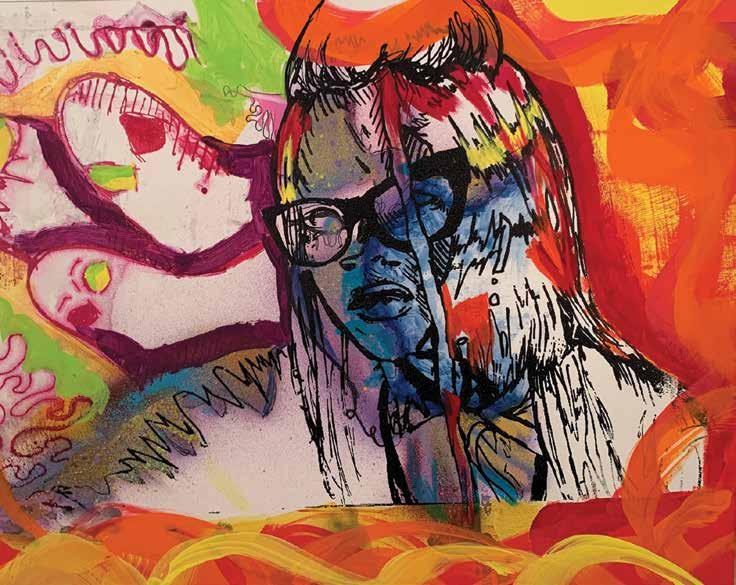
There’s nothing.
No cycles
No daydreams
It’s over Everything is gone
I sit in peace
Reminiscing about what I’ve lost It is all that remains in this place
Nothing or no one lives Nothing stays
But with no cycle to break, No shackles to hold us
What stops us from turning back?

What stops us from starting again?
This painful Mind numbing cycle
This is an illusion we chose to believe in. But now we can see the truth.
It’s okay now. We can start again.
But sometimes there are mistakes too great to move on from. Too great to evolve.
It’s not their fault, But it was once, And it will be again one day
They will suffer for eternity. Always as different people. Bearing the burden of the consequences of a single mistake.
Of a single person they now have no resemblance with. But a person they once were.

Some would call it a punishment. Others karma. Some would call it unfair.
To meddle with forces beyond your control and pay the price across all existence. How terribly human
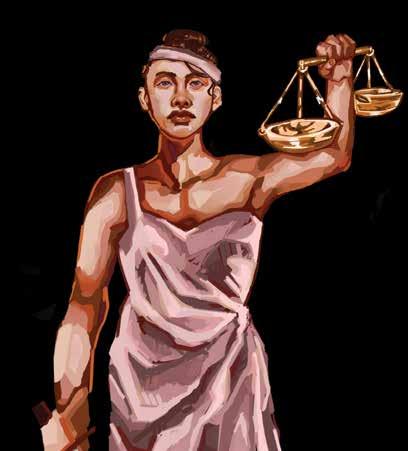
I can’t fold looseleaf refutes my fingertips, guide my hands, please though I won’t retain your moves, if i may only let my mind be lost in your instructions. I don’t know the second step, the ground shakes in furiated doubt as i travel to your movements again show me your heart once more, capture me within its contraption Let me lie within hold I will fold otherwise for your voice, warbles pressing my chest till insanity meet my eyes, sun may you melt me to desperate pools Greedily keep me, Let me fold for you, For your heart, for You, entirely and always

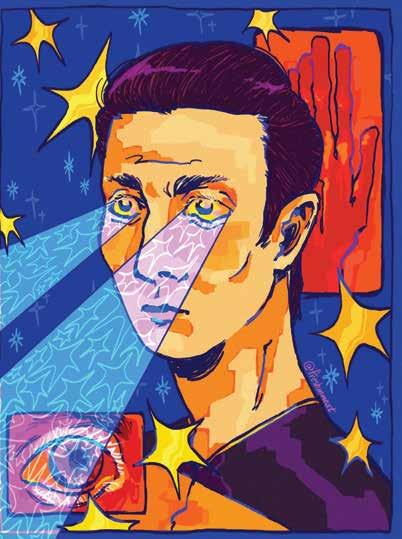 28
Data by Jasmine Neumann ’25
29 Lady Justice by Michelle Anabila ’26
28
Data by Jasmine Neumann ’25
29 Lady Justice by Michelle Anabila ’26
AS AN ARTIST’S JOURNEY TAKES SHAPE, THE IMAGINATION BEGINS TO SWELL AND ROAR LIKE A RESTLESS SEA.

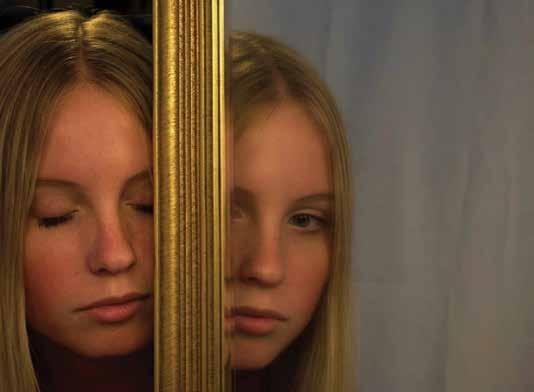


We once caught God resting on our basement floor: overheard the breathing, pulsing, beating heart that mocked our mortality from another room.
Listen, I whispered to my brother sitting there, a God who has fallen will never stay more than His heaven’s willing to share.
So we stayed and stood across the doorway to watch a man, lying in his casket of walls and dust closing in.
We realized he is truly a fatherless man, a father a son a spirit without one to claim. A light, lit and kindled, bending to the spark it cannot see, and calling it holy.
In case you haven’t witnessed this, this was Heaven. In fact, we decided on it when I was eight and he six, that it hid in the whispering room in the corner of our silent basement; we decided on it when I reached but grasped nothing, that the cushioned walls and pipes had become a ceremonious entry eternity.

Yes, this was eternity: the birth and rebirth of a man that in the death of permanence had learned to rest. Here He must have said when burying His wings below the ground, I am yours, and you are mine, but there’s a curse behind “divine.”
We decided we were holy when He forgot to rise. We decided we had conquered His falling above, And that in turn we prayed to the ground.
We prayed to the pavement. We prayed to the chalk that lined it, We prayed to the stains on our tennis shoes And the refusal to baptize them. We prayed to our steps. We prayed to the soil He never touched, We prayed with cupped hands and fingers intertwined In the gaps of the other’s. We prayed to each other. Brother and sister living in a world never-ending, Two children caught in a heaven ever-falling.
Thank God
He had abandoned us, Thank God He had chosen us.
NOEL ULLOM ’23She smiles, and is an actress.
SOPHIA TULLY ’25
you’re always in my head an everpresent thought at the forefront of my mind it’s been years and still, you persist the ghost of you constantly accompanies me haunting and territorial competing with everyday ideas and responsibilities for space in my brain prohibiting me from contemplating anything other than your existence or rather, the lack of it your absence leaves a hole in my heart it stabs my soul every time i think of you and salty liquid pours down my face it’s been years and still, i cannot fathom how you could abandon me leave me to face the struggles of everyday life on my own force me into the monotonous, never-ending cycle that is grief
the memory of you tethers me to reality keeps me trapped in a burning, bottomless pit i reminisce on the valuable times we had the laughs, the cries, and everything in between now all i have left are reminders of you it’s been years and still, i cannot bear to move forward to venture into the uncharted waters that lie ahead of me
to keep going without your constant presence with only the thought of you guiding me
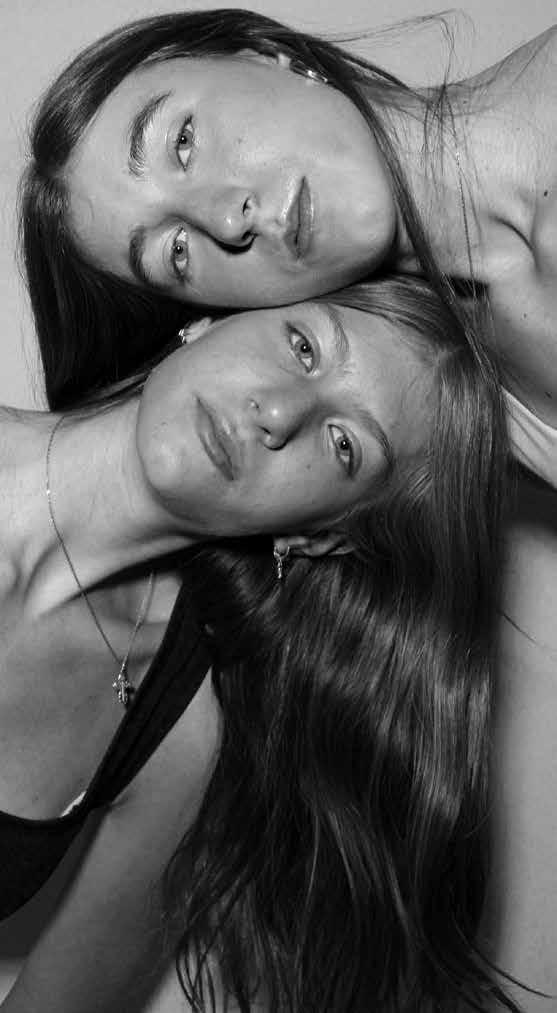
 MUNA AGWA ’23
MUNA AGWA ’23
The song opens with a quiet but captivating string of notes. You feel chills from the hollow vocals before the warmth of the orchestral swell. Labrinth’s high belts convey a cosmic and near-religious experience of something so central to the human experience: love. “Love is Complicated (The Angels Sing)” is the kind of song that causes the pupils to dilate; a song that the heartbeat tries to match; a song that beautifully renders humanity’s inner cravings. The song’s hymn-like delivery recreates the cavernous atmosphere of a church, as its notes are a place of shame and worship all at once.
The song contains a deep undercurrent of hunger beneath its angelic sound. The lyrics from “Love is Complicated (The Angels Sing)” seamlessly roll human love and longing into one dark and heavy and endless thing, enough to compel any alien to marvel at our emotional complexities. The lyrics read like an eternal memory: “Oh, honey, a heart that never breaks / Oh, treasure, / mark that never fades / Oh, darling, love me this way / ‘Til my feet take me to the grave”. Love is the human condition; it’s the never-ending giving of ourselves. Even in grief, there is love, as the agony of loss means we have loved richly and unforgivingly “to the grave”. Love asks us to leap from the cli of reason and hold one another on the way down, which explains why we famously refer to love as a “fall”.
We are more like the Martians than we think though. In a sense, we all begin life as aliens on this fallen Earth, and we spend every day becoming slightly more human. We have to learn how to navigate our bodies rest: we learn to sit up, and then how to track things with our eyes, and then how to walk, and then how to eat solid food. And then we learn how to talk. And read. And we begin to piece together who we are. We relish in triumph. We
overcome adversity. We learn how to be loved and how to love others. And while we may not realize it at the moment, we were quietly becoming human. We were collecting memories that would later piece together an answer for what it is to be a human.
Though, we habitually hold some memories too tightly to really remember them, memories that are embedded too deeply in us to conjure up clearly. Whether the past holds genetic vestiges of trauma or overwhelming sacrifice to sustain the generations to come, so much of what we carry consists of what and who came before us. These memories resurface, evoked through music, writing, and art that is able to capture the feeling rather than offer up a concise explanation of why we might sense impending loneliness or agonizing heartache. That longing might be part of a larger symptom of belonging to this vital, aching Earth.
So, what makes Earthlings a worthwhile endeavor for Martians? The answer rests in what we make and how we love. Labrinth’s “Love is Complicated (The Angels Sing)” is a teeming example of the otherworldly creativity that flows from us, making us just as alien as the Martians. What we imagine can be so strange and electrifying, that it transcends this world and ripples through the universe, lighting up everything in its path. As fellow aliens, our creations are the window through which we explore our colorful internal worlds, which then connect and animate our vibrant communities. The experiences that run through each and every human endows them with a unique strand in the greater tapestry of our collective alien experience. Thus, our creations and experiences, whether vivid or mundane, deepen our ties to a glittering, infinite existence that knows no celestial bounds.
06 Sestra Sestra by Ida Rausche ’23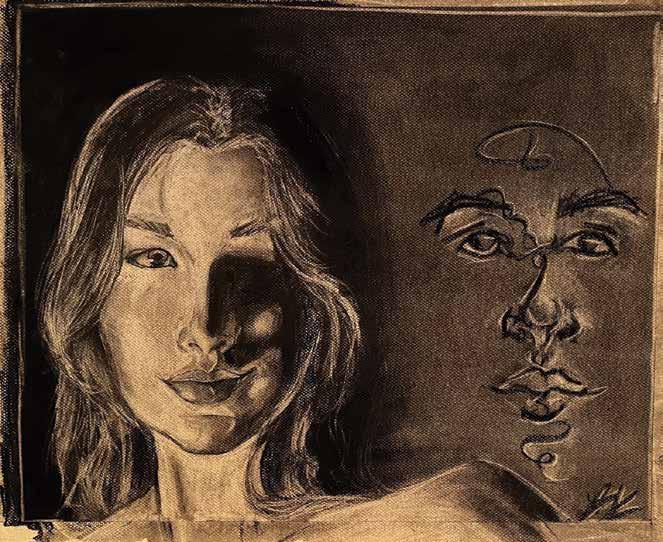

I think (I hope) I am at the height of my teenage angst On Friday the girl next to me in first period was writing with a bright pink gel pen and I thought to myself that she must be normal. Her nails were pink too.
I have given up my blood and brain and roots and I think for that maybe I am easier to digest. I haven’t cried in a while but I have come close. I recited a prayer in a language I do not speak when I thought the boy my best friend loves was dying. Keeping the faith.
I miss I miss I miss I miss, and I am not sure if they miss me. They are all my stories.
I think I will be fine (I am a bit brittle).
I said I am wildly depressed — I am not, probably. Maybe conflicted and a writer: artist troubled and teenaged. After all, I am nothing if not obsessive. We will never be there again; accidentally on purpose. He sent me a voice message and he was older, and I am thrashing around like a fish out of water. But mostly I am good and quiet.
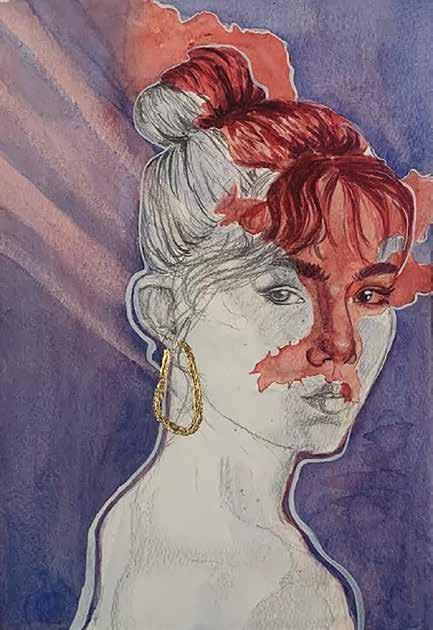
Every day for a year I have handed out clementine slices at lunch to those I love. Clementia the goddess of forgiveness: forgive me, I love you. Orange? Take a slice? Take my offer? Forgive me.
I used to hope for something physical as proof that the world was working and spinning and breathing. Jeeps and bird flocks for love and cancer. Neither is a threat anymore, because I am healthy (angsty). I wasn’t left with anything physical and recently remembered there is an undeveloped photo of me in my car before everything went wrong. Electra and Orestes. Brutal or kind/pensive or honest; it is for her to see and learn from.
So in some sense, it is physical.
A mark I cannot see. To remember. It will never go away completely, and sometimes it is April 29th again, and sometimes early fall and February face me (grief) and it is just love in a heavy coat.
There will always be an angry man in the house (it is me: I am angry, making up for the man that was not there and rarely upset).
Later I will have words for everything. Not now. Everything I was afraid of happening, happened. It is manic — the feeling of this; like I am pretending to be the girl with the bright pink gel pen. Like I have done this before.
08 The Two Mes by Lizzie Kasubick ’23 09 Haven of Restful Nights by Ava Beredo ’23Delight, what a beautiful yet simple thing. Some believe it to be a word of innocent happiness and glee. While others seek its glory and pleasures daily. A large gift, a momentous occasion, a beautiful compliment. Many look for large, significant reasons to delight, to become happy and joyful in the moment. Yet, Mother Nature in herself is a delight. She is the light of life and its very beauty indebted to her. Delight in the small triumph, the tiny winnings, the insignificant accomplishments; and the person as a human being will enjoy life in every sweet and bitter moment. I am delighted by nature. I am delighted by the sunrise and sunset, the hues and colors painted across the summer skies. The sound of birds, calling their names, each an intricate song, rousing their loved ones at the morning’s peak delights me. The chitter chatter of the cricket, the occasional squirrel or chipmunk, and the curious fawn cavorting across the green plain delights me. I take joy, pride, and peace in the very essence of nature as God has created it.
Delight shows its face in many shapes and forms. Sometimes disguised as the sweet surprise threatening to overwhelm your conscience and in others as a gorgeous and welcome sense inflating your heart with happiness and an inner childish satisfaction. Delight in itself feels and sounds to me, with its many nuances, as a feeling that lets your inner child shine brilliantly with happiness.
Yet, other times I feel delight is ever temporary. That it is a fleeting emotion that goes as soon as it comes. A feeling incapable of being grasped by the heart rather only understood by the mind. Delight sounds so materialistic and concerned with the mortal world. It is incapacitated, disabled, and indisposed to exhume a more everlasting and permanent emotion. Happiness and joy, on the same hand, are her sisters in meaning and existence. However, the very semblance of peace, satisfaction, and inner contentment communicate a beautifully meaningful and long-lived duration. It feels so wrong yet so right to say I delight in nature. I delight in all that is temporary and fleeting. I delight in the change of nature and its beautiful idiosyncrasies. Each day a new dawn splashed with tones and pigments to fill one’s eye to the brim. I sincerely and wholeheartedly delight in the temporary nature of the seasons or the fleeting call of a crow signaling the coming of fall. How fortunate and breathtaking is it to delight in some small, new aspect of natural life each day? What a gift and blessing it is to have such change in our environment. The bittersweet aroma of cut green grass wafting into my open bedroom window. Or the rustic, spicy smell of the apple orchard’s tree blooming months before the harvest season.
I delight with my five senses, each an intricate melody of its own. I delight through smell of the freshly tilled earth as my family prepares for the flowering season. I delight through taste in the slightly damp and musty air on a blazing summer day just before the first drops of a rain shower. I delight through touch of the luxuriously, silky smooth petals of the Jasmine tree as its blooms are escorted by gravity to the ground. I delight through hearing the very orchestra of my surroundings whether it be a goose call or the skimper of a chipmunk. I delight through seeing the beauty of the ocean as it snakes its way onto the smooth, sand-lined beaches as though grasping for a hug yet barely holding on.
My delight is a natural, always occurring delight. A beauty that can be seen daily and noticed minutely. I delight in the blessing of nature and how delicately perfect the harmony is between nature and man. A happiness that is everlasting if only the individual were to open their eyes and notice the delight in their surroundings.
11 Sugar by Alexa Christopherson ’23 12 Sour Desire by Alexis Everett ’24
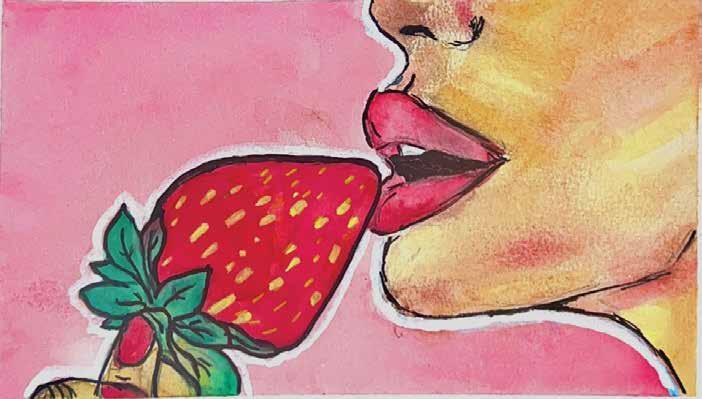


ARCHER GANDHI ’24
L’amour nous passe tous les jours, avec aucun souci pour ce qui les gens manquent, ceux qui pleurent au vent sauve-moi, je m’ai perdu en haine.
Pourquoi on saigne rouge quand le coeur ne sens pas? Si on ne saigne pour l’amour, si on saigne pour la guerre ou la punition, c’est fou de donner la rouge qui caresse notre bouche, nos mains une touche sans haine qui peut sauver du monde.
Le temps passe, et passe, et nous souffrons dans l’influence qui nous perde jour par jour.
 13 A Closer Perspective by Alexis Everett ’24
14 Glimmer by Alexis Everett ’24
13 A Closer Perspective by Alexis Everett ’24
14 Glimmer by Alexis Everett ’24
At the heart of Pride & Prejudice by Jane Austen, the developing relationships between families, friends, and lovers become subject to the vulnerabilities that characters allow to remain unexpressed more than the vulnerabilities they allow themselves to confess. Each interaction, each conversation, and each remark within the novel ironically prove themselves most significant through what is left on the tongue, leaving the true intentions of these interactions to live within moments of silence or suggested hints. The most reliable catalysts for intimate connections between characters such as Elizabeth Bennet and Fitzwilliam Darcy do not only include silence or hints, however, but include music as well. The art of hearing and playing music continuously amplifies other senses, providing more time and space for Darcy to closely observe Elizabeth, her younger sister Jane to feel Mr. Bingley’s hand on her waist, among many other instances. Alongside reflecting the rigid structure of nineteenth century English society, music revives the individuals that have suffocated under this society’s pressure and reacquiants them with their vulnerabilities, giving more palatable forms to them in the process: the dialogue that surrounds music, body language under the influence of music, and the practicing of music itself.
The creation of an elegant piece of music, whether in composing or playing it, relies upon the same discipline and sense of control with which the young Bennet and Bingley family members struggle in their own society. Just as the measures and beats of a musical piece define its rhythm, the rigid structure of upper class life in nineteenth century England constructed by class divide, gender roles, and familial responsibility define the way in which characters such as Mr. Darcy and Mrs. Bennet choose to perceive the world and the way in which Elizabeth and her younger sisters suffer under these closed-minded perspectives. In discussing the role of young women and the qualities that deem them worthy of praise, Miss Bingley cries, “‘no one can be really esteemed accomplished who does not greatly surpass what is usually met with. A woman must have a thorough knowledge of music, singing, drawing, dancing, and the modern languages, to deserve the word’” (26). Throughout this tense discussion between Miss Bingley, Mr. Darcy, and Elizabeth as they disagree over what constitutes fair expectations of women, music continuously reappears as a reference to perfection. In relation to other forms of art listed by Miss Bingley, music presents an avenue through which a woman may prove her self-control and talent to an audience. However, in demonstrating her talents and worth in this way, a woman also then allows the notes of a composer to speak for her. Her talent becomes a recitation of what is quite literally spelled out on a page before her, and she is discouraged from changing its tune. The societal value of performing and performing well any task that is given to a woman
ULLOM ’23presents itself in many instances throughout the novel, most notably when Mrs. Bennet expects Elizabeth to accept the earliest marriage proposal that comes her way or when she expects Jane to sacrifice her health to visit Mr. Bingley in hopes of increasing her chance of marriage. Similarly, Lady Catherine de Bourgh later plainly states to Mr. Darcy, “‘I often tell young ladies that no excellence in music is to be acquired without constant practice. I have told Miss Bennet several times, that she will never play really well unless she practises more’” (118). Through her emphasis on practice and its relationship to the pleasures of music, Lady Catherine reveals that the true value she finds in music is not the art of sound itself, but the art of a woman surrendering utterly and completely to the rehearsal of it. More broadly, she finds value in the art of surrendering entirely to rigidity and routine. This message directly reflects the inevitable yet unfortunate reality of a society or piece of music that thrives on its own limitations; while existing in a state of unyielding rigidity, both a well-practiced musical piece and a maturing woman begin to sacrifice their unique expression to the expectations placed upon them.
Apart from reflecting the novel’s setting in upper class English society and its suffocating structure, the presence of music throughout the story also reveals the unpredictable nature of human emotion that refuses to yield to this structure. One of the most frequent ways in which music accomplishes this includes amplifying other senses, allowing characters such as Mr. Darcy and Elizabeth to indulge their romantic curiosities more blatantly. As Mrs. Hurst and Miss Bingley sing for Mr. Darcy and Elizabeth in Bingley’s home, Austen writes, “Mrs. Hurst sang with her sister, and while they were thus employed, Elizabeth could not help observing, as she turned over some music-books that lay on the instrument, how frequently Mr. Darcy’s eyes were fixed on her. She hardly knew how to suppose that she could be an object of admiration to so great a man; and yet that he should look at her because he disliked her, was still more strange” (34). The frequent usage of words and phrases referring to the sense of sight in this passage, including “observing,” “look,” and “object of admiration,” highlight the tender fascinations between Mr. Darcy and Elizabeth unveiled under the influence of music. While Mr. Darcy lacks the words to confess his love for Elizabeth at this point in the novel, music speaks for him in his place, giving voice to his otherwise silenced passion while he observes her. As one of the earliest art forms, music reflects and reveals the most unpredictable aspects of human emotion despite music’s own composed structure and moments when this influence is not intended. The connection of song to the budding intimacy between Mr. Darcy and Elizabeth continues to develop in the same scene when “[Miss Bingley] had not the smallest objection, and the pianoforte was opened; and Darcy, after
a few moments’ recollection, was not sorry for it. He began to feel the danger of paying Elizabeth too much attention” (39). Apart from exposing a character’s vulnerability to another individual, music serves as an instigator for personal reflection and self-realization as well. Due to the usage of descriptors with contrasting emotional affiliation, such as the feeling of excitement that comes with the “opened” pianoforte and sharp regret that comes with the “danger” of paying an individual too much attention, this passage highlights the contrasting emotions that control Darcy in this moment. The elegance and composure of music mocks human unpredictability in this scene and throughout the novel, as music both represents the desire for stringency in older characters and the inevitable disobedience of this limitation in the passion of young lovers.
Music contradicts itself by its own nature, and does so in a comedic and tragic representation of the individuals that write and play it. In hopes of a
freeing expression of passion and humanity, a composer creates a musical piece subject to measures and rhythm, and in hopes of displaying unique artistry, a musician recites the art of another. Incredibly similar to these inward struggles and searches for outward relief are the romantic endeavors of the Bennet sisters, yielding both to the demands of familial responsibility and personal attraction. While music reflects the challenges that endanger the relationships between Elizabeth and Mr. Darcy and between Jane and Mr. Bingley, most notably the unjust expectations placed upon women and the strictness of class divide, music also encourages the characters to reach beyond these obstacles and reach instead for their own genuine desires. Overtime, music grows to become as loud if not louder than the voice of family. This influence of music finally results in a major shift in the Bennet sisters and their romantic interests’ perception of marriage, and as a result, offers them new beginnings of harmonious partnerships and more peaceful daily rhythms for decades to come.

All I can hear is the splish splash

Muddled by this puddle they call a pool
The pool that’s water is cool the first entry is always refreshing All I can hear is their cheer
As a heap of limbs leaps into the water in one sweeping motion The beating of my heart constantly fleeting

Pounding with the resounding joy of getting to take that fateful dive for the last time

I never told you this story And I’d like to tell it now I want to tell you that I loved you. I really did.
All that time you thought that you were some piece in a game I was playing and building and changing and twisting. I loved you.

I loved you from the day I met you
A full seven years ago
A kid, really, just 11 years old and I. Loved. You.
I guess I was too young to show it, too dumb to see it, too scared to say it. Or maybe there really is a darkness in me that wanted to hurt you before you could ever hurt me.
And I did.
I know I did.
I know that I broke your heart and I know that growing for you meant leaving me behind, but I meant it, I mean it: I loved you.
Truly Deeply.
The way the stars gaze at the moon and the ocean hugs the earth. I loved you so much that my heart cracked into so many pieces, I’ve given up hope of finding them all.

So I am sorry I didn’t see it until you were leaving for college.
I am sorry we couldn’t love each other at the same time until it was too late
Back then you were the first boy I’d talked to until the sun tucked the moon into bed
And now you’re the first man I gave my body to
And you don’t even know that.
You don’t know that I am only half a human here hoping for some hope because when you left you took my heart with you sewn secretly in the lining of your suitcase.
I am here and I am heartbroken
And you don’t even know that. Because I never told you this story.
17 Taking Her Breath Away by Ava Piliang ’23 18 Lone Fisherman by Liza Weinberger ’24I. I remember how our hands would meet at the barre
I remember how often we didn’t know the combination
There was nothing like laughing at mistakes with you
Such a terrible distraction from my training
But what a beautiful addition to my life
We were always the same
Your eyes found my eyes and my eyes found yours
And when you smile, I smile
When I breathe, you breathe
II. I see you in the wing across the stage
The lights so bright I can only see your shape
We take a deep breath
Shoulders Up
Shoulders Down
You smile, I smile
And the music gently pulls us into the warm light
A comforting darkness, shadowed familiar faces ahead

My eyes see your eyes
I smile, you smile
We Begin.
III. I love your hands on my body and they love me through every lift
I will leap into your arms with no fear of falling
Because I’m flying at you
And I am so much more than a woman and you
So much more than a man
There is nothing quite like dancing with your lover
Nothing quite like loving your dance partner
I will take any risk within your hands
Because the man lifting me, the man supporting me
Is the man that I love
IV. It’s an entirely new language.
physical and technical
There is nothing like partnering
You support me, you carry me, you lead
You are responsible for my body
I am responsible for yours
I support you, I carry you, and I lead
We move like water
breathing together, and thinking with one mind
No words
I hold you while you hold me keeping my hands in yours
Just hands and bodies and music and our eyes
We are hugging
Just hugging
Just breathing
Breathing like water
Dripping with sweat
I trust you completely
I have you completely
Her hair is a multitude of colors. With a tilt of a head, or a blink of an eye, the shades shimmer and change with a quickness that isn’t expected. The rich, deep reds. The brilliant, strong oranges. And the bright, vivid yellows. It’s hard not to gape in amazement as she begins to head towards you, transforming at every glance and breath.

She wears knitted, oversized sweaters — the kind that wrap you in a loving, pleasant hug. She wears scarves of all kinds. The long ones, the tassel ones, the hand-knitted ones. A warm, affable piece of fabric that elongates the feeling and meaning of someone wrapping it around you. Sometimes she’ll wear a hat. Some boots. A sweater vest. Either way, it exudes warmth, comfort, and the kind of mellow amiableness like the scent of a candle floating in the air.
She is a long walk in nature, a good book with a cup of steaming coffee or hot chocolate. Cinnamon, apples, coffee, and pumpkins. The
warmest shades of color, contradicting the crisp, chilly winds that tease and toss her hair around. And her cloudy, gray eyes, filled to the brim with a cool calmness, submerging any other feelings but love and all other actions but a smile.
The tranquility in her voice, the smile always playing on her lips. Early nights, barren trees, fallen leaves. The ballads of the birds, the clacking of the acorns, and the whistling wind.
I love her. I want to clasp my hands around hers and twirl her around and around, watching her eyes glitter and her hair spin. Pursed lips, then a smile, teeth peeking through brightly. I want to embrace her. To smell the sweet, tangy scent when I nestle my face into her shoulder.
But she doesn’t stay long. The reds and oranges, the apples, the coffee, her cloudy gray eyes. Her hands will eventually slip out of mine before I can even notice it. The sudden lack of warmth
will be replaced by the coldness of longing. I would then only fold my hands into my own, withdrawing into my own comfort.
I know other people will come. People I still like, will enjoy spending time with. But nothing can replace her eyes, her scent, her hair, and her smile. So this time, when she comes around the corner, I will grab her hands and hold on tightly. I will spin her around and watch her hair shimmer. I will gaze into her eyes, trying to hold onto that feeling for as long as possible. I will listen to the songs of birds all around us. I will submerge myself in the lovely scent of her: a warm dinner with family, spices, an old book with a cup of coffee, the ending of a rainstorm whilst in a forest.
Can we dance again and again until you leave?
Just you and I, hands interlocked. Twirling, jumping, and laughing together until the sun sets.
CHARLOTTE LU ’25
Il était une fois une fille qui s’est réveillée dans le désert. Elle ne se souvenait pas de son nom ou comment elle était là, et elle n’avait rien sauf une cape marron.
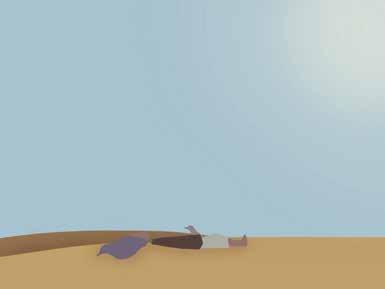

“...bonjour?” Est-ce qu’elle rêvait?
“Je ne sais pas.”
“D’accord… mais, pourquoi?”
“Bonjour,” a dit l’oiseau.
“Où est-ce que tu vas?”
“Bon, moi aussi. Tu veux aller à la montagne là?”
“Pourquoi pas?” l’oiseau a dit, et ils ont commencé leur voyage.
La fille ne savait pas où elle voulait aller, donc elle a commencé à marcher.
Il faisait chaud et le désert était grand, et quand elle est arrivée à la fin, elle était très fatiguée.

Mais avant de s’endormir, elle a vu un oiseau qui la regardait.
Ils ont voyagé dans les forêts vertes…

- chanceux: lucky
- frissonner: to shiver


- étoile: star
…et les rivières bleues.
“Tu n'es pas une fée?” la fille a demandé.
“Je suis un oiseau,” a dit l'oiseau. Elle a soupiré.

Longtemps après, ils étaient au pied de la montagne.
“Ce sera difficile,” a dit l'oiseau. “Et froid.”
“Allons-y,” a dit la fille, et elle a commencé à marcher. “Tu es chanceux de pouvoir voler.”
“Bien, je suis un oiseau,” a dit l’oiseau.
Bientôt, il faisait très, très froid, et les deux frissonnaient dans la neige.
“Pourquoi est-ce que nous sommes ici?” a dit la fille.
“Tu n'as pas quelque magie qui peut nous aider?”
“Un peu plus.”
“Je suis un oiseau,” a dit l’oiseau, et ils ont continué à marcher.
Il faisait froid et la montagne était grande, et quand ils sont arrivés à la fin, ils étaient très fatigués. Mais avant de s’endormir, ils ont vu les étoiles dans le ciel.
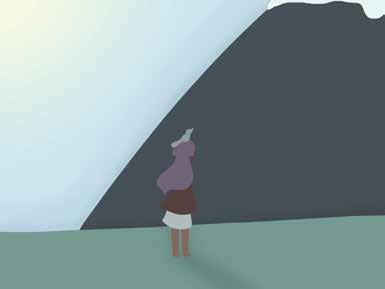
“Elles sont jolies,” a dit la fille.
“Oui,” a dit l’oiseau. Et ils étaient un peu moins froid.
The first time that I can recall listening to rain was after a nightmare that I had. Frequently, throughout my childhood, I was awakened from my sleep by terrors that had plagued my dreams. This particular night, I woke up screaming and sprinted into my parents’ room with my pink blanket trailing closely behind me in the wind. I curled into my mother’s arms as she rubbed my back, attempting to soothe me. It was here in her arms that I first took notice of the rain. The soft chatters were something for my mind to drift towards instead of the fright from my nightmare. That night, I fell asleep to the gentle hand caressing my back and the sound of rain cradling me.
This past spring, on a random Saturday afternoon, I found myself lying on the edge of my bed examining and concentrating on the rainfall outside. I listened to the subtle pitter patter that the rain droplets made when hitting the roof and rolling off the ledge. I tuned into the repetitive rhythm that they started to form as time went on. I paid attention to the moments of silence before thunder attempted to uproot the house. I searched for the ray of light that beamed through the tinted clouds, although not being able to pinpoint it. I noticed the way one droplet landed on my screened window simultaneously to the one that dwindled away. My entire world of thoughts were consumed by the peaceful chaos that was rain.
One thing that I noticed particularly about rain that day was that it had the ability to silence the entire world. All of the outside noise had been lost within the rain shower, only able to come back when it had reached a stop. It washed away the buzzing noises of cars, sent home the perpetual chatter of others, and wrapped you in a blanket of comfort. Earth’s own form of self-care had become mine. I could live in this type of silence for the rest of my life. It was so unlike the usual type that consumed me. The other types of silence compelled you to sit with your thoughts, hyper fixating on anything and everything. It flooded your mind with unwanted thoughts that you begged to depart but didn’t. But this silence, this silence was a distraction, a feeling of refreshment and restarting. This type of rainy silence can only be understood by a person who has truly listened out for it, waited for it, cherished it.
Thanks to the silence that bullets of water brought, my overbearing thoughts had been drowned out by the beautiful havoc of rain. Rain forces you to listen, making you its audience as it plays the lead role in a musical. It is absolutely impossible to escape it, more so than the overthinking going on within my head. The rushing thoughts being replaced by the constant and quick fall of water. For this reason, I have come to love rain. The simple thought of it provides me with enough ease to get through my overanalyzing. When I find myself starting to dwell on something, I think back to the tranquility I have been blessed to find within pellets of rain. It is my safety net, the thing keeping me from suffocating in my own convictions.
But you don’t have to be overthinker to simply like the loud silence of rain. I’d like to think that any person is able to enjoy it as long as they have thoughts they are willing to escape and a reality they are able to let go of. Maybe it is due time that we try to listen out for the silence in life the same way that we do in rain.
I wander down to the water
Tree roots are my steps
I reach the bank and marvel at the sun peeking through the mountains
Mist rising off the hills
The water motionless and still
I will my not-fully-awake mind to Sharpen up! For fear of forgetting the magic of this moment
I hear the rustle of bushes behind me
It is her, sporting a messy bun and Bright smile
She joins me by the water
I am grateful for her lack of conversation
It seems a sin to break the quiet and
I am embarrassed of my morning voice
We stand together, hands in sweatshirt pockets
Admiring this secret beauty
I hear a whisper from my right
“Show me how good it gets.”


For years women have been forced to keep up with a persona crafted by men. Stay fit, stay healthy, stay youthful. However, this same idea isn’t forced into the lives of men the way it is for women. Women are taught from a very young age how harmful aging can be and the issues and or side effects they could face from them. Women are constantly reminded of this through so many different forms, whether that’s their mothers telling them to not squint their eyes in the sun because it can cause wrinkles or the anti aging cream advertisements they see on their TV. As young girls, we are taught that aging is something to prevent, something to avoid like a virus. How is it that men don’t receive the same treatment?
Women have always been seen as an object and something to display to men. But what happens when that object starts to tarnish and wilter? It loses its value. We can often see this when young girls are married off to men twice their age or when women take countless surgeries to stay looking youthful. It is often common for women to have a harder time finding a significant other as they grow in age. We consistently see examples of this being portrayed in the media. When female celebrities grow older they are seen as “letting themselves go” as wrinkles start to appear and their hair turns gray. They no longer become as prevalent in the media because their money maker is out of use. These celebrities are then criticized for getting surgeries to reverse their appearance and look youthful again because they don’t look authentic or they are “trying too hard,” simply put there is no winning for women when they get older. This crisis is extraordinarily present in the film industry; women start not appearing in many movies or TV shows, because their age isn’t on brand. Whereas when male celebrities grow old they are praised and told that they are “aging like fine wine.” Men still receive active roles despite their age and continue to appear in films until they retire, unlike women, who are forced to retire because they aren’t found attractive anymore because of their age.
It’s not just the wrinkles and the gray hair that become associated with age but also your weight. Society promotes weight loss and skinny culture, that’s a well known fact. One can see this with the weight loss plans and low calorie snacks promoted on TV. Another example would be when women depicted in magazines losing 30 pounds after using a certain workout plan. All of this to stay young and youthful in order to try and feel as if they can fit into society’s standards. If you look at anyone’s weight journey on any social media platform there is always that one comment on how much younger a person looks, especially women. Nevertheless, when men gain weight they aren’t always demonized for it. For example, the “dad bod” has been very popular recently and men with this
body appear to attract more individuals. Even songs praise men for their weight, on SNL SZA sang a song praising bigger men. This is not to say that there is no praise for women who gain weight, it’s just not as common because as I said previously, weight is associated with age. You don’t typically see the same amount of attraction to bigger women as you do to men because women are just seen as letting themselves go. Even when you see older women on social media or TV “embracing their age” they are all skinnier women who have usually gone under procedures to “de-age” themselves. Adding on to that, when older women are seen as embracing their age they are still trying to look somewhat youthful. Some of the effects of aging for women include breasts starting to sag, skin becoming looser and weight gain. So why is it that these women who are “embracing their age” are getting boob lifts and face lifts and only maintaining their gray hair? I would like to make it known that not all women who are embracing their age partake in these activities, but I am saying that these are the women that the media chooses to show when the topic of age pops up.
I briefly mentioned serums and skincare earlier, but I am going to take it a step further. As I stated previously, there are countless advertisements for serums and anti aging creams on TV. They typically include a woman with sagging skin that appears to be sad but once they use the cream being advertised they look happy and youthful. It’s funny how these commercials or advertisements almost never include men and as they do this they further the notion that aging for women should be avoided. Another example is sunscreen. Sunscreen has been used since the 1930’s but it was the product that your parents forced you to wear and never did unless you would be outside in the sun for a couple hours. Even though doctors had recommended wearing sunscreen daily nobody really would because it seemed like a chore. In addition, many people in the POC community believed that they didn’t need sunscreen because of the amount of melanin in their skin. Now all of this changed recently when people realized that sunscreen can help prevent wrinkles. All of a sudden every skincare must have sunscreen and sunscreen brands like Supergoop are skyrocketing.
At this point, you are probably wondering how to fix this issue. Well, it’s up to us, the younger generation of women, to stop letting age define us. To truly embrace age, not just a picture perfect idea that society has crafted. I know this is easier said than done but it’s the only way to stop this harmful tradition. As a society, we will never be able to advance past this if we, the women being affected, don’t do something about it.
THE SEARCH FOR NEW IDEAS CAN CREATE A MESS. ARTISTS KNOW TO LEAN INTO THIS SPECIAL CHAOS AS THEY CHART NEW CREATIVE PATHS.

According to NPR, the United Nations claims that two billion people, or twenty-five percent of the global population, are now residing in areas affected by conflict in some form. Yet, few know about international humanitarian law, despite the rising need for awareness. International humanitarian law is defined as a set of expectations to be followed by all parties during armed conflicts, such as protecting humanitarian workers in order for them to provide service where necessary as well as protecting refugees and unwell individuals. The necessity of this set of expectations that all are bound by is evident due to various reasons such as the need to protect the environment and wildlife amidst crisis situations. Moreover, it is essential to recognize that armed conflicts, before being a mere process by which a dispute is violently resolved, should be an approach to reasonably determining a resolution to an issue by prioritizing humanity towards others and the environment.
Understanding and valuing international humanitarian law is vital in order to comprehend the effects of armed conflict on the natural world around and more importantly to limit environmental damage and preserve the economy.
The detrimental issues that armed conflict poses are not limited only to injuries and fatalities. In fact, they can cause societal disturbances, such as emigration, refugee crises, and damage of even billions of dollars worth in the economy and
infrastructure. A prominent example of this can be taken from the Russia-Ukraine conflict. According to Forbes, the Russia-Ukraine conflict has caused a loss of nearly 108.3 billion dollars in Ukraine’s infrastructure, leaving over three million people without an address to call home. Furthermore, this conflict has eradicated over 100,000 cars, over 40,000 agriculture-related machineries, over 700 kindergarten facilities, and nearly 2,000 shops in Ukraine. On the other hand, damage not directly involving infrastructure also proves to be considerably detrimental to civilians’ day-to-day lives, such as the after-effects of electricity outages as well as inflated prices for medication and medical services. These effects did not involve direct fatalities or deaths, yet they had a significant impact on the quality of life in Ukraine, further illustrating how little it takes to devastatingly tear down decades worth of a country’s hard work in mere days due to not adhering to international humanitarian law.
An important aspect of everyday life is healthcare, and armed conflicts that do not follow international humanitarian law can be deleterious to civilians’ access to healthcare and medical services. In fact, healthcare by itself is an extremely inaccessible resource due to several factors, such as unaffordability, gender bias, racial discrimination, and lack of healthcare facilities. However, due to armed conflicts, this is further exacerbated since the economy of a
country struggles to maintain itself in the aftermath of armed conflicts, and civilians may experience decreased assistance in affordability for medical plans and procedures depending on the country of residence.
Several common types of violations of international humanitarian law exist, illustrating the strong need for awareness to prevent these situations. War crimes include the use of ineligible weapons, attacks on civilians, and attacks on captured prisoners. Genocide involves crime committed with the intention of destroying an ethnicity or racial group, and inhumane violence involves unethical crime committed against a large number of civilians. Additionally, many people with physical disabilities struggle to access food and other basic necessities. Through international humanitarian law, this ignorance can be avoided and humanitarian relief workers can reach out to individuals facing these issues during times of war and conflict. However, despite the resources available and the importance of understanding why it is vital to prioritize international humanitarian law, many continue to stay unaware of its existence. Not only is it imperative that international humanitarian law be adhered to as an internationally binding set of laws, but it also reflects humanity and the importance given to life over an abstract issue unworthy of the countless injured individuals and damaged environments.
In that silk white dress
Skin unmarred
A veil across my face
I’m the epitome of pure
What more could he want?
My bones scrubbed clean of any essence of another Clipped off and thrown away, my dreams they no longer take up space

They needed to leave to make room for his
His wants, his needs, they became mine
Reconstructed to fit the idea of him
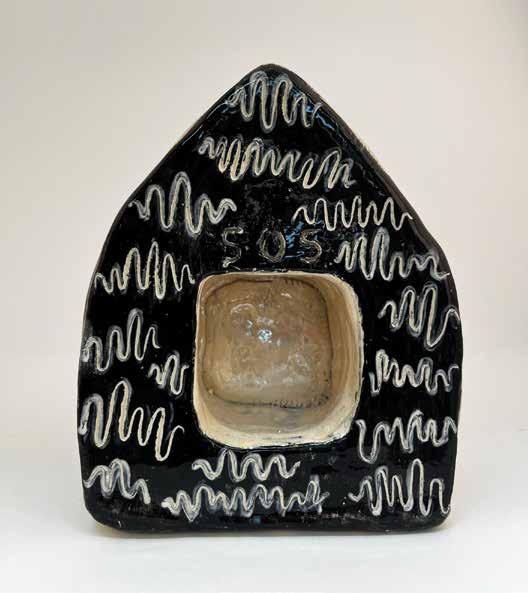
I’m his shadow
His beggar
His worker
I am his wife
The deep, dead vastness of night.
Shadows slipped near-silently over stone, the hooded figures they belonged to already accustomed to the thick, dark quiet. One stood beside a soon-to-be-dead king’s bed. “Honestly,” he said, disgusted. “You’re the literal king, my guy. You even left your goddamn windows open.”
“Wha—huh?” The aforementioned king sat up. Or didn’t, as there was a sharp, gleaming knife in the way. “Whuzz goin’ on?”
The knife pressed ever closer. The king blearily opened his eyes, turning to the hooded person beside him.
“Hey, uh, man, could you get me a sandwich real quick?”
“A what? ”
“A sandwich. Bread toasted, please?”
“This is why the people hate you.”
“The people hate me?”
“Good grief. Yes, the people hate you. That’s why I’ve got this knife here.”
“Wait… is this an assassination attempt?”
“You didn’t realize?! What’d you peg me for, the royal sandwich maker?! ”
“…yes? I’m still waiting on that sandwich I asked for, you know. With the bread toasted. They always seem to forget that bit.”
“You know what? I’m done. We’ve got an extremely stupid king and absolutely no food. Like, really, dude. You should of seen this coming.”
“It’s should have, actually—”
He was interrupted by a piercing, squelching noise, his last words echoing in the cold, still air. A similar noise occurred moments later down the hall. Whispers and cheers of It is done filtered through the great stone spires, the old walls seeming to creak and sigh.
But with disappointment or relief, one will never know.
Oh, wait, a child. How’d they miss that?
Years pass. The child learns the layout of the castle, where the food is, that the mice are stealing it and there are sharp knives in the kitchen and cut them, cut them until they stop moving, throw them by their wiggling tails outside.
She learns the shapes of letters and words from the books in the vast library, but the sounds are lost to her by lack of a teacher, and even the old castle can do little more than sigh and provide comfort in the knowledge that it would stand firm amidst crashing storms and howling winds, even though neither of them has been seen or felt in a while.
And once she has learned the meanings of words, the gathering and acquisition of knowledge eases, lightens, grows with the oceans of books sitting on dusty, weary shelves. She learns shapes and numbers and facts and history that will likely have no effect on her current life, but she learns them nonetheless.
Did you know? she chatters, soundlessly, to no one in particular. That a right angle is 90 degrees, that the third door on the left of the east wing was a larder once, that owls have soft, silent feathers, that slapping someone with a glove initiates a sword fight, that people get married when they grow up, that—
That the place feels so empty, she thinks, even though it has always been empty, will always be empty, and the walls sigh in agreement.
Empty excepting herself, of course. She’d somehow survived a decade within, and so she’d live for decades more, supposing the mice stopped eating absolutely everything that was fit to be eaten. She’d killed hundreds of them already.
Nearly everything of value in the castle had been taken by whoever left the dead, rotting bodies in the two rooms at the end of the hall and their bleeding heads between slices of bread in the kitchen with a scrawled note that read Here are your sandwiches, O Majestic King. There was a word in there that she didn’t know, but she supposes it doesn’t matter, anyway.
The once-full treasuries and granaries had all been raided ages ago, but the library remained untouched. The knowledge stored in books wouldn’t improve your life like food and wealth would, not directly, at least.
But knowledge of carpentry and gardens and plants had opened her to the possibility of a garden on the rooftop, knowledge of traps and hunting and mice allow her to protect it, and she gets a great view from on top of the castle, looking down at forests and hills and rivers and—houses?
With people living in them, she thinks, gazing down at the tiny figures milling about. Actual, other people that she could go and meet and be with.
Too bad none of the books in the library mention how the dastardly drawbridge works.
There is talk in the town.
Talk of a face in the window, a figure on the roof, a girl living within the old, aging, empty castle. They are dismissed as gossip and wild rumor, but the tale settles into an urban legend, akin to the sayings about the bloodthirsty wolves in the forest.
Several children plot and discuss what they would do if they went and knocked on the great wooden door, but it is a game, a harmless thing to keep their minds occupied and entertained for a while. That’s what their parents think, at least.
Time and time again she has thought about leaving. Venturing outside, bare feet on soft grass, the sights and wonders of the world. But without the drawbridge working, without her knowing how it works, she is stuck within the stone walls of her home.
Swimming across the moat would surely mean death. She would sink, floundering in the dark water, until she lay lifelessly at the bottom. If the moat even had a bottom.
She could build a bridge, a boat, some sort of gliding thing to fly above the sparkling ring of water that sat around the castle. But her time is severely lacking, she has other, more pressing things to do, and, truth be told, she is afraid of what she might find outside the walls. Although they keep her inside, she can recount nights when she watched torrents of rain pour down from her window, and was thankful and relieved that she didn’t have to be out there, freezing and shivering and soaked amidst the sheets of rain. But only a little, of course. She is only a little afraid, she will cross the moat someday. Someday.
Somehow, she is still unconvinced.
Just as she is kept in by the moat, the children are kept out. They whisper to each other in the dark as they dazzle themselves with visions of a face in the window, a figure on the roof. “What’re we gonna do now—”
“Throw a rock at it—”
“Do you want to get killed—”
“It’s not like there could actually be someone living in that old muckabout,” one says, drowning out the rest of their whispers with false bravado. “And we can just swim over. Your shirt needs a washing anyway, Jimothy.”
“Just call me Jim,” Jimothy mutters, sullenly. “And my shirt isn’t dirty, Katrina.” One by one, they cross over the deep, dark barrier, moonlight reflecting off of the waters. “You’re going to knock, Jimothy,” Katrina says, to sighs of relief from the others. “Why me?”
“Your shirt’s dirty.”
“Call me Jim first.”
“Fine, Jim. Go ahead.”
Three heavy knocks sound on the old wooden gate, the sound spreading farther than it should, reaching outwards and upwards through doors and walls and—
—and the stone towers on either side of the castle, shaking her awake. What on earth could possibly—
Voices in the quiet, velvet darkness, on her side of the moat.
How could that happen? she wonders as she lights a candle, starting the way down to that dastardly drawbridge.
“A face in the window,” Jimothy whispers, marveling. “With a candle.”
“You mean it’s real? ”
They’re talking about her, she realizes, but she doesn’t know what they’re saying. She wants to ask them questions, so many questions, but if she can’t talk then she can’t even do anything—but she opens the window anyway.
“Why isn’t she saying anything?”
“Can she say anything?”
Well, they think, it is reasonable that a girl cooped up all alone wouldn’t be able to talk. They make writing motions with their hands, questioning, and she thinks for a moment and leaves with the candle, leaving them all to fear in the dark until she comes back with parchment and pen.
What to ask? she thinks. What to say? Better to let them write first, then, and they descend upon the parchment, eager, shoving it back into her waiting hands minutes later. How are you alive? they ask. How long have you been living here? What do you do all day? Why haven’t you gone out?
But, most puzzling: What is your name? She answers every question but the last—a garden, all her life, read and think and work, the dastardly drawbridge, and sits to ponder the last question while they read her answers.
“She doesn’t have a name, either,” Katrina murmurs, and they suppose that no, how could you possibly need a name when you are the only one in this empty castle? “We could give her one,” Jimothy says, and they nod in agreement.
“And we could get her out of here, too.”
The sky is lightening, she is thinking, idly, when suddenly parchment is shoved into her hands again.
Come back with us, it says. To our village. You can climb out the window and we’ll carry you across the moat and also do you think Elowyn is a good name, it means elm tree?
The children swim back across, another member added to their group. They carry her when she flounders and help her up onto shore.
The great walls sigh as she leaves them behind with the feeling of resting after a long, long day.
“Elowyn,” they say, and she knows what they mean.
“Elowyn,” she says, and she steps into the sunrise.
June 29th, 2022
I want to thank you for visiting me in my dreams because I am entirely grateful to be able to see you and talk to you again. Even so, I know there is a veil just thick enough that keeps me from truly grasping what you look like or how heavy your hand is, or if your voice is really there or just a recording I have played over and over and taught new words to. I want to thank you for visiting but I am so caught up in anger and shock that you left the way you did, that it makes it hard for me to see straight sometimes. I want to thank you but what if you really are entirely gone, and I am making things up in my head? What will become of my thanks if there is no one to accept them?
The first night I dreamt you, you were exactly as I remember you, and the second you were not. A dark orange shirt and you had a little stubble growing, and I wondered if maybe it was an illusion designed to look like you. I walk and talk and breathe, and still I cannot reconcile with the pieces you have left behind. There was a beautiful sunset tonight and I could hear your voice in my head; I could see your feet propped up against the fence looking out at something you have never seen before. I told myself this night didn’t matter because you lived a thousand others that were wonderful and long and that you had a happy life-experiences galore but only enough to last just under thirty-two years.
Too short of a time, friend, and I want to thank you but I am so so angry. You are not anywhere I can grasp except my dreams, and even that is too far and unknown in between. Thirty-two years is almost nothing, and you were so full of this deep dark feeling that you took a gun to yourself? Violence is a scary thing; I am forever weighed down by that befalling you.
Your name still feels comfortable. I try not to throw it around because it is one of the last things of yours that I have, and I think it will never be enough. I found out two days ago. Today it was three weeks.
December 2022
It has been 25 Tuesdays since I found out you left us. Almost 26. They moved your desk and now it is no man’s land. Four days after you died I had a dream that I held your hand – I believed if I squeezed your fingers tight enough I might drag you back through to the real world. I don’t look for you in the halls anymore but sometimes a man will walk into the restaurant where I work and I am certain that it is you. That you are still here. I don’t know where your grave is and maybe like Schrodinger’s cat, that means that it doesn’t exist. I have kept walking and talking and breathing but there is a piece of me stuck in that first Tuesday of June. It has been four years since I was in your classroom, and now I am back in my old seat. You are not. And I am still here I am still here I am still here. We miss you like a routine – like it is in our bones and blood. Even since you left you have not become past tense. We love you. We miss you. You are remembered. You are you are you are.
I have not found peace but I have found quiet. I wanted to thank you

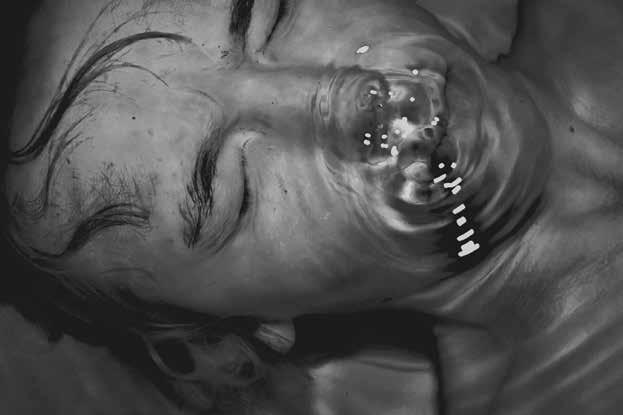


Regret lingered in the shadows when you least expected it. It casted a cover over the book in your hands, Reminding you of the prestige and title you once carried: “Prospero the prime duke,” the title you left and grew stranger to, to be transported and rapt in secret studies. ‘Focus. Focus. Focus.’
You burdened your brother with something that once belonged to You and expected him to give back when you were no longer absorbed in your studies.

Regret slips out on a page like ink eager to meet paper. Its contents slowly absorb, gradually revealing the arrogance of your desire.
It’s black, tainting the tip of the page with its weight. ‘Go away.’
The ink is disobedient, its attention focused on all, but one word: Repent.
Are you aware of your deceit?
Your manipulation?
Regret covers the page, yet you ignore its presence. Confess.
 07 Candida I by Sofia Dewey ’23
08 Candida II by Sofia Dewey ’23
07 Candida I by Sofia Dewey ’23
08 Candida II by Sofia Dewey ’23
 10 Empty Mind by Paige Ryan ’24
11 Dissociation by Carmella Muresan ’23
10 Empty Mind by Paige Ryan ’24
11 Dissociation by Carmella Muresan ’23

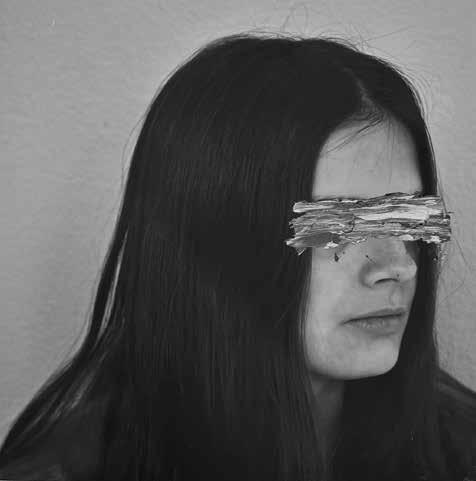
my mouth burns as the last slice of our shared tangerine touches the tip of my tongue. i wish i could pass you another slice, feel your amber warmth engulf my hand as our fingers brush, red blood pumping in our veins as our hearts beat faster and threaten to jump out of our chests. although the saffron sun sets, its colors deepening to a vermillion and soon a soft scarlet as the night drags on, a paintbrush on tight canvas. your fiery sun has set already, hoping to see me again in a golden Heaven.
I trusted him. That was my first mistake. I trusted the fastenings of chains that bound me to the wind, puppet strings that frayed and snapped, and I fell for his trap.
I believed him. That was my second mistake. I believed that he and I could escape this maze, this tangle of hatred, of shame, of love. There is no window in hell, only fire and fear, and I fell for his trap.
I enabled him. That was my third mistake. I enabled his command, heat burning against my back, when he fused me to my power he fused his hidden will to me, and I fell for his trap.
I loved him. That was my final mistake. I loved his sharp lies, I asked, “Do you love me?” and expected a true response, it’s my fault because my will broke as I leapt, and I fell for his trap.
I flew into the sun, his hold on me gone, power and freedom beating with every stroke I painted across the sky, but I, I ignored his warning, his screams as they broke, I realize too late that I need the chains containing me to him, my wings crumble, and I fall.
13 Lord Ganeesha: Remover of Obstacles by Arya Babu ’25
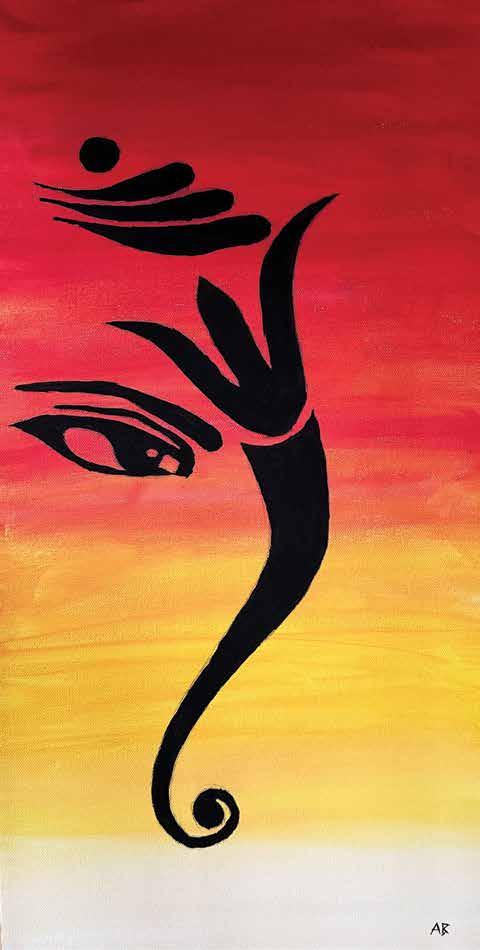
14 Reflection by Sydney Steffee ’24
15 Grieving by Olivia MacPhail ’23
Something always tells me I have to do everything and more, I must amaze everyone who knows me, I need to take every opportunity, I have to excel at all that I do, Whether I want to or not.
I can’t let it go, but it won’t let go of me. The pressure is heavy, hard to handle, But I have to deal with it, Or, I disappoint everyone, Or, I get nowhere in life, Or, I feel ashamed.
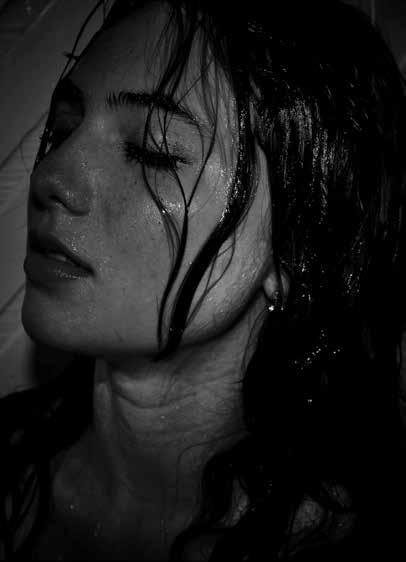
I can’t help but think: What’s wrong with getting one lower grade?
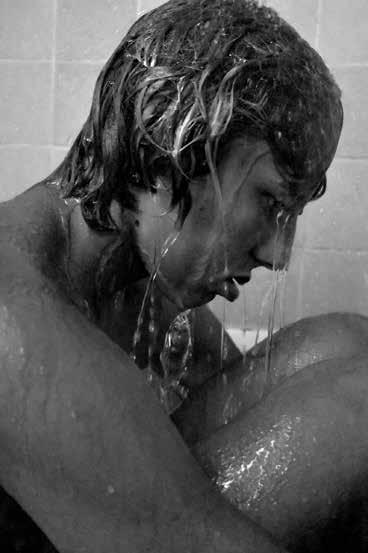


The winter comforted her with memories.
to live life without looking at the ground, daring the assumption of a presence, committing an action without the realization it’s already done. Your brain lingers among clouds, questioning the existence of gravity as it roams.
it’s the arms to catch you if you fall. Calling it crazy just feels degrading, like sitting down when you want to run, far away, so absurdly far.

it’s a pain that sharpens as you leap, cutting when you least expect it, when someone sees and grips your arm, hurt and betrayal underneath their now grim expression.
when you make it as far as a year- pain free. Till a spring spills over a meaningless pile of stress to the point suffocation is laughably imminent. Because, in the end you still lost, you still hurt, yourself and others. It’s worth it, but it isn’t, strangely enough. Call it a parallel or a headache, a word knows no limits.

As the sun beams on the window sill, And the white doves in the tree sitting on the tree very still, Miranda gazes out at the tranquil scene, Lost in her thoughts, so serene and keen.
Miranda, how fair and bright, Her smile shines like a shining light, The people in Milan, they all admire, Her gentle grace sets hearts on fire, Her kindness to all, never to tire, A true gem, a rare and precious attire.
Fear grips Miranda like a stormy cloud, Chilling her soul like cold, wet rain. Her world looks like it is falling apart, As she is forced to leave the city of Milan’s heart. Her future is uncertain as the ship sets sail, Into the unknown with each gentle breeze.
The island greets them with arms wide open, Father says this is where they belong. Years have passed, surrounded by endless tears, Not a soul in sight, an empty land, and a lonely sphere.
Prospero rarely would say a word to her, He preferred to control than lend a hand. “My father’s precepts, I therein do forget,” His teachings, once so strong, are now a distant echo in her head. Though she loved him, she longed to be free, From his hold, control, and authority.
Years pass by, and she stands with a smile on her face, Grateful for the lessons she learned in this place. No longer held by Prospero’s control, She is free to live life with joy in her soul.
19 Shack by Lauren Hudson ’25

20 Shadows of Serenity by Ella Rosenberg ’24
21 Perception is Key by Abby Muresan ’25

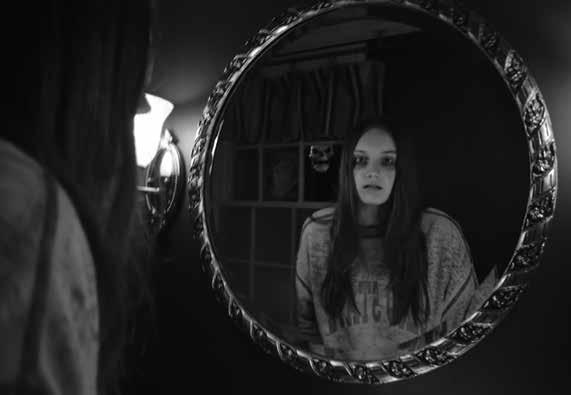
I looked in the mirror today. It looked back at me. I avoided its eyes. It looked away when I did. It is me. I am it. We are one. But still, I avoided my eyes.

 ALEXIS EVERETT ’24
ALEXIS EVERETT ’24

It’s hard to keep track of the endless hours I have spent locked in my bedroom closed off from a world I have no desire to be a part of. The world that is exciting, inviting, and packed to the brim with opinions, words, laughter, experiences, and fun. But, contrary to many, I crave locking that door and keeping it locked until I am dragged out. See, I believe that the moment when I am given one more breath before I am pushed underwater is a rarity. I don’t know when this insatiable need to bask in my own presence started, but the feeling of it is too good to let go, I am addicted to it.
I am alone in my bed. I am still here, caught in between moments of tranquility. I speak to no one and no one speaks to me. I look at my walls, sit in my thoughts; these are the only forms of entertainment that I need. The only sounds heard are from those who I consider to be “outsiders.” At this moment as I lie in my bed with my ears horizontally across from my door, even from a distance I still hear the creaks of the hardwood floors as my mother floats across them, her gulping noises as she drinks her ice cold water, the relentlessly insomniac crickets outside who seem to have no intention of settling their chirping come morning, and my father locking all of the doors hours into the night. From my room, behind my closed doors, I am still an observer, I feel the moments that occur around me, I hear and see them. In my solitude, I am alone yet surrounded. In my room I am able to listen so closely to the slight crunch my mattress makes as I curl my toes into it. I notice the way my world map is slightly misaligned. I feel the slight chill that comes from the air vent below me. I am in a state of serenity. Here in my solitude, I am in charge, I determine reality. I listen out for the loud silence, truly wallowing in it. I notice the sounds around me, but in the room with just me, they are nonexistent until they serve a purpose.
My fingertips run across the spines of the books lined up perfectly on the bookshelf part of my nightstand. I love this feeling. The feeling of a whole world of ideas right at your fingertips, ready for you to pick it up and dive head first into them. My hand shifts to touch the leather bound notebook and felt tip pen that I lazily threw the night before onto a disregarded pillow left on the floor. At this moment, I desire nothing more than to vanish into a world filled with comfort characters, scribbled words, charming settings, passionate thoughts, and recreated dreams. My brain is completely unaffected by the noisiness of the world. In this room, at this moment, it’s just me, my books, and my writing. I could stay in this little, cozy bubble until the end of time if I was given the chance. There’s nothing more that I need in order to survive. I would tune out the world forever for this, even if I missed a lifetime of memories in the process.
This silence, this aloneness, these moments where I truly get to sit with myself are where I grow. In this space, I am forced to sit with the mistakes I’ve made, the people I’ve hurt, the people who I have deliberately and intentionally stabbed in the back, sob over all the experiences I’ve had and ones that I missed because I was too scared to try, scratch away the uncomfortableness that I feel when I am with people, I go back in my head and replay the constant lies, think about the times I have cheated myself in order to be praised. Here as I sit alone, I come face to face, eye to eye, heart to heart with the true Alexis. The one who has messed up well over a million times, but is still slightly perfect in her own messed up way. See I have described the tranquility, the disturbances, joys, and anguishes that I feel when alone, and I know to many it may seem like a contradiction. But the truth is that in my solitude, I am in a state of tranquility and chaos simultaneously and it is beautiful. Aloneness is the only way I get to see the true me, so for as long as this remains true, in my seclusion I trust.

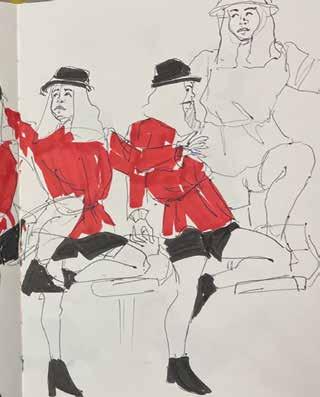
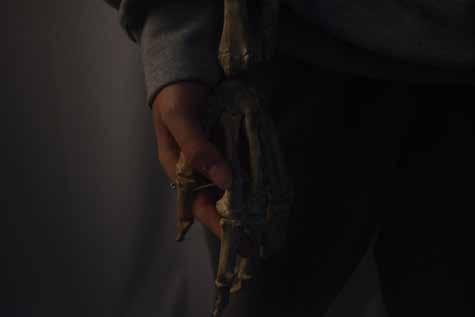
When the moon hangs low, I buy red vines at the movie theater even though they taste like swallowed bubblegum.
When the moon hangs low I point it out to my mother, but she is nose deep in Steven Spielberg’s Wikipedia page and does not look up.
Regret sticks to my ribs like oatmeal. Like a street beggar, there is always something muttering and mumbling under my breath but I do not let it out.

Like a beggar, it claws at me in the dark but I wrap my coat tighter around myself and pretend I am on the phone with someone waiting for me at home.
One of my closest friends has held the place of Kindest Boy since we were four years old. I remember how to get from my house to my first-grade best friend’s, but she doesn’t live there anymore.
Left turn, two rights, a left, and a stranger would open the door. I used to be jealous of the signed Justin Bieber posters above her bed. Times change.
I fall in love with stubborn girls who have torn fingernails (they are always heartbroken) and boys who squeeze my shoulders to say hello (everyone is heartbroken).
For now maybe it is a privilege that my biggest regret in life is not setting an alarm and driving to the airport last January. It doesn’t feel like one.
When the moon hangs low, I think that if I pulled out the ladder from our shed, I could probably reach it.


Ding, Ding, Ding, Ding
A tiny bell choir emerges from her phone
The ringing pulls her closer even though she has work to do
She has a list, a whole list to complete
But there’s a small voice telling her maybe not

That small voice grows louder as the clock moves forward
That stupid clock that seems to be waving its hands in her face
Taunting her with the fast progression of time
The slow progression of her tasks
That tick tick tick of the clock
Pounds her skull with the intent to agitate
The tick subsides with the arrival of something else
The voice has brought in reinforcements
The voice’s friend tells her she’s lazy
She should be done by now
What’s taking her so long?
A wave of fatigue seems to silence the voices
But only for one everloving tick of the clock
The voices join together singing a cannon of pessimism
Sleep cannot come yet, her list is still incomplete
Sleep cannot come yet, she hasn’t earned it
Sleep cannot come yet, her peers are working harder
On and on the voices sing in disarray
Like some kind of sick lullabye
There’s no way she can finish everything
The dark has consumed the hopeful daylight of yesterday
In a couple hours, she will compete in another day of lists
Another day of tasks
Another day of ticking
Another day of voices
Sleep finally takes her as she dreads the next day
One task, only one task is checked off
 KATE HILBERT '25
KATE HILBERT '25
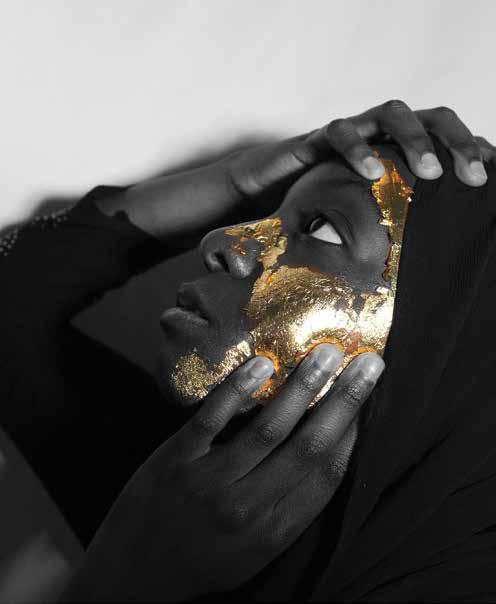
Constantly I’m overlook’d, like I’m a diary that holds other people’s thoughts. Thou treats me as a barren, forced to listen as I bite my tongue. To listen or to be heard. Either results in disdain. I must either filter my speech or risk losing my sanity for a single phrase. I find myself stuck, stuck in between conscience or false arrogance, derived from my mis’ry of being silenced. I am known as fair and honest, what better thing to wish for a woman, if only she weren’t a fraud? I am a rotten fruit, passable from the outside but turning bad from the inside out. I am hidden, in hopes of not letting my rotten self be discovr’d. Or am I in plain sight, standing around people that refuse to see what they created? To be fair and ignorant or lack of and esteemed. I find myself showered in loneliness, drowned by the mouths that fill the air with noise. I’m silenced, for a fish cannot be heard when they are in so deep. If only my dear Hamlet could see me, understand me. The only cure for my mis’ry is to be heard and indeed I think I shalt give up. For a goal is only a goal when possible and a dream is only a dream when uncertain. And I, poor Ophelia, am a dreamer.

The old and thewise avoid the belief in dreams, As they’re internally scarred by the red river screams. They stay here, in practical minds, to safely watch how the sons rise. Whispers say that ambition and daring cause one’s early demise But I see the sky, its infinite wisdom, renewing its alluring call. Only I, a young dreamer, will risk the urge to fall. Oh fire and red, stop burning my skies. Please cease your rage and listen to the cries.
There I see my broken dreams
Scattered inside an infinite blue screen. And when I dream of being one with the sky, Perhaps I’ll jump and hope to fly.
And there is my people, huddled in fractures, Who crossed the blood river to escape brutal capture I see their eyes, so heavy and frayed When they depart the shanty milk mill at the end of day.
Through a hole in the roof, I see an eager son, Who anxiously proclaims his jumbled words in tons But a scattered image of me in the clouds appears, The sight of me floating, a crowd below in cheer. There’s a lovely companion,standing alone, whose eyes drew me in Awarning of many temptations lurking within.
Yet I want to float away and find a place of land, But perhaps I Couldn’t expect her to understand.

The decision to act came then and there
While secretly fearing what message I prepared to share. And then, below, I saw a son, And I saw not a coward, ambition not undone
Yet I was in the air, a wingless bird, trapped beneath a rainbow As a crowd had gathered down below Was I trying to escape? They may believe so.
My son had risen, standing proud, his flailing arms up and waving. I refused to let him transcend the path I would soon cease to be paving. And then glistening on the Caribbean Sea were sharp gold crescents of sun So when I let go and the wall of sunrise glossed my face, I saw a blue door opening an infinite dreamplace.
30 Yawn by Ava Beredo ’23
31 Khadija by Ida Rausche ’23
32 Golden Fractures by Zoe Bennett ’23
33 Lost in Feeling by Alexis Everett ’24

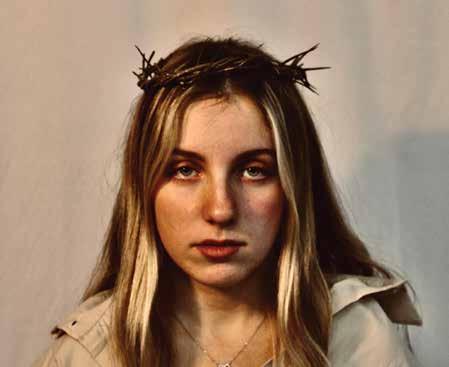
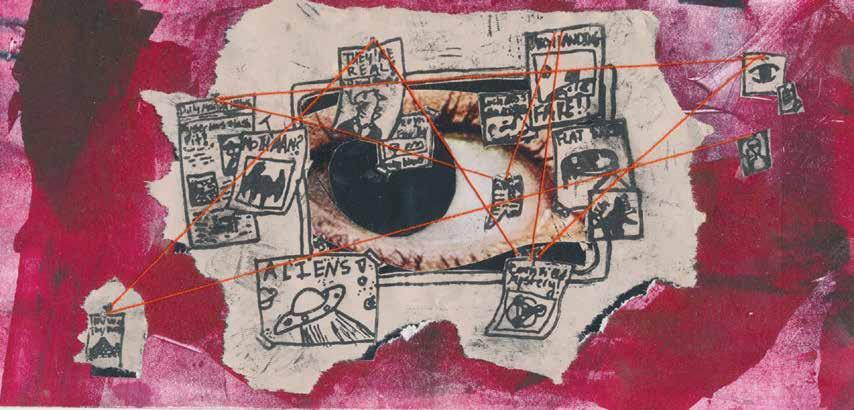
Massive, teal waves crash against the rocks. Grainy sand wiggles its way between my toes. The wind whips through my hair, blowing it in a million directions across my face. Children run down the beach racing the waves, shouting with glee as the tide chases them back to the shore. As the waves come in, they swipe away the sand on my feet, leaving in their wake a smooth path of wet, sparkly sand. The water crashes and retreats; it is almost as if the waves are beseeching me to follow them back into the ocean, out into the endless waters.
I have loved the beach ever since I was little. I fondly recall spending entire days, from sunrise to sundown, constructing elaborate sandcastles with moats and bridges with my brothers and sister. My mom called me her little “fish” because I would refuse to get out of the water until my hands and feet were pruney, and the sun had set. I spent many delightful days at the beach soaking up the sun and enjoying the freedom of running along the edge of the water that seemed to have no end. The beach was my happy place, despite the fact that I would usually get sunburned from my head to my toes!
As I have grown older, my love of the beach has remained constant, albeit for different reasons. While I still enjoy building the occasional sandcastle (now they lack moats and bridges), I prefer the simple delight of walking along the beach, allowing the cool and refreshing water to gather around my ankles. As the glistening, white cap waves crash onto the sand, and then retreat back into the endless ocean, a sense of calm tranquility envelops me, and my stress is magically washed away.
IN MANY JOURNEYS, A MOMENT COMES WHERE THE PAST DRAGS OUT BEHIND US, WEIGHING US DOWN.

My sister is everything I am not: decisive, loud, stubborn. I was often the softer and quieter one, and growing up as young girls, my docile traits were often rewarded over her more tenacious ones. Thus, these gentle characteristics followed me throughout middle school, and they were met with the praise of parents and classmates alike. I found a quiet power in my perceived “obedience” and “coachability.” I thought such praise from adults afforded me more opportunities than my less compliant sister.
That all changed when we moved to an all-girls school in junior high. The girls were outspoken and ambitious. I didn’t understand their fiery attitude at first; they seemed to have all the traits that were looked down upon my

young girlhood. They openly contested ideas they didn’t agree with and weren’t afraid to break outdated rules. My sister took to this new and vibrant world with ease, joining the scatter of opinions and independent thought. I, though, clung tighter to my reserve at first; it was in my nature to find the most diplomatic answer that would appease everyone. My tactics lost their sway in an environment where courage and originality were rewarded over conformity, and my classmates’ passion slowly lit a fire in me. The girls around me weren’t afraid to challenge conventions; they didn’t aim to please as much as they did to dare. They dared to be remarkable and rebellious young women. And I decided to raise my voice and join them.




last monday, i died. you could see my veins through the ice on my skin, my fingers turning blue with frost.
i was in a field, abandoned and alone. the haze from the morning dew covered the grass, leaving me unseen.
yet still you found me.
there was a fire in your eyes, glittering and copper, you burned a thousand suns undone by grief, alone once again.
i wore a lavender gown, you wore your nicest button-down you were empty, a shell of who i knew. your eyes were blank, almost like you were dead too.
it wasn’t supposed to happen like this — your fire wasn’t supposed to go out too.
what happened to our promises, of white dresses and diamond rings and no stupid tears on the day?
is it my fault?
maybe i should have stayed kept your melody with mine for a little bit longer but my time was up. i belong to nature.

you are not mine and i am not yours.
you can see me in the trees, feel me in the moss. but no more lavender, no more white dresses.
i guess this is goodbye.

Last June, I picked up Devotions: The Selected Poems of Mary Oliver on a whim. I remember being wholly consumed by the simplicity and elegance of Mary Oliver’s writing. I basked in her admiration of the natural world, and I dreamt of cultivating the serenity she spoke of. This fascination urged me to read most of her collection outside. Her poetry captured a quiet, turning world that was unfamiliar in the early days of isolation.
There is a peculiar joy in allowing yourself to be devastated by good poetry. I often look forward to the end of my nightly routine, where I can run my fingers over stanzas in the honeyed glow of my lamp before I close my eyes. A vibrant, hidden world lives within every poem- a world we can only join for a moment. Poetry offers me a chance to absorb the leavened creativity of someone else. It evokes my deepest fears and hopes, and that is what I suppose joy is: an undeniable aliveness in the terror of self discovery.
Poetry asks me to let go of that fear and to dance with new ideas- to relish in and wrestle with the inevitability of change. My pulse quickens when I encounter imagery so vivid, I could almost reach out and touch it. This surreal literary form opens a door through which I can vacillate through my internal chaos and find joy on the other side.


The next morning you asked me how my night was, I responded, “good, it was fun.” But I never told you this story.
Years ago, naive and innocent, it was another one of those last minute nights. Not knowing what the night would hold, the go-to story was nothing but a facade, covering up the unknown outings with inevitable outcomes of a stupid mistake. Getting food and playing games solely to pass the time before dark, like werewolves we waited for that sun to set, and for the anticipation of the “nothing good happens past twelve” to settle in.
small talk and a couple dozen episodes of The 100 play in the background. Just a bunch of girlfriends watching some random show, naive and innocent, or bored and waiting…
Then we realize it is that time, and someone gives the go-ahead, too late to go back to do anything. Loose, maybe too much so, we do some late night karaoke, and let the night grasp us and take its course. Mistaken stupidity. Making our way to sleep, it’s 2 a.m., and that inevitable has caught up to us. It’s all wrong, that was not how it was supposed to go. I cannot help but feel this pit in my stomach, and my mind churns fake excuses for the normal, go-to story, nearing its consequences. We stare at each other, blankly, chaotic, alarmed, all at the same time.
We were just young girls, naive and innocent, idiotic and influenced by the grasp of the night. Eventually, finally, it is all over and we’re back asleep. The regret settles in, it’s too late now, unofficial sworn to secrecy.
Morning comes around. I venture home, open the door, and they ask me how my night was. I respond “good, it was fun.”
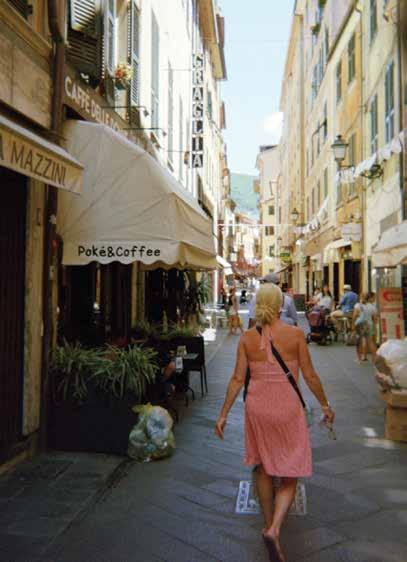
My generation is one of questions. Why do men build trenches in our fields? Destroy our homes? Why must we move to a new home, One that is strange? Why is all this happening?
My generation is one of broken innocence. Axis and allies roam our cities, Making themselves known to all. The friends I once played with Gone.
The noise of sirens and explosions Filling my nightmares.
My generation is one of progress. Two sides are known but Only one is taught to us. We practice drills, Hide under our desks, Just in case bombs were to fall. Like rain.
My generation is one of fear. Fear to go to school the next day, Because strangers are allowed to enter, And play Pumped Up Kicks. The sense of security, Never existing.
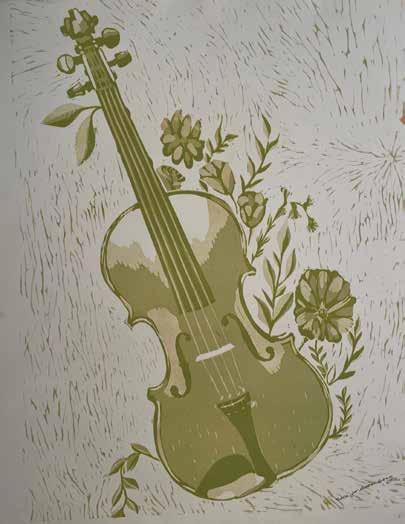
My generation is one of hope. Where a girl can sing Let It Go In a bombed subway. Or where a boy can hug his friend. When a mother can kiss her child At the end of a school day.
A place our generation can be ourselves.

EMMA
maggots, such things i feel embed into my skull passions once so prevalent, so eaten away a spring of thought now become so dull sunken beneath the layers of wilt and a voice so loud speaking of guilt a flicker burnt out and a drought in the mind the desire for peace flourishes in bloom for the absence of limbo to cure the malnourished so what once was, is
She (Woman) I by Sofia Dewey ’23
13 She (Woman) II by Sofia Dewey ’23


When I was in the second grade, a strange woman with glasses and curly hair poked her head into the classroom and called for me. I walked out of the room with her, leaving the innocent and fun seven year old version of myself behind forever.
They told me I was “special,” “gifted,” “talented,” and so on. That I had the reading level of an eighth grader. That my math scores were off the charts. That my brain was different from others.
At first, I didn’t know what to do with this information. It’s not like I
way I was born. But soon enough, I realized that my “giftedness” was just that: my gift. I may not have been the prettiest girl in the room, nor the most popular, but at least I was smart. on. That
and every morning. My “giftedness” became my constant, the one thing I was proud of, my everlasting companion in the chaos that was my life.
And so, I began to tie my worth to my intelligence, convinced I was nothing more than numbers. The numbers of my scores on standardized tests, the numbers of my reading level, the numbers of the grades I got. The numbers consumed my every thought, until they were all I could think about.
By middle school, I had no idea who I was outside of my intelligence. Sure, I did martial arts, ran track, and hung out with my friends, but those were simply things I did on the sidelines. They didn’t define me. Nothing defined me except for my “giftedness.” Not my family, not my friends, not my background, not my personality, nothing else. Just my “giftedness,” the label I was stuck with since that day in second grade.
I continued to obsess over my grades and scores, sure that there was nothing more important in the world than being smart. After all, if I wasn’t smart, what was I? What was left of me if I no longer possessed the “giftedness” that I could always count on? Who was I if the one thing that kept me tethered to the world, that prevented me from floating away, was gone?

And so the cycle continued: wake up, go to school, go to the gifted program, eat lunch with my “normal” friends, go back to being smart, and repeat. We read And Then There Were None and were assigned the task of analyzing fifty character quotes, writing a comparative essay between two characters, and examining the reason Agatha Christie wrote the world-renowned murder mystery. All of this while the rest of our class read The Westing Game and collectively filled out a packet.
All I knew - all my world was made of - was being smart. So it came as a shock when COVID struck and the world suddenly became preoccupied
with staying alive and well rather than hours on end with nothing to do besides online school. I was terrified; the world felt
control. Thus, I turned to the one thing I could always count on: my “giftedness.” I spent countless that every letter and number was written perfectly, became my coping skill, now more than
I spent hours reading books and doing Algebra, constantly trying to attain COVID was getting worse, that more people were dying, and that it didn’t think of those things.
And so, I got through the pandemic. I didn’t give myself time to process what was happening and I threw myself into distractions, but eventually it all worked out. Although it wasn’t completely over, COVID was getting better, the world was starting to return to normal, and school started back up in the fall.
Yet, I was stuck. The years and years of tying my self-worth to my intelligence, grades, and scores had eventually caught up to me. I was burnt-out, and the idea of getting out of bed just to go through another torturous day of school was unimaginable. Every night, I lay in bed, telling myself that the next day would be different, that the next day I would jump out of bed with an enthusiastic smile, go to school with a happy and content feeling in my heart, and come home ready to do it all again the following day. And still, every day I felt the same.
I had no idea who I was; I wasn’t pretty, popular, funny, or any of the other desirable qualities of a teenage girl. My life consisted of the same actions repeated over and over: wake up, maybe eat a bite of breakfast, go to school, sulk around in the gifted program, go home, do homework, go to sleep, repeat. It was monotonous and boring, and I was done trying to be perfect. All my efforts to stay intelligent and “gifted” had whittled away over the years, and I was left with no urge to be the best, no need for my “giftedness,” no want for any sort of uniqueness or intelligence.
As I lay in bed one night on a snowy, winter day, I had one thought in my head and one thought only: Screw you, gifted program.
Hydrangeas share a history of tracing my family name. My grandmother, the keeper of breathing colors, introduced me once to permanence: oranges & pinks weaving tightly around her fingertips. Her buds mistake green for canvases and paint ecosystems upon their stems: reds, blushing for the nearby man and inheritance ruby rings, purples, grieving retiring skies and chipping walls left far behind. Blue ridges line yellow centers of tempting nectar or buried stars; she carved constellations with wooden wands and arranged bouquets with fallen scars. Hercules, Aries, Hydra, Orion, she plucked men among the stems, snipped and tossed the yellow suns from aging petal rims. Look here, she called, see what trimming can save? Hydrangeas share a history of saving my family name.

15

I look into your eyes
Dark, unforgiving
And I see no soul
No ounce of emotion
No human being
In your coffee-colored irises
I look at your hands
Which are made to embrace My fragile body
To wipe the tears
That roll down my cheeks
Yet I have rarely felt
The pressure of your palm
On my back
Or your fingertips on my face
I look at your hair
Which looks just like mine
Yet is drastically different
It is harsh and pin-straight
Made to be controlled
While mine is soft and wavy And bounces as I move
I look at your mouth
Where the kisses
On my forehead
And the words of gratitude and love Are meant to come from
Where I should see a content beam
Or even a simple grin
Yet all I see is a tight-lipped frown
I look in the mirror
At the person who loves you
Who will do anything for you
Who has sacrificed themselves
Just to please you
I see the reflection
Of a person who does not receive
What they give
Who you treat like a clear window
Transparent and non-existent
And at times
An obstacle that hinders your life
It protects and serves you
But you look the other way
Never giving it the recognition
And love It deserves
I see someone who always said
They would take a bullet for you
But never thought
That you would be the one to shoot it
14 Botanical Gardens by Natalie Crowley ’23 15 Purple Majesties by Liza Weinberger ’24MUNA AGWA ’23
so I decided to reach out and grab it. Its language thawed in my hands; an excruciating sort of exercise met with the warmth of discovery. Like reaching out to touch light and tasting liquid gold.
Some poems refuse to neatly tie up their laces, parading across the page, stanza spilling into stanza, line crashing into line, until there is no more page, no more ways to say the same thing. Stubborn things: they stalk and pounce.
But
what is a poem if not a person?
A colorful story that runs into you on a street corner, a shy grin that beckons you closer, a silhouette that lazily dances across the kitchen tiles, a sad thing, swinging along to slow sultry 60s, a living thing,


a strange thing, a beautiful thing, a lost thing. a free thing.
What is a poem if not a puncture wound?
A eulogy for what we set free.
a poem is a prayer
and a prayer a revolution.
16 Beacon Hill by Saija Shah ’23 17 Through the Mirror by Sophy Gao ’23And there it was…. In all its glory. The tiny log cabin stood right under the dome of snowy evergreens. Each frozen tree tip curled over towards the steaming chimney of the cabin… seemingly trying to warm up. The constant flakes of ice and snow seemed to fall right onto the roof, adding to the foot of white fluff that already relaxed on the logs. On the base of the cabin, bright snow mixed with fragrant pine needles cradled the edges of the logs. It seemed like everything was attracted to this cabin. The tree tips, the snowflakes, the perfect snow. Why? Was it the warm tone of the oak beams against the crisp cold, the comfortable aura shining against the lonely forest? Or was it the very fact of its difference? Its very bizarre presence confuses things. The trees are not used to curling towards a mangled version of itself. The snow is used to falling to the ground. The air is comfortable breezing through the woods without interruption. The cabin’s simple yet delicate details had puzzled the very essence and flow of nature. The cabin’s uniqueness and details drew every aspect of nature into one pinned point. How would you feel if you found this cabin? Personally, luck would be radiating through my cold fingertips. The luck of discovering something so rare, so interesting and beautiful. Its very uniqueness is enough to confound mother earth, someone with a mind matured over 4 billion years. Truly spectacular. I believe the same concept goes for people. Only unique minds have the ability to disrupt things already set in place; challenge authority and change mindsets. And as cliche as it sounds, every person is unique. Everybody has the potential to disrupt. Every mind is special and contains the thoughts and passions that have the power to disrupt and grow into something beautiful. Something like the cabin in the woods. There are many cabins in the world but the ones with the courage to stand out are most noticeable. So, stay true to yourself and your mind with the thoughts bound to disrupt the world. Have courage and never, ever, be afraid of uniqueness.
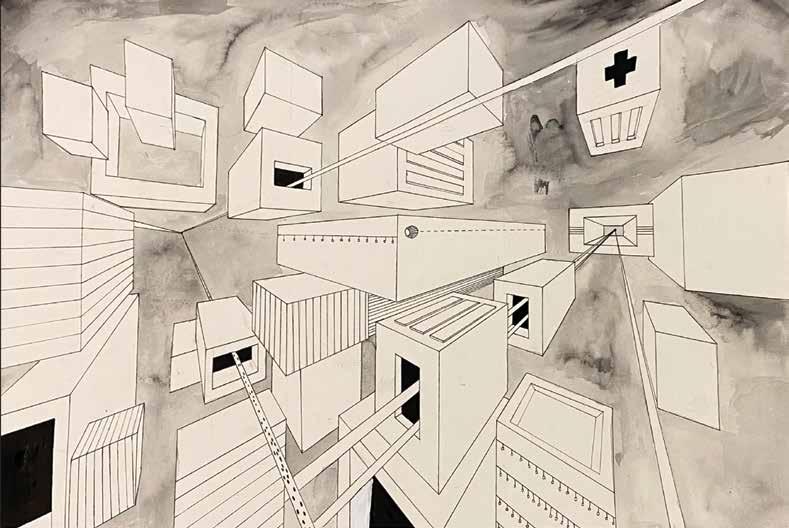
On the rare occasion when I think of my old home, the most distinctive feature that comes to mind is not the gray-blue plastic shingles that looked like my father’s eyes or the cramped kitchen of scuffed linoleum and cheap oak cabinets where my mother would make me rice noodles with vegetables after a long day at the park, but the plastic green chair that sat on the smooth asphalt of what I considered the divide between my neighbor’s home and mine. Really, this was my neighbor’s driveway but an older, childless couple who enjoyed my antics, they let me have my fun riding on my Hello Kitty scooter and chasing their orange tabby Rudy down the black road all summer long so I consider it a part of my old home.
It’s interesting that the chair was the first thing that popped into my head when I thought of Tioga Trail, especially considering that I’m a sucker for the finer things in life. Nothing is special about that chair. It’s an ordinary, plastic army green chair you can buy at the Dollar store with pocket change or that you may see on the patio of a cheap, wooded motel scarred in peach juice and cigarette burns.
However, the positioning of it is what’s intriguing, even characteristic of it. It sits right smack dab in the middle of the driveaway, thus hindering my neighbors’ cars from ever abandoning their home, and faces the street. Now, in the place I used to live, the houses might not have been very large, but the driveways were very long in my young eyes, so sitting where the chair was, you would have to holler for the passerbyers to hear you. There was virtually no advantage to the location of this singular chair. I questioned its purpose and often voiced my queries to my neighbors who would laugh, glance at the chair as if they had forgotten its existence, and plop right down in the chair with a cold one in hand.
Rudy, the aforementioned tabby and their youngest cat, often sat under the chair as if the chair provided substantial shade for a hot summer day. Rudy is probably the closest I’ve ever gotten to owning a pet, besides the fish I won at a carnival that died within a day. Rudy was so playful and sweet, maybe not the brightest tool in the shed, but nonetheless, a perfect companion. And the best part of “my pet”? I didn’t have to clean up after him or feed him or take him to the vet – I just leeched off the benefits!
Rudy was an outdoor cat, so I took him out on his frayed navy blue leash for long walks after dinner (by myself, mostly, or sometimes with Kathy and Rob, who both smelled of garlic and must) and fed him from an oversized bag of plastic cat treats that lay on the side of my house. On our walks alone, we would roam the lakeside and run around the neighborhood park barefooted and on lazy summer days, we would lurk in the rosebed to smell the beautiful flowers and sometimes get a rose thorn here and there. Occasionally the neighbor boys, a few years my senior, would join us on these evening walks. But they smelled like urine and grape soda and liked to torment Rudy with little tricks, so we didn’t invite them all too often. But outside of my time with Rudy, I did spend a lot of time with these boys, Dom and Ryan. They treated me like royalty and I… I was quite dismissive of their gestures. In the small window of the inter summer fall period that lay on the verge of August and September, when the weather held the benefits of both seasons, we would sit on their porch and stuff our bellies with fudgesicles as we talked about trivial kid things and watched the sun disappear. During the day, they would drag me in a little wagon in their driveway and we would race each other down the street and do other fun,
normal little kid things. I really liked their house. Pale yellow, two stories, complete with neat, ornate white trim… it seemed like they lived in a very fancy place. I had never actually gone inside though, so I wouldn’t know.
Dom and Ryan lived two houses away from me. Between us lived my other neighbor, who was also quite old. She lived alone, a widow I believe, and her name was Ruth. Her whole house looked like it had come out of a Pinterest board of sea decor. I just remember that it was always nice and cool in there, so Dom and Rob and I would rest there when we were tired. Her kitchen had stairs go into them, and the fridge was always stocked with root beer, and she had a pseudo second floor and a nice dining table (often topped with freshly baked snickerdoodles) where I showed her a totem pole I had designed in the first grade, and that was about it. Ruth always smelled very heavily of perfume so whenever she would hug me, which was all the time, I would smell nice afterward too.
We also did a lot of things together. She, Kathy and I would take walks to the lakeside when I wasn’t out with Rudy and I would tell them about the cool new Barbie books I saw at the bookfair at school that I really wanted (and they would give me a few bucks each). Then they would tell me about their glory days as they longingly eyed my lean, tanned legs dressed in bright orange flip flops and denim shorty shorts. And when I started playing soccer in Kindergarten, Ruth, my dad, and I would pass the ball around the yard after dinner or they would chase me around the uneven, dried grass as I weakly kicked the ball into the flimsy net.
Despite the fact that I have played soccer for ten years, I actually never liked playing soccer. Even on Tioga Trail, especially when it was just me and my dad. He would get mad at me a lot, calling me an idiot and scorning my distracted nature and telling me to stop picking the bark off of the two tall oaks that stood a few feet apart from each other in front of our house. In those moments, I would either cry and run to my mom inside, cooking in the kitchen, or frown at a squirrel running up the tree with an acorn, wishing I could be that squirrel rather than a soccer playing child.
I also felt this way when I first learned the violin inside the walls of my old house, but the only difference was that I would scream at my mom whereas I was too scared to ever talk back to my dad. My mom and I bickered over everything concerning violin, from how to actually hold it to what musical interpretation I should have of the piece and oftentimes, my teacher would end up correcting us both. It was these years that I experimented with where I should practice in the house and decided that the hallway that extended to from my parents’ office, where I would sit on Saturday mornings listening to Itzhak Perlman on the old Windows computer, down to the open living room with the abstract rug my parents bought from Home Depot would be my permanent practice spot. I learned that hallways help with projection and from there on out, I never once stopped carrying my wiry red music stand to the middle of the hallway. Even if it meant annoying my dad trying to get in a few extra minutes of sleep in the bedroom next to where I practiced or my mom brushing her teeth in the bathroom on the other side of the hall.
But probably the heart of the home, consisting of dark, unlacquered wood and a mess of Fisher Price toys, was the living room. Here, I would jump on a pile of stuffed animals atop my mom or dad and I would sit on the
couch reciting times tables or I would read under a blanket, eating sliced apples and reading my advanced chapter books under the yellow lamp light as I thought about how I was the perfect mix of a girl (energetic, sweet, and funny and intelligent, introspective and observant beyond norm). Christmastime, my family watched Frosty the Snowflake (the classic version, of course) and other specials for hours on end with hot cocoa in our hands and I would dance around the Christmas tree that dotted the ground with pine needles with my father, sporting my pink baby blanket I forced him to don as a skirt, and I would record my mom with my iPod touch as I pretended she was Santa and my Care Bears were children asking for gifts.
My last night on Tioga Trail stands out most, from all of these odds and ends I label as memories. The boxes of all our possessions, our every moment in this building, were closed up with packing tape. Everything we owned fit inside of the bare living room, which shocked me. I watched Alice in Wonderland (the 1940s version) and gloated that I had done a better job portraying the caterpillar in my summer theater program than the cartoon caterpillar as my dad prepared a new food, potato latkes, which was rather comforting for such a cold, biting December evening. When I ate dinner, I thought of all the other delicious foods I had tried in this kitchen before. Grilled cheese after visiting my grandma with the broken
hip in her nursery home and tomato soup – though not together, that wouldn’t be for another few years – after visiting my uncle on a dreary day when I had an ear infection and getting a quarter from my ear and a healed ear from that encounter, PB and J for the time my dad was making chili and it was taking too long and I was hungry, and during some lunch not too long ago, cream cheese and peanut butter on a log of celery (which isn’t as bad as it sounds). Later that night, when it was time for my bedtime story, rather than rolling around on the foam letter carpet or doing handstands or scouring around my dollhouse for a toy to tinker with (partly because none of that was available, but mostly due to the fact that I actually wanted to listen tonight), I snuggled next to my dad in bed and listened to the story. It was Tangled. She had been taken from her home too and I started to cry because that was how I was feeling and then fell asleep. That was the last I saw of Tioga Trail.
19 Fred by Caroline Marsh ’25
My shoes strain against the width while the others simply squeeze.
I have my mother’s feet and she has her mother’s feet too.
“Box-shaped,” “Flat,” “Funny-looking” are the words that have been used to describe my feet. My feet carry the miles my mother and grandmother walked.
From Brooklyn to the Bronx and from the Bronx to East Cleveland, from East Cleveland to South Euclid and from South Euclid to Lyndhurst and back home.
My feet tell a story, one of victory and one of despair.
The cold concrete with cigarette butts that lay to the side have met my feet.
Congratulated them with scrapes, bruises, and scabs.
Have scraped off neon pink nail polish and skin. The ground has seen me all.
My feet bear the weight of the world and still walk and run.
They slap the ground when I reach out for the prize. The prize that changes so often.
The prize that sometimes changes when touched. My feet always carry me home to the place where both good and bad memories lie.
My feet say all the words I wish I could have.
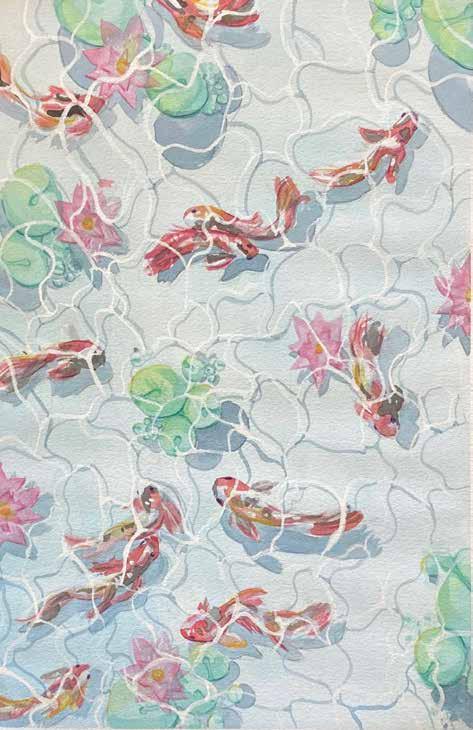
Steady braids hanging over a Christmas bridge
The boats shone their headlights away from the sight It wouldn’t be long until spring laid down its mist to repent for winter’s losses
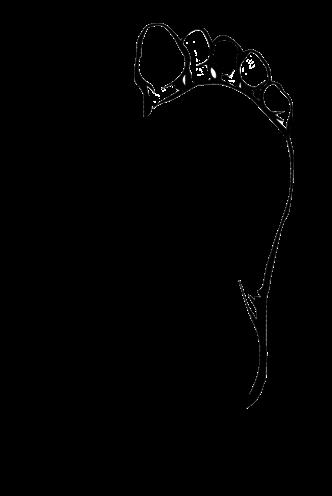
They shook out the buckets but there was no harvest In pebbly yellows and fruit juices they repaid their ancestors
The eternal watchers
Heaps of eyes rotting in piles in the village Only an apple-happy child would dare to pick them like flowers
Her basket sinking through the bog
Horse-hair clean as a whistle.

I thought of you today, feeling through the crate of red things, and how you always checked for freshness.

Like the best judge of character, checking for signs of life. You loved this skin-bound vessel before she knew her name. You kissed her feet, her hands, her stomach, her face, before starting all over again. I first saw the world through your eyes, pressed into the warm space between your belly button and your back. Before I knew you, the best judge of character, who saw signs of life; I was the pulsing blip on the radar. I thought of how to taste the hues. Light to dark. Bitter to sweet. The dark is sweet. Brown sugar eyes. Quiet like vellus hairs.
Like my bare face against yours; a language too thick for words. A heavenly sense of love; like a tomato seed embraced in the canopy of pulp.
I sink my thumb into the flesh like you always did, and wait to watch the dimple form. Though I am head taller now, I am home in the crater of your arms. Take me home to the crater of your arms.


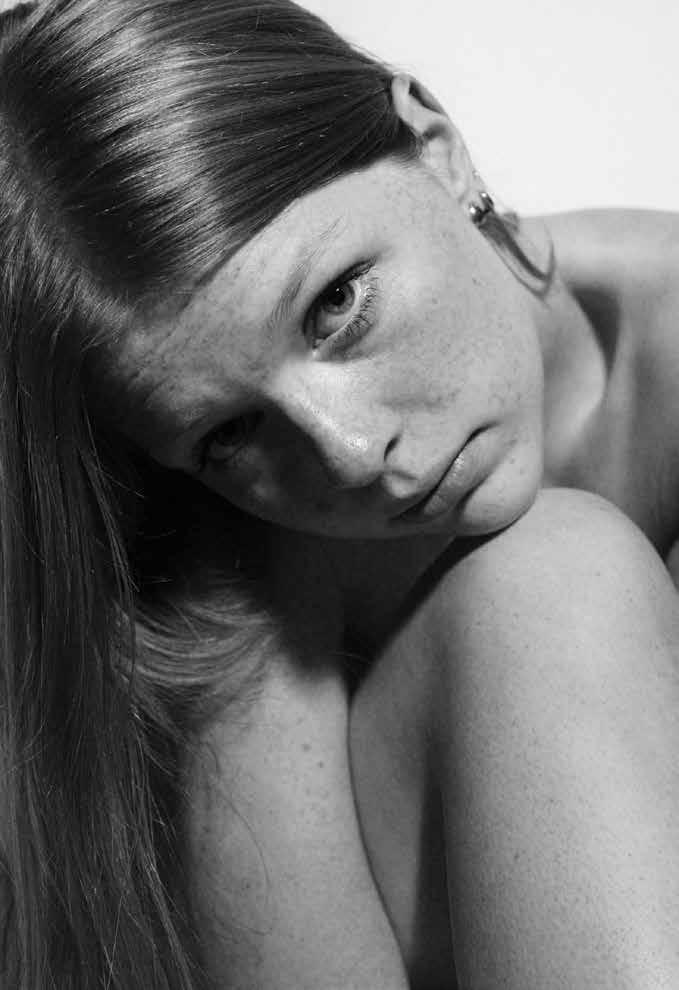
When we cook in the kitchen with our loved ones, we create memories that last a lifetime. Every time I patiently stirred the pot of chicken soup with my grandma, we mixed in memories and created stories to share with future generations.
I jumped out of bed at the crack of dawn and rushed down the stairs, skipping every other step until I reached the kitchen, knowing that my grandma would already be up and moving. Just as I had predicted, my grandma was sitting at the kitchen table waiting for me! Upon hearing me pound down the stairs, she rushed towards me and embraced me in a great big bear hug, drawing me close and planting a kiss upon my forehead. With my hand held tightly in hers, she led me towards the white marble countertops piled high with crunchy celery, bright orange carrots, fresh chicken, and white onions. A huge smile spread across my face as I realized that my grandma had bought all the ingredients to teach me how to make her famous chicken soup that she knew was my favorite. I was not simply going to cook soup; I was about to embark on a memory-making journey with my grandma. We were going to create memories that would stay with me forever and from which I would draw upon in times of stress. I would not be able to make these special memories from a bowl of store-bought chicken soup.
together, making memories that I would hold dear for the rest of my life. My grandma told me secrets and made me feel special because I got to spend time alone with her while my siblings were still sleeping. When all the ingredients were washed, peeled, and chopped, we placed the carrots, celery, onion, and chicken into the enormous soup pot and settled down at the table to talk while the soup cooked.
When the familiar aroma began to waft through the air and into our noses, my grandma headed over to the stove and ladled a little bit of golden broth into a small bowl for me. She asked me how it was. I carefully contemplated my decision, holding the spoon in my mouth for a long time,
When my grandma and I made soup, I served as her sous-chef and taste-tester. This is a memory that I hold dear. She patiently taught me how to craft the soup to perfection. I will always remember that my grandma valued my opinion and recall how my alone time with her made me feel special. She bestowed upon me the belief that without me, the soup would fail because I had the magical ability to determine whether or not it was finished cooking; I was the crucial ingredient to the soup’s success.
While it is certainly easier and more time efficient to buy prepared food that might replicate the “homemade” taste, purchasing pre-made food instead of taking the time to craft it yourself robs you of spending time and making memories with your loved ones. Food is so much more than something we consume for nutrients and survival; it is a vessel that holds memories of loved ones. The act of preparing the food allows us to preserve memories and legacies for future generations, while also making new memories in the present. If you pass up the chance to make food from scratch with your loved ones, you deny yourself the opportunity to create memories that will last a lifetime. My memories of cooking with my grandma and our secrets shared over soup are something that I will cherish forever.
My grandma handed me a peeler, and began teaching my five-year-old self how to peel the endless mound of carrots. My eyes widened in amazement and awe that I was finally learning how to make her mouthwatering chicken soup. I felt like such a big girl and very grown up that my grandma trusted me to make her special soup. The peeler I held in my hand was a magic wand that would turn the ordinary carrots into the magical carrots that made the soup so delicious. While I peeled the carrots, she chopped the celery, and we chatted and laughed
pretending that I was a judge on a cooking show and my vote would be the one that decided who won the competition. After much deliberation, I declared that the soup needed a little something, but I wasn’t sure what. Valuing my opinion, my grandma brought over the marble mortar and pestle and showed me how to finely crush a bouillon cube. After adding the bouillon to our soup, it was finished and ready to eat. The time that we spent making the soup was worth every minute; I had spent a half day with my grandma bonding over cooking soup, sharing confidences, and creating memories that I will have forever.
While most people look at a bowl of chicken soup and see it as simply a bowl of soup, for me, my grandma’s chicken soup is a memory of my grandma that provides solace during hard times. My grandma’s soup is my favorite food and allows me to remember her and to feel her loving presence when I am in need of comfort. As I taste the familiar mix of the vegetables and chicken and smell the mouthwatering aroma, I am flooded with happy memories of my grandma and the mornings we spent cooking soup when I was little. I am instantly relieved of any stress as I feel my grandma’s strong presence enveloping me in warmth and support.
LIZA WEINBERGER ’24My grandma’s chicken soup is a healer; it floods me with euphoric memories, while also calming me and reminding me of the magical mornings in the kitchen with my grandma.

Since my grandma passed away, my mom and I have cooked my grandma’s soup every Thanksgiving week so that I can feel connected to her and remember the joyful times we spent cooking together when I was little. We always make the soup in large batches to store in the freezer so that I can pull it out whenever I need comfort and connection to my wonderful grandma.
Food is how we tell stories and remember loved ones. Through cooking my grandma’s soup with my mom, we honor her memory. I will carry on my grandma’s legacy and share her story with my future children as we huddle around the pot, and I patiently teach them to cook their great-grandma’s chicken soup. My grandma’s chicken soup will always be my favorite food, not only because it is delicious, but mostly because it reminds me of my special moments alone with my grandma. Nothing will ever replace her soup as my favorite food because nothing has the power to replace my memories with my grandma and our magical mornings in the kitchen.
It is worth the time and effort to make chicken soup from scratch, as opposed to the convenience of a quick Costco run for their “homemade” chicken soup. Nothing can replace the medicinal process of making soup and creating memories that are stirred into every batch. Now, when I am feeling sad and missing my grandma, I make a batch of her chicken soup and all of the wonderful memories come rushing to the forefront of my mind and fill me with comfort. The magic of the soup is that if I close my eyes tightly, it almost seems as if my grandma and I are right back at the kitchen table, talking and laughing as we wait for the soup to finish cooking.
It’s good, just eat the brownie
SEEMA CASEY ’23


Tennis is the basis of my life. The core of all of the memories held within. Every day, since I was young, my parents would tell me to practice on the courts. Whether it was with other people or by myself, I would hit every day with my racquet and a ball. Practice, practice, practice, my parents would tell me. It is the core of it all. The courts were where I lived. The courts is where I practice and tell myself that it is a journey. Of all the people that believed in me, I believed in myself the most. Other people helped me on my journey, but I was the basis of it. Outside, inside, it was all within myself. I believed in it, and tennis believed in me. Whether I was with other people or by myself, the memories helped me since I was young. Most of the journey was by myself or with my parents, but other people were on the courts with me and helped me practice and helped me with my journey. All of the memories held were the core of tennis, the core of my life. Tennis was and is the basis of my life.

 SOFIA DEWEY ’23
SOFIA DEWEY ’23
There was a boy who hid on a rooftop, holding onto a dying rooster during the siege of Leningrad, waiting for an egg. Embracing my culture and all that bullshit. I worry that love is violence. I was raised up on my own and as such found a brood of brothers and fathers that I am always surprised by. My grandmother rejoiced in citrus like a bird migrating across continents and I didn’t understand until
pomegranates were out of season and I hated my homeland. I miss their hugs.
Of course love is violence. I fear that, like in every movie and book and commercial, They will only lie with you once you have exhausted yourself and offered up every bit of intimate secrecy and tangible dignity
(in the dark, but probably sometimes under an overhead light).
And if they will only be still afterwards to appease some feminine debt that you have Earned, Does retracing your mother’s steps and her mother’s steps (not mine, for they were wild women intent on leading inherently wild lives) really illuminate a familiar and wanted path? Is fundamentally imbalance love worth the violent comfort of tradition and stability?
And on the other hand, there was a hip middle aged couple at dinner on sunday salt and pepper and blonde, and they were obnoxious but towards the end of the night, for no particular reason, salt and pepper brushed aside the blonde hair and planted a big kiss on the fine line between cheek bone and ear. She didn’t take her eyes off of their dinner guests. Salt and pepper smiled at a pretentious
snowboarding joke and then kissed her again. For some reason I understood that it was for his own benefit that he did this, and when the blonde saw me watching, she smiled the smug smile that all women smile when they know the man they have chosen is wanted by others.
I was at dinner the day before when my brother brushed aside the dark hair of my best friend and kissed her cheek. Everyone averted their eyes. For some
reason these acts are supposed to be private, and when they are not, they are made private.
But to me, what was once an isolated kiss –smug smile provoking and personal – was something revealed to run in some fortunate boys’ genes.
So perhaps my hopelessness was made hopeful. A kiss on the cheek to make up for the patriarchy?


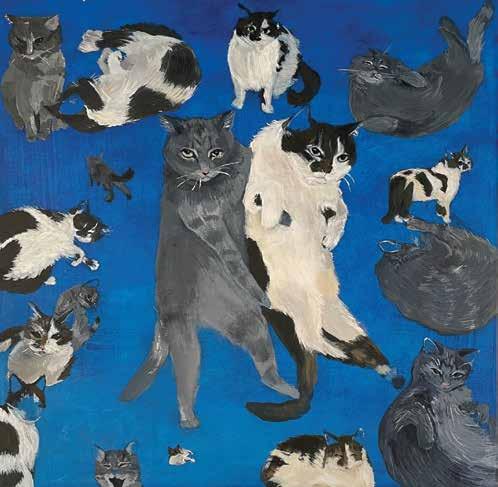

It is red here
But our hearts are grey
With a little blue inside
Blue for what we have, family too cold to be red
Encased in all the ashen grey Muscle morbidity
The red carnage, sickly sweet flowers
Smelling of decay
We are stirring
And we starving
And we are sleeping violently
We have lost
From winged women to a falling people Falling from the sky

And swimming babies
Swimming in the chill
Our time is contorted
Fiery wings
Suffocating in a swelling void
Bodies falling like ice from the sky
For cold things do not float
Where every birth is already a death
For even if we breathe
We are dead anyway
Nothing
Can warm a heart whose only choice is to be born
Grey with a little blue on the inside
It is burning here
Burning to pieces
But we are so cold
When I was 3, I dreamed of owning my own unicorn that would live in our backyard and take me on sky adventures every day. We would bond in our moments of flight and explore the nonexistent evergreens that took up the landscape of Ohio. When I was 7, I dreamed of being a professional ballerina who danced in The Nutcracker. I would live in a world filled only with spins, jumps, bruised feet, and beautiful choreography. When I was 10, I dreamed of becoming the President of the United States for the sole reason of me being able to boss my sister around. The thought of having the world at my fingertips and anticipating my next move excited me to no end. When I was 12, I dreamed of having a solid group of friends. The ones that I saw in movies, who had sleepovers everyday and did nothing to hurt each other’s feelings ever. When I was 14, I dreamed of being liked by everyone. I wanted to rid myself of the annoying and awkwardness that came with my existence and replace it with traits that people actually enjoy. I am 16 and I dream of looking and being “perfect.” The type of “perfect” where it’s impossible to find a flaw even under a microscope, the kind that draws people in regardless of their personality. The type of “perfect” that is effortlessly good at everything, the kind that doesn’t know what failure is.
James Gatz was born in North Dakota into a family of poor farmers. He thought lowly of his parents and never acknowledged them as such. James believed that he was worth more than the life that he was given at birth, thus starting his craving for more. His thoughts were overtaken by big ambitions, achieving unthinkable dreams, and having wealth and status within the world. Around the age of 16, James set off to Minnesota, leaving his past behind him, with the goal of working “toward his future glory” (Fitzgerald 99). That same year, James found his way to Lake Superior where he worked on Dan Cody’s yacht. Through him, James learned the mannerisms and ways of the rich. By the age of 17, James’ employer died leaving him behind money he would never receive and new ideas of who he wanted to be. When Gatsby met Daisy, it affirmed his need to be successful and important within the world as he needed to prove himself worthy of her love. With hopes of recreating himself entirely, after meeting Dan Cody, and finally achieving his dream, Jay Gatsby was born.
Anna Sorokin was born in Russia on January 23, 1991. At the age of 15, Anna moved to Germany for her father’s work. According to Anna herself, she was given a seemingly normal upbringing being a part of a working class family. But, there was a part of her that “dreamed for more freedom.” She aspired to be known within the art and fashion scene. Like any other kid, Anna grew up watching MTV and having role models like Kelly Cutrone and Anna Wintour. By the age of 19, she left Germany for Paris with the hopes of making it big within the fashion industry. Anna then permanently moved to New York City in 2013 in order to form new connections with other people and work towards establishing herself in the art scene (Mamona). With hopes of recreating herself entirely and finally achieving her dream, Anna Delvey was born.
“Be yourself.” “Never let anyone change you.” “You can’t change who you are.” These words are repeatedly thrown at us, shoved down our throats from a young age. I’ve never heard words that were so untrue, words that
ALEXIS EVERETT ’24only led us to our own downfalls. The world doesn’t want you to actually be yourself. Yes, they want to hear your dreams and hopes, but only if you go about it in a way that pleases them. See if you deviate from the line that they have drawn out perfectly for you, it is guaranteed that you will be betrayed, ripped apart, and slaughtered. Dreams don’t come at a fair cost, no, they are unreasonably expensive and then they put a tax on it to top it off. The world wants for these dreams to be unachievable because it means that they profit. The world profits from watching you fail time and time again.
Over the course of the book, Jay Gatsby leads the reader through the unreliable truth of his backstory. At the beginning of the book, no one truly knew who Gatsby was or what his intentions were, only being able to rely on the assumptions and gossip of others who surrounded him. Even with all the parties that occurred at his house, no one took the time to get to know Gatsby. Through their rumors, Gatsby was portrayed as someone who “killed a man” and “grew up… in Germany” (Fitzgerald 44). Gatsby let these falsehoods about his past spread around because he knew if people were to really find out who he was, then his dream would be at risk. In actuality, he had spent years concocting the perfect identity to take on. He earned his fortune through bootlegging alcohol and scamming others, bought a house across from Daisy’s, and threw extremely lavish and expensive parties every weekend in order to gain her attention. And through the time that this was happening, Gatsby was able to come out unscathed.
Through Emily Palmer’s research for the New York Times, it was discovered that throughout the time that Anna Delvey spent in New York, she fabricated hundreds of stories of her past and how she came to acquire as much money as she claimed to have in order to build the perfect narrative to achieve her dream. Anna worked her way into events filled with powerful people and was able to make important connections with them. She swindled hotels and restaurants out of money by promising wire transfers worth hundreds of thousands of dollars that would never reach them. Anna forged bank statements in an attempt to receive money into her accounts and obtain loans from big banks within New York (Palmer). But through the time that this was happening, Anna still managed to come out unscathed.
Through my unachievable dreams, the ones I know will never be able to happen, I find myself reinventing my own being for them. I have carefully selected and crafted bits and pieces of my own narrative and the one I wish I had to form the person I wish for everyone to see. But through this process of copy, paste, and cut, I have lost the real me. The image I have now created for myself feels like a complete and utter lie. A distorted truth told by an unreliable narrator. I’ve forgotten my roots, my stories have been blown away with the wind, and my desires have now disintegrated into ash.
See, Gatsby was driven by one dream and one dream only that he would risk everything for: being successful for Daisy. Even after years of being apart, Gatsby still loved Daisy unconditionally. His drive and motivation
for those years was the chance in being able recreate what was between Daisy and him in the past. But, Gatsby did not even think for a second that maybe his dream “was already behind him, somewhere back in that vast obscurity beyond the city” (Fitzgerald 180). Through time, Daisy had changed, had opened her heart to another man and family. Of course, she still loved Gatsby, but she also had grown to love Tom. But, Gatsby failed to accept this notion so he continued to live a distorted life. Gatsby would endure the feeling of being nervous to speak to Daisy, risk his reputation by people finding out he was having an affair with a married woman, and even jeopardize his life if it meant being able to have Daisy. And through Gatsby’s risks, his dreams were slowly coming true, until they weren’t.
See, Anna was driven by one dream and one dream only that she would risk everything for: being successful within the art world. Throughout the entire time Anna was in New York, she was striving to reinvent her image in order to be considered ‘perfect’ by society’s expectations. Anna did not care if that meant losing herself along the way as long as she got what she had dreamed of since she was a little girl (Copper). And she came daring close to achieving that dream. Through the lies, schemes, and false promises, Anna was able to put her dream at arms length away by creating A.D.F, the Anna Delvey Foundation. The foundation was meant to serve as an exclusive club for the elites of society to observe new artwork, eat at the finest restaurants, and stay in luxury rooms (Palmer). Anna’s dream was slowly coming true, until it wasn’t.
My image is almost entirely fake, but isn’t everyone’s? Every person that I have ever interacted with in my life has painted the canvas of themselves to reflect what they wish for it to look like. No person is too willing to share every part of themselves with others. We falsify information as needed as a way to maintain this image that we hold so dearly. No one is ever truly themselves, not ever. Without my fabricated image, I would be one step further from my unrealistic dreams. One step closer to failure. One step closer to not being “perfect.” So no matter how much I want to stop, the web of lies will keep spinning, the truth will soon be buried 6 feet under, and an imposter who’s taken control of my being will surface, all because of an inconceivable dream.
When Tom revealed the truth of Gatsby’s upbringing to Daisy, his dream of having her ceased to exist. Daisy no longer wanted Gatsby and all the flaws that came with him, as she only wanted what was deemed as ‘perfection’. At that moment, in Gatsby’s eyes at least, he was no more than James Gatz, a poor and inexperienced boy who had no chance in achieving his dreams. Gatsby had based his entire life on a lie, and once that lie came crashing down, so did his entire life. In the end, Gatsby failed to understand that dreams can quickly lead to your downfall if you follow them for too long. But Gatsby was determined to achieve his dream and would not give up. And he chased his dream to the very last second, til his final breath.
According to the coverage done by Shamsian for the Insider, Anna Delvey was arrested on October 3, 2017 and was charged with 10 counts of larceny,
theft, and attempted larceny and theft. At that moment, Anna’s dreams had come crashing down on her entirely. The world no longer saw the false narrative that she wanted them to see; Anna Delvey was dead and Anna Sorokin was back. The jury’s ruling ended up finding Anna guilty on 8 of the counts made against her, subjected her to 4 to 12 years in jail, and fined her 24,000 dollars (Shamsian). To this day, Anna claims that she did nothing wrong in her attempts to achieve her dream. Anna knew that faking her identity was the only way to get remotely close to achieving her dream and she did what was necessary to make it happen (Copper). Spodek, Anna’s lawyer, claimed during the court case that “There’s a little Anna in all of us. Everyone lies a little bit.” Lying is a part of who we are as people; it’s something that’s impossible to escape. Anna lied because she knew how society worked; she knew she had to lie to make her dream come true.
When Jay Gatsby and Anna Delvey came to New York, they both came “with the same mission as everyone else: to turn [they’re] dreams into reality” (Spodek). Without Gatsby and Delvey faking who they were, the world would have never recognized them, they would have never been given the chance to achieve their dreams. The world tends to look over the little people in this world who aren’t born into important and prominent families. People like Anna Sorokin and James Gatz weren’t given chances like others to achieve their dream, but “the opportunity existed for Anna Delvey” (Spodek) and Jay Gatsby. At a young age, they were faced with one question that would define their entire future: Do I want to stay true to who I am and never be given a shot or do I want to give up everything I am in order to achieve my dream? They made their choice, yet I refuse to. My dreams will be achieved, my ambitions will be fulfilled, and my true image will come back. But, no matter the opportunities that pass, dreams that float away, and my own growing need for perfection, I will never make the ultimate sacrifice: letting go of who I truly am.
Works Cited Cooper, Alex, director. Anna Delvey. Spotify, 16 Mar. 2022, https://open.spotify.com/episode/0FbUJq278xkiGNSx9UQABt?si=pi1Vzwzs Qt-_75MLN2MZgQ&conte xt=spotify%3Ashow%3A7bnjJ7Va1nM07Um4Od55dW& nd=1. Accessed 12 Oct. 2022.
Fitzgerald, F. Scott. The Great Gatsby. New York: Scribner, 2004. Mamona, Sheilla. “Anna Delvey Speaks Exclusively to Glamour from Prison: ‘It Wasn’t Scamming, It Was Getting a Loan in Unconventional Ways.’” Glamour UK , 30 Sept. 2022, https://www.glamourmagazine.co.uk/article/anna-delvey-interview-2022.
Palmer, Emily. “A Fake Heiress Called Anna Delvey Conned the City’s Wealthy. ‘I’m Not Sorry,’ She Says.” The New York Times, The New York Times, 10 May 2019, https://www.nytimes.com/2019/05/10/nyregion/anna-delvey-sorokin.html.
Shamsian, Jacob. “2 Years Ago, 26-Year-Old Anna Delvey Was on a $62,000 Vacation in Morocco. Now She’s Facing 15 Years in Prison for Her Elaborate ‘Fake Heiress’ Scam.” Insider, 26 Apr. 2019, https://www.insider.com/anna-delvey-sorokin-trial-storyfake-heiress-2019-4.
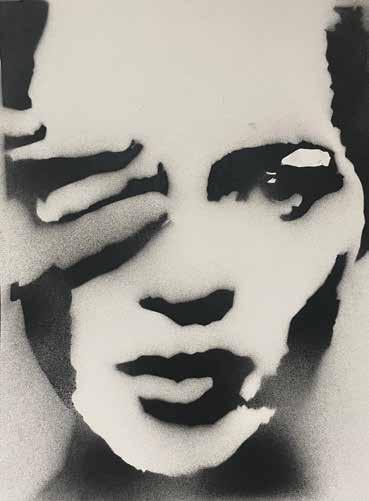
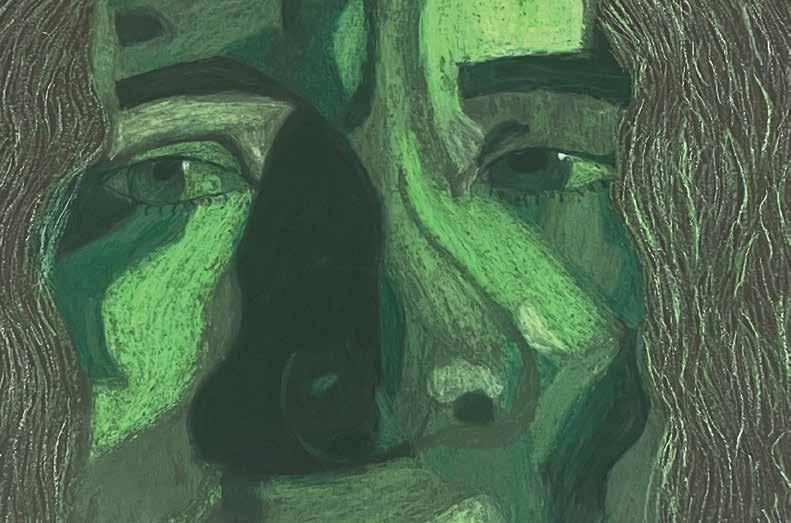 13 Kate Moss by Claire Hudson ’25
14 Portrait in Oil Pastel by Nina Hudson ’25
13 Kate Moss by Claire Hudson ’25
14 Portrait in Oil Pastel by Nina Hudson ’25

There are thousands of reasons why I love jeopardy. I love the satisfaction I get when I answer the questions right. I love the excitement of waiting for the categories to see if I know any of them well. I even love the notorious and catchy theme music that plays during final jeopardy. It is a great exercise for the brain, and makes me feel productive when I watch. Nonetheless, you may still be wondering why a sixteen year old girl finds so much excitement in an academic quiz game show.
If you do not know how the game Jeopardy works, let me explain it to you. On a big screen there are six rows of categories that range from academics to pop culture, and include everything in between. Underneath each category there are six columns with different even dollar amounts from $200 up to $1000. Each amount is one clue and the more valuable the clue, the more difficult the question is. There are three players each with a buzzer in hand. The game show host, which is now Ken Jennings, (rest in peace Alex Trebek) then reads a clue, and the contestant has to answer in a question format.
To me, the structure of the game show is pure perfection. It is another reason why I love to watch so much. The simplicity of the game is what allowed me to become so invested at a young age. It isn’t too hard to play, but at the same time there’s still a challenge. There is diversity within each category, where some categories are even appealing to the younger generation, for example one category might be about Harry Potter.
What really got me into Jeopardy was my dad, who watches it almost daily. When I was younger I would watch him watch the show, but I wasn’t that interested because I was so little and I couldn’t understand any of the categories. But starting two years ago, if I was downstairs and my dad was watching, I would jump in and answer the questions that I could. My dad would also answer them as well, and I was fascinated by how many questions he got right. When I started to answer some correctly, I saw how proud my dad was and how happy he was that I was interested in something that he was.
The reason why I love Jeopardy is not just because I like to see how many questions I get right or because the clue is asking about the Goblet of Fire. The real reason why I love jeopardy so much is because it is a time designated for me and my dad to bond. You could say Jeopardy is “our thing,” which we do say. From 7:30 to 8:00 PM, my dad and I know we cannot make other plans. Every Monday through Friday, at around 7:28, my dad will text me “Jeopardy is on…” or “Jeopardy if you want to take a break…” because I am normally doing homework all day before, and he knows how stressed I get. Jeopardy means more than a game show. It means comfort. It means a break from my work, where I can focus on spending time with my dad and answering meaningless questions. I’m not stressed when watching, and I’m not worried about my homework that I was doing before. All that comes to my mind when I think of Jeopardy is my dad and our extremely goofy relationship. Reader, I wish you knew my dad like I do. He is hilarious, in a dad type of way. I know I can count on watching Jeopardy with him to brighten my day. As soon as that
notification pops up on my phone, I quickly run down the stairs to the living room and hop on the couch, either my dad sitting next to me or in the chair next to me. We both make sure to turn the remote on high volume, and never forget to shush my mom who is always speaking when we are trying to watch. Then, as the clock hits 7:30, we listen to the categories. After Jennings lists a category that I know about, like European history or pop culture references, me and my dad simultaneously turn our heads towards each other, let out a little “Ooooo” and widen our eyes. This always makes us laugh, especially when there are more than two good categories so we rapidly repeat “Ooooo” and get excited for what we know will be a good round.
My dad and I are extremely similar, and I like to say I get my humorous personality from him. I sometimes cringe at my sarcasm when I realize I’ve said something my dad would say. But secretly, I love it. I love how our personalities match each other and how we have the same sense of humor. One of my favorite parts of watching Jeopardy with my dad is judging the contestants when we first see them on the screen. Sometimes, if we see a player with weird vibes, we give each other the side eye, and widen our eyes once again. Right off the bat, we say something like “I hope they lose,” or “They are annoying.” It makes watching Jeopardy more fun when we insult the players. If I were to do this with my mom, she would probably say something like, “Don’t say that, it’s rude” but my dad understands it’s all a joke.
My dad and I also bond over our intensity while playing. We both get extremely into the game or “in the zone.” My mom is normally watching with us, but in reality she is online shopping and actually isn’t listening to anything. Sometimes, she will chime in and ask a stupid question while a category or clue is being said, and my dad and I get so frustrated. We even make her leave the room sometimes. She doesn’t understand our love for Jeopardy or why we get so intense, no one does. That’s why it’s so special to me, every aspect is unique to my relationship with my dad. If someone asked me to summarize our relationship, I would just tell them to watch us watch Jeopardy.
Reader, I hope you understand why I love watching Jeopardy so much. It is not because of the show, but how the show has made my relationship with my dad more special. I know for a fact that my dad and I get closer after each episode. Watching a show with someone close to you brings countless opportunities for spending more time together and connecting with one another. It allows for endless conversation and jokes to be made. I can already think of hundreds of wacky conversations my dad and I have about our show; like how we want to pitch a father-daughter special where the father goes for regular jeopardy, the daughter goes for double jeopardy, and then they both come out for final jeopardy. Without Jeopardy, I couldn’t imagine what my connection with my dad would be like. So next time you want to spend some quality time with your parents, try turning on the TV. You never know what could happen.

skylines and apartments people sit alone in glass boxes tired heads lying asleep at their desks hardly the time to get a real night's rest
the times are changing I know, your waiting the busy daylight is slowly fading
embracing the cold constellations of old the ending of their story still waiting to be told
JULIA BILGER
Chorus: peace it will be ok regretted mistakes will fade away what you came for is here to stay
Verse 2: we could replenish this slow reality once took for granted let our minds run free
the times are changing I know, your waiting the busy daylight is slowly fading
embracing the cold constellations of old the ending of their story still waiting to be told
Bridge: id trade the skyline for the horizon each time up before daybreak before the sunshine I’m gonna try this time to make it last
Chrous: peace it will be ok regretted mistakes will fade away what you came for is here to stay
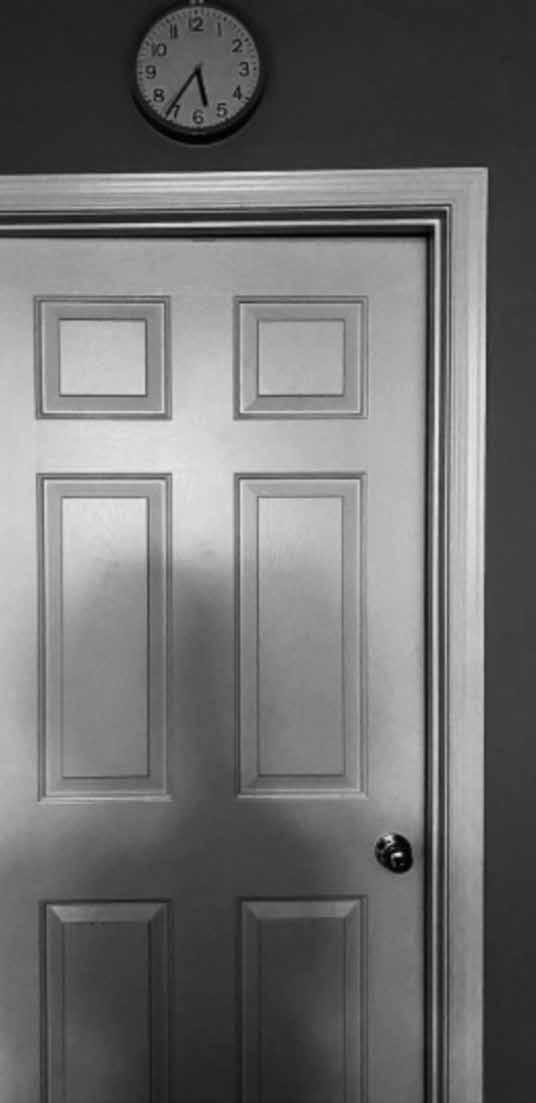
Aubrey, Cal, and Leo Mitchell had a knack for trouble. In their respective seventeen, sixteen, and thirteen years, all three siblings had ended up in the principal’s office a combined thirty-five times. None of them were necessarily bad children, but a combination of unfortunate events and a failing inner-city school system had left the Mitchells trapped in a state of vexation and disorder. Now, after a solid eleven and a half years of struggle, Aubrey was escaping the trapping of her childhood for the freedom of college on the other side of the country. Funded with a full swimming scholarship and motivated by an intense desire to escape, the day had finally come.
Aubrey. Brown hair, green eyes, metal-rimmed glasses that have long since needed replacing, seventeen years old, and a need to get OUT. Stepping over piles of books, clothes, and other random things that had accumulated over the years, Aubrey crossed the entirety of the bedroom she shared with her two brothers in approximately five small strides and entered the hallway. Number 207 was 800 square feet, had two bedrooms and was home to the four Mitchells and their small, skittish cat, Chip. Located in a small building in Washington Heights NYC, Number 207’s five windows looked out onto a small park, scattered with mostly dead trees and a few elderly couples out for a morning walk. The Mitchells had lived in 207 for around four years, yet beat-up brown cardboard boxes were still full of old family pictures and childhood artwork yet to be hung up. Shimmying past one of the boxes, Aubrey moved down the narrow hallway and into the main area of the apartment. One side of the big open room was a kitchen, with a patchwork of different styles of appliances that constantly seemed to be breaking down, and a small, square dining table surrounded by four different chairs. The other side was the living room: two old armchairs that had been purchased from a thrift store, a green couch that the Mitchells had owned for nearly thirty years, and a coffee table from IKEA. One wall was lined with bookshelves that had been full for quite some time, leaving the contents spilling all over the floor.
“Almost done packing yet, Bre?” Mrs. Mitchell called from the kitchen table, not even looking up from her laptop.
“Eh. I’ve still got to run down the street to do my laundry,” Aubrey replied, pulling on her battered old converse, “Which, before you ask, I’m going to do now.”
“Ok, Bre. Hopefully, they call in a guy soon to fix the machine downstairs. It’s getting awfully annoying tugging everything down the street and back.”
Suddenly, a streak of fur flew down the hall, landing not so gracefully on the coffee table, narrowly missing a cold cup of tea that had been sitting there for far too long. “Oh dear god.” Mrs. Mitchell exclaimed, putting her head to her chest. “That cat is going to be the death of me. I swear it.”
“Oh c’mon, Mom,” Leo said, emerging from the bedroom down the hall. “He’s just having some fun. Wait, where are you going?”
Aubrey was halfway out the door, with the laundry bag slung over her shoulder like a teenage Santa Claus.
“Laundry. No, you can’t come,” she said, pulling the door shut to block out her brother’s protests about how he never got to do anything
Washington Heights was a neighborhood in upper Manhattan known for its vibrant culture, affordable housing, and being the inspiration behind the hit broadway musical In the Heights All the shops and buildings looked like they were trapped in another time. However, Aubrey was tired of the area. Seventeen years of the same street would do that to a person. Strolling along the old, cracked sidewalks, with her laundry bag over her shoulder and her nearly decade-old headphones blasting music in her ears, she surveyed the street: lined with trees and storefronts, full of people going about their lives, chatting in different languages, standing underneath the colorful awnings above the doors. It should have been a sentimental moment for Aubrey. After all, she was leaving for college
just that afternoon, but she felt nothing but excitement to leave the street, the neighborhood, and the city behind.
Crossing the street, Aubrey had a clear view of Fairway Suites. A tall, brick building with a grand facade and neat row of carefully trimmed bushes in front. She remembers playing on the sidewalk outside with her brothers, crossing the lobby to the elevator, and waving to the neighbors in the hallways. The Mitchells had moved from Fairway Suites four years prior, after struggling to pay rent on the larger apartment. Aubrey remembers the days when she had her own room, playing on the sunbathed living room floor, chasing her dad around in circles until they fell, breathless, on the carpet.
Her dad. Aubrey tried not to think of him. Jeremey Mitchell had worked at the NYC fire department for fifteen years. When Aubrey was eleven years old, he was called out late at night. She remembered sitting awake all night and into the early hours of the morning waiting for him. But he never came back. Later, they learned that he had gone back into the building to save someone but the fire consumed him. Aubrey had been so mad at him. Didn’t he know that he had a family at home? Three kids? A cat? She resented him and the way he had to be so selfless. The laundromat nearest to 207 was rundown, dirty, and smelled vaguely of mushrooms. It had been run by the same old lady, who everyone just knew as Auntie, for almost sixty years. Aubrey passed by the chatting neighbors, trying to avoid stepping on someone’s small child.
Auntie’s machine only cost about a quarter to run, as they had the entire time the place had been open. How the woman stayed in business was a mystery. Aubrey inserted her coin, kicked the door closed, and headed out the door, avoiding eye contact with everyone. The bell above the door jingled as she pushed her way out onto the streets. ****
Exactly six years, 5 weeks, and 4 days. July 15th, 2016 was the last time Aubrey had seen her dad. Earlier that day, he had taken his three kids out to lunch at Colombo’s Family Pizza Parlor.
“We’ll have a 17-inch pizza with just cheese,” she remembered him saying to the server. “Just cheese?”
“Just cheese.”
Aubrey stood outside Colombo’s now, six years, 5 weeks, and 4 days later, staring at the door and the sign on it: Closed due to lack of funds. We apologize for any inconvenience. The restaurant had closed just about four years ago, around the time the Mitchells moved from Fairway Suites to number 207, just down the street, and nobody had bought the building. It was like the world was doing everything in its power to help Aubrey remember him. Having to walk past the empty Colombo’s every day, and look up into the windows of Fairway Suites. All the memories she had with him. But it was hard to move on when everything was a constant reminder of the way things were. ****
Her bags were packed, her things had been loaded into cardboard boxes, and her corner of the room was blank, only the shadow of herself remaining. Number 207 had never felt like home. Aubrey had never felt like she belonged within its walls. It was simply a stop on the train of her life.
Mrs. Mitchell knocked on the door.
“The taxi is waiting outside if you’re ready.”
Aubrey stood up from her bed and slung her backpack over her shoulder, looking around the room one more time.
“I’m ready,” she said, lifting a couple of boxes from the floor.
Her mother, picking up the remaining bags, followed Aubrey out of the room, down the steps of the building to the lobby, and out onto the sidewalk. Mrs. Mitchell loaded the trunk and climbed into the backseat next to her daughter, and the taxi sped off down the street. Away from Number 207, away from Auntie’s, Colombo’s, and Fairway Suites. Away from the way things were.



 17 Who Are You When No One Is Watching by Alexa Christopherson ’23
18 Water Wings by Natalie Crowley ’23
17 Who Are You When No One Is Watching by Alexa Christopherson ’23
18 Water Wings by Natalie Crowley ’23
If you find yourself with awkward free time, pick up a book.
Sometimes it feels like you have to be productive all day. From sunup to sundown, it seems if you are not doing something extremely useful, you are wasting time. School, homework, sports, dance, cleaning: I keep myself busy.
By the end of the day though, after everything that needs to be done is done, I often find a little bit of free time. Too early to go to bed, but not feeling the need to do another productive thing, I struggle to find the best way that I can spend my time in a meaningful way. It is not that my days need to be planned and perfect, but after spending time doing things that I don’t enjoy or things that feel completely empty, like surfing the internet for an hour or watching the night time news, I feel kind of bleh.
Finishing a book, reading it from cover to cover, feels like a struggle sometimes. Finding the time to read feels impossible. The only people who finish books, it seems, are those who stay awake into the earliest hours of dawn: an unreasonable standard. Hence, reading becomes too overwhelming to be approached.
Like most things though, doing a little bit at a time is the way to accomplish a big goal. Reading for a half of an hour each day will lead to finishing books; consistency will lead to finishing big books.
Reading is enjoyable too.
Every book has its own purpose. Complex books make the reader more keen to understand themselves or the world around them; simple books can help the reader take their mind off of the world. Nonfiction illuminates the real stories of our real world; fiction paints a world slightly different, making the reader imagine an alternate reality.
Reading in my free time feels satisfying and delightful. It engages my brain enough to enjoy, and there is no stress. Unlike reading in an academic productive setting, there is no test, no requirement to do a lot of work. There is no need to annotate profusely as no essay must be written. All that must be done is read and pay enough attention to comprehend.
I discovered the power of reading for about an hour at night when I picked up the book Pioneers by David McCullough. Each night, I learned about the story of Ohio, from the Northwest Ordinance and the first pioneers, the first American governments in the Ohio territory, and the importance of the Ohio River and Lake Erie. Not only did reading give me the chance to spend my time more meaningfully and in a more fulfilling way, but I began to become more grateful for local landmarks. After I read the book, I was excited to recommend it to my fellow Ohioans!
After this I had the pleasure of reading Jane Austen’s Pride and Prejudice, a complex text about first impressions and how people change their mind. Each night, with all of the practical schoolwork of the day done, I began to fall asleep and set aside the worries of the day by captivating my brain with the complicated world of early nineteenth century England. I remember clearly reading the scene where Elizabeth Bennet reads the passionate letter from Mr. Darcy. Reading intently, turning page after page, as I imagined Elizabeth must have done when she too received the letter, I was amazed by the persuasiveness of the letter and the realization of the truths that it contained. I too admired the once detested Darcy. I too disdained the pathetic wicked Wickham. It made me think about all of the first impressions that I make in my own life and how people as stubborn as Elizabeth can change their minds. I finished books I enjoyed. I learned random bits of information that I could share with others. I found I could recommend books to people who would enjoy them. Driving down the highway one day, I saw an exit that led to Marietta, Ohio. Before, I had suspected it just to be another Ohio town, but now I knew it to be the location of the first settlement in the state of Ohio. I began to see just how correct Jane Austen was about many phenomenons in human nature. The pride many people have makes it difficult to admit when they are wrong, but the prejudices we take up make us wrong very often- a very keen observation from Austen. Sometimes, I even feel the need to call things out as proof of Austen’s correctness. It made me enthusiastic to learn again.
So, grab a book; finish a book; grab another one. Keep learning, a little bit at a time.
I stepped off the train, blinking in the afternoon sun, and was home for the first time in years. Of course, I had visited for holidays and weekends, but this time it was different. I was back for real this time, or at least until things were better. I left home six years ago and finally felt free from my old life. I got caught up in my bustling world miles away from my old town, and I realized I missed being back at my real home, the place where it all started.
The fresh air of the lake swirled in the breeze and I took a deep breath, releasing a weight I didn’t realize I was carrying. I wandered down the pier, not wanting to get home too soon because that meant facing reality. I walked past the ice cream stand, the ferry stop, and the old lighthouse, and with each, I remembered my old life. One time my friend and I walked three miles from our block to the ice cream shop even though we had no money, just because we were bored, taking the long way through the park so I could finish the story I was telling him. I remembered the hours and hours I spent on the pier with dad, learning how to tie knots and haul the boats ashore. That night when I waited and waited, and when he finally returned the stars were already twinkling to life across the sky. My heart pounding when he carried me up the creaky lighthouse stairs, showing me the best way to spot the constellations,reassuring me that I wouldn’t fall and that he would always protect me.

Except for one day, he never did come home. I remember it like it was yesterday, but it feels like a dream. He went out to deliver the mail that afternoon like he always did, picking up a few friends for company. He took them down the shore to the little pub they went to every Thursday because it was $1 burger day and the old man that worked there loved their company.
That old man later told us that Dad had left at dusk, right when the sky began to darken and the streetlights came on, blurred by the foggy rain. He always noticed those little details, and I realized he was similar to my dad in that way. No one knows what happened after that, but the lake that Dad
loved so much proved to be disloyal, and the sky we stared into together stole him away from me forever.
It was never the same at home after he died. That’s why I ran so far once I had the chance. I couldn’t bear to look at the lake every day and think my dad was out there, couldn’t imagine staring at the crumbling white brick of our house each morning, knowing that he would never be back to retouch the paint or clear the gutters, clogged with leaves from the old oak out front. My sister ran from home too, off to Boston to make her own life. My brother was still in high school, and I hadn’t heard from him much since I left. We were always close as kids, but all of us were busy with our own things and I have been caught up in my own little world, pushing away everything that reminded me of home.
I was jolted back to reality as I reached the end of the pier, and I dragged myself down the street, turning the last corner to the bus stop. I still remembered the bus schedule all these years later and had five minutes until the evening bus arrived. I wondered what I would even say when I got home, stepping inside the house I grew up in, in the town I used to love but convinced myself to resent. The bus pulled up, and I was lost in thought as we made our way through the town, crawling to a stop at the end of my childhood block. That night was all a blur, I went inside and said hello to everyone, dinner was served and we talked and shared stories late into the night. Curled up in the big armchair in the corner, I was wrapped in the comforting embrace of the house and the warmth of the family I hadn’t seen in ages, settling back into a life I used to know.
The sun beaming through the slats of the shades woke me up in the morning, and I was reminded of the feeling you get on a snow day as a kid, a feeling I hadn’t known for a long time. The stairs creaked under someone’s quiet steps, and I remembered how much there was to do. Mom asked me to keep track of the family post service while I was here, and I had to go collect and deliver the mail along the coast. I was glad for the chance to go out on the lake; I had always loved floating out there with
Dad and meeting all the friends he ran into on his deliveries. On the way to the pier, I stopped for some hot tea at the local cafe, wishing I could stay and soak up the morning sun or wander through the town, but I had to get to work.
The post office on the water was a second home to me; I spent so much time there with Dad and his coworkers, sorting and sending the mail where it needed to go. The office was right in the center of town, so there was always a quiet bustle of people passing through, dropping things off, or just stopping to say hello. My favorite part of helping with the mail was going out on the delivery boat, and I remember the first time I got to go with Dad like it was yesterday. I had begged and begged to go with him on one of his morning deliveries, before the sun came up and when the lake was quiet. He finally let me come one late summer day, and I made sure to remember everything he taught me, everything I could possibly help with. He taught me how to rig up the boat, tie all the knots, read the delivery labels, and all the little parts of his job he loved so much. I thought all those memories were lost when I left, but it all came back to me that morning I was home. Turns out I held all that knowledge next to my memories of him, woven in with my love for my home.
It was like riding a bike, once you do it once, you always remember how to drive the boat. We could have upgraded from our old barge, but Dad always loved how easy the little boat was to navigate. I climbed on the barge for the first time in 6 years and stumbled when a wave rocked it against the pier, but quickly regained my footing. My legs remembered the soft rocking of the easily stepped to the front of the boat, sinking into the familiar comfort of being on the lake. The morning sun was just climbing above the trees in the distance, and staring out at my old town, I was home.
I sank into the worn chair my dad used to sit in every day and took a deep breath for the first time in forever, and I realized that all my time away from home brought me farther and farther from who I wanted to be. I ran because I couldn’t stay here, trapped in a place that reminded me of better times, and I thought leaving my home would leave those memories behind. I ran so far from the place I used to call home, the path of escape led me right back to where I started, back to figure out who I was and who I wanted to become. Finally,I had the chance to reclaim the town I used to call home, explore all the places I used to belong, and remember the kid I used to be. I gazed out the front of the boat, and woven in the branches of the trees, the rail of the old lighthouse, and the gentle rock of the waves, I caught a glimpse of my heart and soul, dancing in the sun.
 NORA NATHAN ’26
NORA NATHAN ’26
I dreamt of colors last night
There is no portrait without Ballerina
There are pink tights and leotards
There are tutus
And there are pointe shoes
There is no portrait without Ballerina
There is three-years old
There is a baby ballerina
And there is a lifetime of slippers
I am a blank canvas without Ballerina I am nothing.
As Ballerina I am athlete, I am artist
My scars are Ballerina.
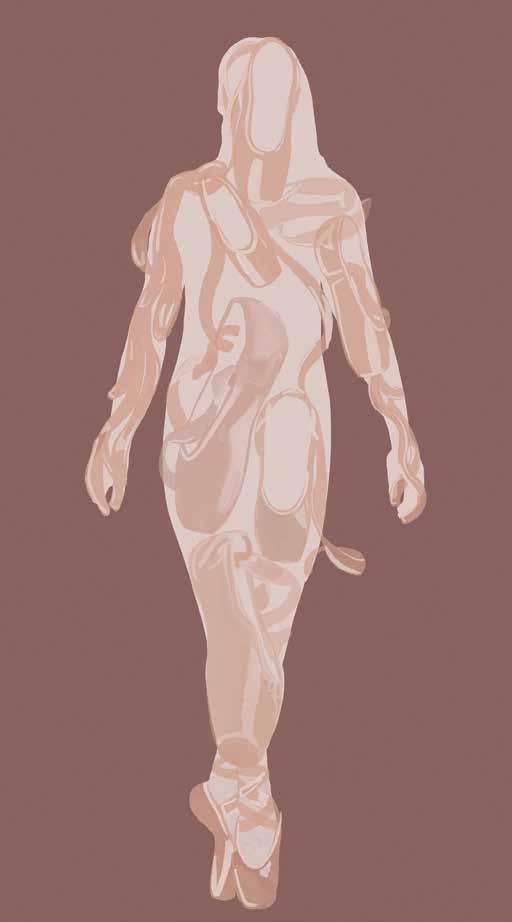
They are failure they are injury
They are eating disorder
They are shame
Ballerina is blood inside my pointe shoes become blood inside my veins
I am only Ballerina.
Even god knows I sold my soul to Ballerina a long, long time ago.
It’s both the shattered glass and the glue. Take it away and the wreckage will collapse.
A self-portrait without Ballerina is no portrait at all.
Ballerina is a tutu whose hooks dig so deeply they rip the skin from my back. But ballerina is the dream that three-year-old me dreamt.
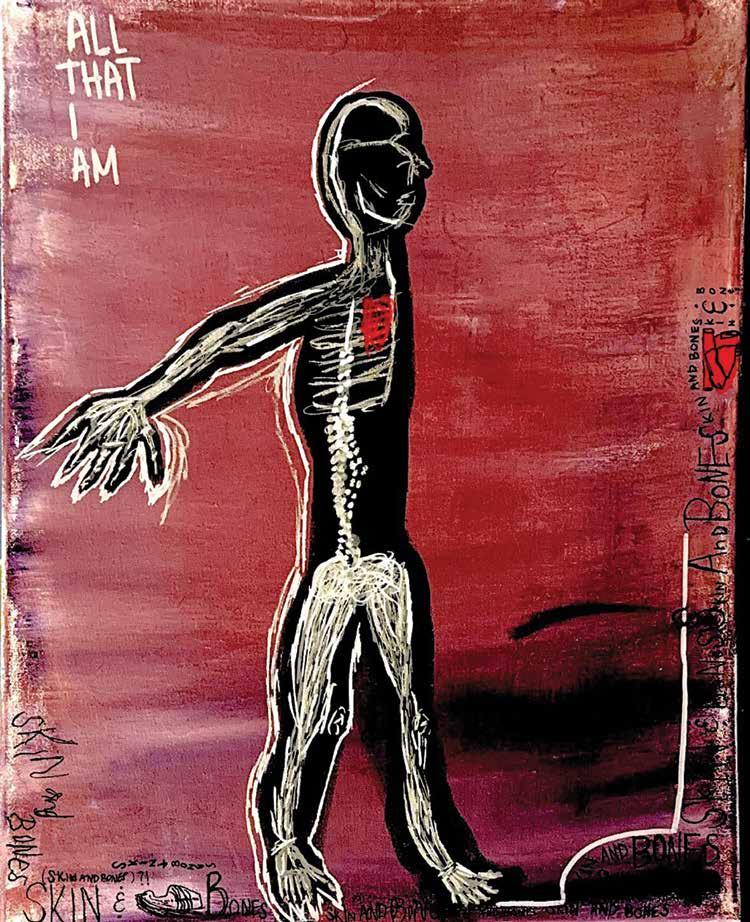
Last year, around the end of the year, the editors of this magazine were looking for material. Frantically, I put together an article titled “Why You Should Care About Latin.” It was not very good, likely my weakest submission of the year. Unfortunately, it was published. Far too brief to give justice to the language, and far too rushed to have thoughtful conclusions, it was not good. This year, I am setting out to make a better version of that article.
Oftentimes, Latin is seen as ‘the dead language,’ a complete waste of time. What does someone even do with a Latin education? Scholars have already translated great poems and epics into English. No one speaks Latin. No one writes in Latin. It seems that there is really no use in knowing Latin.
You may not think you are a language person: you see yourself as more of a ‘science person.’ Science needs language; in fact, Science necessitates a sort of universal language. Latin happens to have become the basis for a lot of modern scientific terminology. You could simply memorize every term, without regard for its root, and that would be fine. You also could look at the Latin word and understand why it was put there, which would give meaning to the study and likely lead to a better memorization. Additionally, names are often met with stories. Understanding a name gives unique insight into the mind of the scientist who named the phenomenon.
Historically, proofs and other discoveries were written by intellectuals in Latin. It created a sense of exclusivity and academia to the discoveries of the age. The only people who knew Latin were the educated elite. German for a while was the science language. Today, it is English. Yet, in order to appreciate the great scientific literature of the past in its original form, Latin is the key. Although taking the time to read something in the original language may seem unproductive when translations are available, I think that seeing original texts gives an important look into the writer’s diction and intention that translators may struggle to interpret. Maybe you appreciate languages, but struggle to see how learning Latin would have value. It is not spoken anymore, yet, knowledge of Latin aids profoundly in especially the study of all of the romance languages, and lends itself to a lot of other languages due to the wide-reaching influence of the Ancient Roman Empire. Also, if you appreciate English grammar, or if you know you need to improve your English grammar, Latin will help you profoundly. Whom is not a fancy form of who: one describes a direct object, indirect object, or an object of a preposition, the other describes a subject.
Learning Latin is comparable to reading literature. Although it seems pointless: too specific to apply to modern times, or esoteric for no reason, it reflects truths of the human condition. It can be artistic and philosophical. In Latin sentence order is not set the way it is in English. Sometimes the subject is the last word to appear in a sentence; sometimes it is the first. This flexibility lends to intriguing figures of
GRACE GILSON ’24speech that are not as easily employable in English. Chiasmus is the term for word order of the form ABBA, with a fantastic use of this figure of speech being found in Ovid’s metamorphoses: frightened Thisbe in a scary cave, where scary and cave our separate and frightened Thisbe is inside. Latin has the power to build imagery into its sentence order. This design is lost in English. Learning Latin is a way to learn to appreciate art.
One of the most influential pieces in the Western Canon is Vergil’s Aeneid. Even after the collapse of the Roman Empire, the poem’s twelve books have stood the test of time. They survived the Christian World, even though it was technically pagan poetry. Learning Latin provides the opportunity to understand this poem in its native language, a valuable perspective on a central element of the evolution of literature.
For this article, I interviewed Mr. Kollin, the high school Latin and Greek teacher at HB. He is passionate about teaching students about the classics and introducing them to the study of Latin. I figured a Latin educator and scholar would give good insight into the importance of the language.
A big barrier to studying Latin is beginning. At a school that offers so many different languages, choosing to study “the dead one” is difficult.
So, “What made you interested in the study of Latin and the Classics?”
“I chose to take Latin in high school for a very simple reason: my parents made me. But then I discovered that translating Latin sentences was kind of like doing a puzzle, in a challenging but interesting way. As I got to the higher levels of Latin in high school and then college, I also liked that studying Latin literature was very similar to studying English literature... exploring themes, figures of speech, historical background, etc.”
It is notable that it took encouragement to begin studying the language. I have to wonder how common it is that people avoid looking at Latin, thinking there is a lack of interest, when, in fact, they don’t realize they would enjoy the subject matter! Preconceived notions about certain areas seem to keep people from studying them. If you are hesitant, give it a chance! You could find something you end up liking!
So, “What do you think interests your students in the study of Latin?”
“Lots of Latin students like exploring the many connections between Latin roots and English derivatives (words that come to English from Latin). It almost feels like a superpower to read unfamiliar English words and figure them out from Latin vocab, and also to look at familiar English words in a new light when you know their Latin origins. Many students also like Latin because we spend a lot of time learning about the culture, history, and mythology of the ancient Romans, which is an endlessly fascinating world.”
It is an opportunity to look at the past with fresh learning. Suddenly, English words become more clear, and their double meanings become apparent. If you appreciate the complexity of language, Latin is an excellent way to give it meaning. If you wish to learn about the Ancient Roman Empire, which influenced a lot of international developments whose effects we still see today, studying the classics is an amazing way to do so.
There is also a lot of practicality to Latin, which I have mentioned above. Even though it is not quite as applicable as, say, learning arithmetic, there is value which is present in almost all areas of study.
“How do you think Latin helps with other school subjects?”
“It can be very helpful to have a Latin scholar in any classroom, no matter what subject you’re studying. In English class, tons of vocab words are derived from Latin, and many works of literature refer to Greek and Roman mythology. Math and Science use many abbreviations, terms, Greek letters, etc. that come straight from the Classics. Latin students are also experts on the ancient Romans, so there is a strong connection in History classes as well.”
The study of Latin is present in every subject listed above, but I think that, most prominently, it helps with the study of other anecdotes. Most recently, I was able to give a (very) rough translation of a peer’s Spanish homework!
“Some people call Latin a ‘dead’ language since it isn’t used conversationally, but anyone speaking Spanish, French, Italian, or another Romance language is basically using a form of Latin that transformed over time, so it actually is very alive in that sense.” I’ll end this article with some wisdom from Mr. Kollin:
“Whether you realize it or not, you are surrounded by the influence of Latin and the ancient Romans on a daily basis, so why not spend some time learning a little Latin...or at least hanging out with a Latin student?!”
Works Cited Kleinberg, Aviad M. (2008). Flesh Made Word: Saints’ Stories and the Western Imagination. Harvard UP. p. 68. ISBN 978-0-674-02647-6.
23 The Twin Mushrooms by Cole Urban ’24
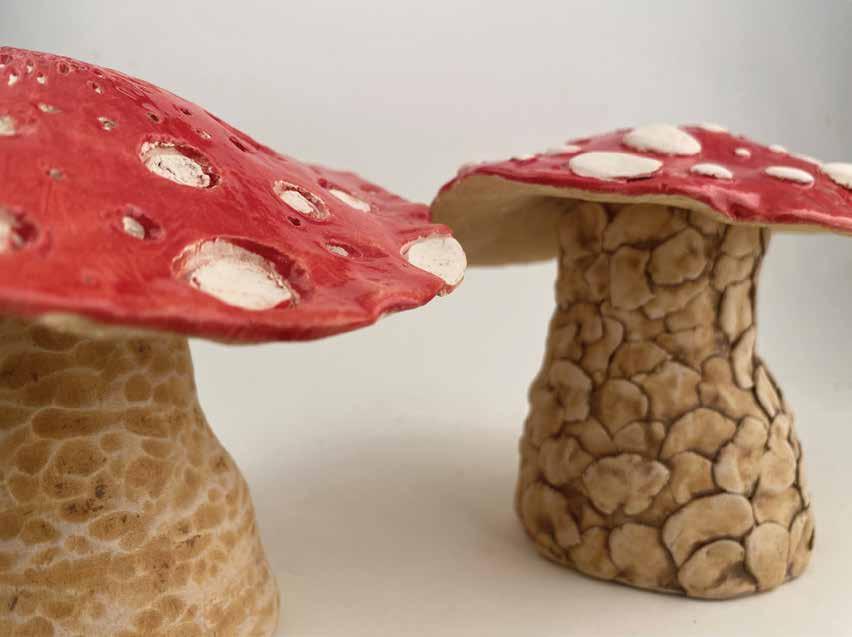

Intro:

You noticed me sitting over there, that time
Tulips were coming into full bloom
You said sweet nothings into my ears
And I believed them
Runnin' down the boardwalk, fingers intertwined

Unafraid of drowning, blue tides, deep dive
Bubbles in the water, flutters in our chest
Each grain of sand is a star in our sky~, sky~
Pre-chorus
Let the waves crash over us, cool our flaming hearts
The ocean can’t even pull us apart, apart~
Fall
Leaves brown, warmth fades, our memories turn cold
I thought, our love would burn forever
Your words stick with me immortally
And I believed them
Persephone’s blessings, leave us
Your smile is left here, in my mind, my mind
It can’t beat you here, here with me
Running down the boardwalk, your smiles, your lies~ lies~
Pre-chorus
What happened to our flaming hearts, our~ love
It flew away like doves ~, like doves
Bridge:
Falling into Hades's hands for you
Looking for an asteroid
To wish on for a better life together
I’ve already died, when you left me that day
I wish you could see
What the world is to me without you
These bleak grays bleed the sky
And only you can bring color back to my life
Outro
Once again, Tulips are coming into full bloom
Your smile is left in my mind, my mind
Our short journey together leaves a scar
Forever ingrained in my heart
I’ll miss you forever, even as I know
Of your lies and empty promises.

I’ve got this rabbit called guilt that bites my ankles while I’m trying to sleep.
I tell it to go away but it lives where I live.
It’s raining really hard. As much as it did when I was 13 and sick and it was September, and as much as it did when I was 16 and hopeful and it was May.
My dog died and it takes something – I am swallowing my words – not to open the garage door and call out for her. The house is quiet and dark – not now, because it’s raining – and my mother and I do not talk about it but we take up the spaces she has left behind.
The left side of the couch and that spot in the living room and sometimes I stand for a while in the emptiness of the front doorway because there is no longer a great lump of fur sprawled out that I must step over to get to the mailbox.
A year ago I collapsed in the middle of the kitchen next to her and she stood on already aging knees, wet nose pressed against my weeping head, until I could stand up on my own again.
Often I mistake kindness for pity and pity for ignorance, and perhaps my fatal flaw is that I love deeply and painfully, and everyone’s faces are plastered on my bedroom walls because at the time – last March – my love was deep and painful and the house too loud but filled with none of the voices I wanted to hear.
I love anxiously and require instruction and one year ago I didn’t sleep for two weeks.
I found a half-scribbled letter in my dad’s bedroom that read: “Yesterday I thought I was dying, but it was just my ribs” [bruising].
This year the world ended and half the time I am convinced that the men who carry no responsibility to be in my life, but do so anyways, hate me for the parts of myself I cannot change. Maybe it’s me that does that.
There is a picture on the wall behind my desk – one of the faces – of the boy who sent a picture of buckwheat in response to my frantic demands for proof of life and who defied his mother to be my homecoming date and who I thought was dead, one year ago. He lives in Warsaw now.
Save for the rabbit called guilt and a guinea pig who was more wild than my own (whose life ended for no particular reason on a random October morning – I think he did it out of spite), my animals died in the spring.
My ancient cat in April, but my dog on a 65-degree Valentine’s Day – a fluke in the weather as much as it was a fluke in biology; a tumor grown where it shouldn’t – harsh and ugly and I discovered that I hate silence as much as I hate Kafka.
When my dog died my mother dug her nails into my shoulder blades and screamed into her pillow and cried and I thought that she didn’t know how to grieve. She does.
I sink into my bed and swallow my words and sit on the left side of the couch when it’s raining and no one is home.
The world keeps spinning. I grind my teeth less. It will be ok.

As defined by Oxford Languages, the American Dream is “the ideal by which equality of opportunity is available to any American, allowing the highest aspirations and goals to be achieved.” Achieving the American Dream requires drive and desire, and above all else, determination. However, there is an ongoing debate regarding whether or not everyone can truly achieve the goal of prosperity in America. In her play A Raisin in the Sun, Lorraine Hansberry illustrates through the Youngers the countless difficulties African Americans tackle in their journey to advancement. In a 1961 episode of Playwright at Work featuring Hansberry, she claims that “All of us are what our circumstances allow us to be,” implying that one’s wealth and race determine, and for African Americans limit, one’s ability to achieve the American Dream. While Hansberry does illustrate the array of difficulties and struggles African Americans face in achieving progress and prosperity, in doing so, she also demonstrates their ability to alter their circumstances and transcend these boundaries through hard work and determination.
In the mid-20th century, society viewed African Americans as inferior to whites, placing them at a disadvantage in the economic sphere, and thus hindering their ability to ascend in society. Many African Americans were given inferior jobs which limited their future opportunities to succeed. In A Raisin in the Sun, Walter expresses his dissatisfaction with his job as a chauffeur. Walter exclaims to his mother, “Mama, a job? I open and close car doors all day long. I drive a man around in his limousine…Mama, that ain’t no kind of job…that ain’t nothing at all” (Hansberry 73). Walter’s snide remark that his job is “nothing at all” indicates his disappointment in himself and his circumstances. His complaints about his job mirror his belief that he is not living up to his full potential. Walter’s job serves as a reflection of himself, and if his job is nothing, then he, too, is nothing. Walter’s job leaves him feeling unfulfilled, which is amplified by the fact that his job does not provide him with the means, such as capital and opportunity, to achieve his dreams. His job is a constant reminder of his failure and inability to succeed, which he expresses through his repeated outbursts at his mother. Walter has lofty aspirations of starting a business and creating a better life for himself and his family. However, due to the color of his skin, he is denied opportunities, and therefore cannot achieve his dream. During this time period, race played a critical role in determining job opportunities, which in turn serve as the foundation for a prosperous future. As a result, race largely influenced who could achieve the American Dream.
Race restricts job availability for African Americans which in turn limits their wealth. As a result, African Americans were unjustly handicapped. Their jobs provided inadequate incomes and consequently the lack of wealth necessary to succeed and prosper. Walter insists that money is vital because it creates opportunities: “Money is life” (Hansberry 74). Accumulated wealth provides choices and therefore freedom, a privilege that is a critical aspect of the American Dream. With money, Walter’s dream of starting a business is feasible. Without money, options are limited, and success becomes more difficult to achieve. In addition, money provides security and comfort, which is necessary to pursue more emotional or intellectual needs.
Without sufficient money and therefore freedom, the Youngers must use all of their resources to secure basic needs rather than pursuing their desires. The only way to break free from this entrapment is to obtain money and thereby freedom, which in turn will provide stability, allowing them to focus their attention on their hopes and dreams. Before the inheritance check arrives, the Youngers lack money, prohibiting them from increasing their socioeconomic status. They are stuck in a loop in which “there isn’t any real progress,…there is only one large circle that we march in” (Hansberry 134). Through Beneatha, Hansberry argues that progress and the American Dream are impossible to achieve for African Americans. Families like the Youngers can work hard and do everything right, but will never advance in society because they lack a crucial component mandatory for progress: money. Beneatha explains that each person marches through life with “our own little picture in front of us–our own little mirage that we think is the future” (Hansberry 134). For the different members of the Younger family, that picture contains dreams like owning a home, attending medical school, and starting a business–all things requiring money. Unfortunately, it is as if they are running on a treadmill, working hard and supposedly traveling miles, earning their way in the world, yet advancing no real distance. They can run as fast as they can, or work all that they want, but they still will not advance. Hansberry stresses that African Americans cannot escape the “circle,” and therefore have no opportunity to advance in society or achieve prosperity because they lack the funds, and the ability to gain the funds, necessary to liberate themselves.
Despite the obstacles created by race and socioeconomic status, Hansberry demonstrates the ability of African Americans to push past these barriers and achieve the American Dream. Mama’s husband does not accept his circumstances and lack of wealth, resulting in his impeccable work ethic. He pushes himself beyond his limits, “killing himself” while “working like somebody’s old horse” (Hansberry 129). He comes home “night after night…the red showing in his eyes…[and] the veins moving in his head” (Hansberry 129). He works relentlessly with one goal in mind: bettering his family’s life. He is willing to dehumanize himself, comparing his work to that of an animal, to achieve this goal. He succeeds in his endeavor, earning $10,000, the inheritance that he leaves his family. Now, money is no longer the obstacle, but rather the key to the future. Money possesses the power to grant his family’s wishes. The inheritance check represents Big Walter’s legacy and serves as a symbol of his hard work and determination. Walter sobs, “THAT MONEY IS MADE OUT OF MY FATHER’S FLESH” (Hansberry 128). Walter cries out these words after having lost the majority of his father’s inheritance because the money is more than wealth; it is opportunity. His father worked himself to death, putting his blood, sweat, and tears into his job to provide for his family and improve their life; the money he earns is literally made out of his flesh. The money is not only $10,000, but also 10,000 days of his effort and refusal to surrender. The check, which is an extension of his father, is capable of funding his family’s dreams: medical school, a business, a home. Therefore, Big Walter succeeds in changing his family’s circumstances through his persistence and hard work.
The Youngers prove not only that circumstances can be changed, but also that boundaries can be broken and dreams achieved. Mama uses the inheritance money to achieve her dream of purchasing a house. When Lindner, a white representative from Clybourne Park, proposes that the Youngers refrain from moving into the neighborhood, Walter musters up the courage to announce, “And we have decided to move into our house because my father–my father–he earned it for us brick by brick” (Hansberry 148). Big Walter did back-breaking work to alter his family’s circumstances and as a result provide them with the opportunity to make their dreams come true. Mama desires for so long to own a home, and now, because of her husband’s grit and determination, she does. The Youngers break free from the “circle” in which they are trapped, and take the first step on the “long line” to progress (Hansberry 134). People such as Lindner and Johnson urge them to defer their dreams through threats and acts of jealousy, but Walter refuses to settle, retaining the pride of his father and his family. His father killed himself to give his family a better life, and although it came at the expense of his own life, he achieved his goal. Before Walter loses the majority of the money, there is enough to fund all of their dreams. The Youngers prove that with enough hard work and determination, the American Dream is achievable for African Americans. Asagai emphasizes this notion when he states, “And because we cannot see the end–we also cannot see how it changes” (Hansberry 134). Asagai is an optimist and argues that progress is simply a “long line;” while achieving progress may require a significant amount of time and effort, even more so for African Americans, it is possible. The future is unpredictable, and therefore people are not limited to their current “circumstances” because time allows for those circumstances to change. With discipline and persistence change will occur. This change may not be present in a single lifetime, but it will impact and better the lives of the successors. Progress is a hard-fought battle, but in time and with effort, it is achievable for all.
The Youngers showcase the ways in which African Americans are restricted in achieving the American Dream, but most importantly their ability to

push past these difficulties and advance in society. They are disadvantaged in the economic sphere with regards to occupations and wealth, limiting their ability to prosper. However, despite Hansberry’s intent, it is evident that African Americans can achieve success through hard work and perseverance. Big Walter’s legacy was not constructed on luck; it was earned hour by hour, day by day, with hard work. The Youngers are not merely a single family, but rather a representation of all African Americans. Hansberry states that “in order to create the universal you must pay very great attention to the specific,” implying that a single family’s story holds essential truths about the lives of all African Americans (“Lorraine Hansberry Discusses Her Play”). Hansberry utilizes the Youngers as a model, depicting their difficulties as well as their successes. By default, according to her own goal, Hansberry proves that not only can one African American family succeed, but all African Americans can prosper. It is, however, necessary to keep in mind the sacrifices for such success. Big Walter does not personally achieve the American Dream, for he suffers and endures a grueling life, but his hard work and grit allows his family to experience the American Dream. This means that the Youngers are not merely the exception, but rather the rule, and therefore the possibilities for African Americans are endless if elders are willing to pay the price.
Works Cited
Hansberry, Lorraine, and Robert Nemiroff. A Raisin in the Sun. Vintage Books, 1958.
“Lorraine Hansberry - Playwright at Work.” PBS , Public Broadcasting Service, 30 June 2020, https://www.pbs.org/wnet/americanmasters/watch-archival-interview-of-lorrainehansberry-fresh-off-her-success-from-raisin-in-the-sun/15018/.
“Lorraine Hansberry Discusses Her Play ‘A Raisin in the Sun.’” The WFMT Studs Terkel Radio Archive, 12 May 1959, https://studsterkel.wfmt.com/programs/lorraine-hansberrydiscusses-her-play-raisin-sun.
“Oxford Languages and Google - English.” Oxford Languages, https://languages.oup.com/ google-dictionary-en/.
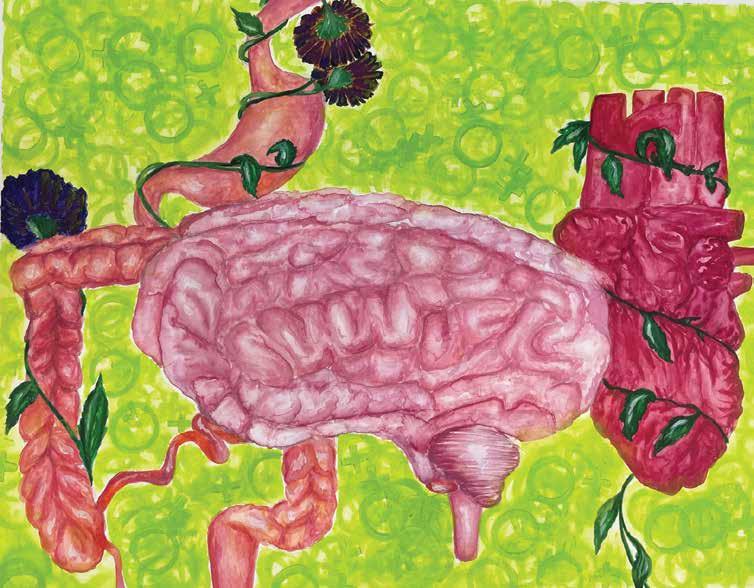

I feel myself forgetting
smile.
